





























It’s hard to believe that another year has already gone by. Despite the various slowdowns experienced since 2020, the world of AV often feels like it’s picking up more pace with each week that passes. I’ve heard countless comments on how the Middle East events business in particular is busier than it’s ever been, which hopefully sets the tone for 2023.
That’s not to say that 2022 passed without challenge. While the dreaded C word is rearing its head less and less, it’s been quickly replaced with disrupted supply chains, a particularly sticky issue in the middle of the year but one that unfortunately shows no signs of abating any time soon. The situation has forced countless rethinks and altered trajectories for both manufacturers and customers alike, resulting in delayed projects or sometimes even completely redesigned product alternatives. There are also murmurings of
But personally, and despite the incredible advances in remote communication we frequently cover in these pages, it’s been the ability to start getting back out and visiting people in-person that’s been particularly refreshing recently, and is something we expect to be able to engage with more fully in 2023.
This brings us to the topic of this year’s calendar, which kicks off in full force with ISE at the end of January. At nearly twice the size of last year’s endeavour, it promises to be a great show. With almost all tradeshows back on in 2023 (plus a few new ones) and many yet to return to their traditional calendar slots, making it to all of them brings its own set of challenges. We as always will be present at ISE and look forward to seeing you there.
Email: sluckhurst@proavl-mea.com
Caroline Moss
Contributing editor cmoss@proavl-mea.com
Karen
Libby Stonell
Digital content editor lstonell@proavl-mea.com





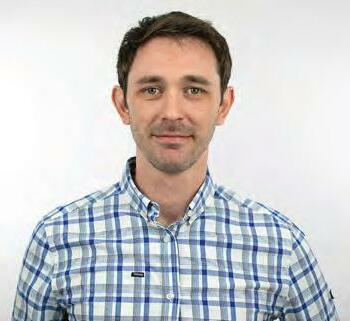
Guangzhou manager T: +86 13609001455 ssu@proavl-mea.com
18
Beijing manager T: +86 10 8652 5184 frank@proaudioasia.com.cn



The Khareef Festival organisers worked with event specialist GT Stagetech to create a multimedia spectacle using Pixera media server systems. Khareef – the Arabic word for autumn – marks the beginning of the monsoon season in the Salalah region of Oman. While the rest of the region is typically dealing with warm weather, Salalah is subject to cooling rainfall and a mist that forms waterfalls and springs in the mountains.
Salalah’s Ministry of Tourism runs the annual Khareef Festival between July and August, which features traditional performances alongside stalls selling Omani handicrafts and traditional food. Although the event could not run in its full capacity due to Covid-19 restrictions, a number of smaller recreational activities and events were held at tourist sites to mark the occasion.
The Ministry of Tourism enlisted the help of GT Stagetech to create a multimedia spectacle that would form a key attraction for the event. Of several designs submitted to the client, it chose GT Stagetech’s giant monolith structure for the display.
The 360° multimedia experience was designed to look like a diamond-shaped monolith, with all angled sides receiving mapped content of colourful patterns and tessellating shapes. The 16-minute show had pre-programmed lighting, lasers and special effects, all synchronised with a SMTPE timecode signal.

GT Stagetech’s managing director, Mohisn Al Hajri, and director of sales and rentals, Croyden Menezes, decided to purchase two AV Stumpfl media servers – Pixera one and Pixera two OCTO – due to their compact size. The
Wellfit gym, said to be the largest indoor health and fitness club in Dubai, offers facilities over 7,000m2 and has been fitted with a Martin Audio sound reinforcement solution. Located in Jumeirah Village Circle (JVC), this latest facility, situated on level 2 of the Circle Mall, features no fewer than 200 of the British manufacturer’s loudspeakers, spanning several different ranges. It is the second sports, health and fitness centre in the UAE opened by operators Arada, following a community pilot in Sharjah last year.
The sound is broadcast through the main activity zones via Martin Audio’s CDD series. These coaxial differential dispersion loudspeakers were installed by local partners, PRO LAB, to a specification by Pulse Middle East, who were responsible for the design and build of the venue. The speakers form part of a full audio, visual, lighting and content management solution provided by the integrators.
PRO LAB has a long history of supplying Martin Audio systems, in particular the CDD. “It was the coverage pattern in particular that drew us to CDD,” said PRO LAB managing director, Rami Haber.

Since a differential dispersion horn has a trapezoidal dispersion pattern in both vertical and horizontal planes, the specified area can be covered with sound more evenly than a system with a conventional, fixed-dispersion type horn. Distributed throughout the vast space are six CDD10 and 50 CDD8, with low frequencies handled by 14 SX210 and four SX212 subwoofers.
In addition, PRO LAB and Pulse have specified Martin Audio Blackline, detailing 20 Blackline X10, 32 X8B, a pair of Blackline X12B and 18 X115B subwoofers. These are situated in the corners of the main studio.
In the ancillary retail and leisure areas, they have added a combination of 15 ACS-55T 5.25-inch passive two-way ceiling speakers,
Pixera one was used as the director/master server and the Pixera two OCTO – with two, four or eight available outputs – was chosen for the display.
Show director, Lalindra Amarasekara, led the team that designed and created the content specifically for the show that ran three times daily, for a month in total: “We didn’t have to switch to the backup once – it’s a system that we know we can deploy with great confidence,” explained Amarasekara. “The 3D environment and visualisation inside the Pixera suite is extremely powerful, giving the programmer the feeling of working in a physical environment. This helps the tech teams to preplan and accurately set up projectors or scenic elements.”
Sapphire Console, audio by JBL, Crown
amplification, Soundcraft consoles and lasers by RTI.
Dubai-based AV consultants and distributor VueAV provided GT Stagetech with the Pixera media servers for this install. “It’s a pleasure to have provided GT Stagetech with the right equipment for the job,” said VueAV associate partner, Matt Reed. “Their knowledge and expertise speak for itself when you see the monolith – it’s extremely impressive.”
“The servers can handle it well when working with large canvases and content; we can deploy these systems with great confidence,” concluded Reed. “The Salalah Municipality said the show has been wellreceived by the audiences and far exceeded
20 ACP-55TB pendant ceiling speakers and 19 ACS 40TS 4-inch ceiling speakers – all part of Martin Audio’s ADORN series.
The loudspeakers also take feeds from a variety of sources, including PIXILAB which controls all audio, visual, lighting (including architectural) and content, as well as computer-delivered background music, Audix mics and other AV sources (HDMI TX and RX).
“The sound reinforcement system has met the approval of all concerned,” concluded Haber. The client was very happy with the coverage, performance and quality provided by Martin Audio and Pulse.”
www.martin-audio.com www.prolabllc.com










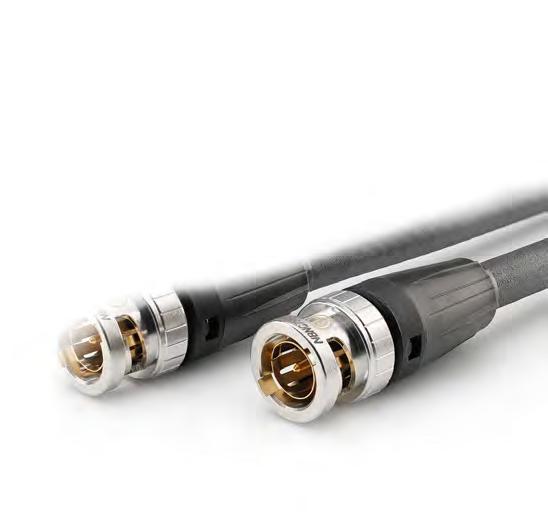
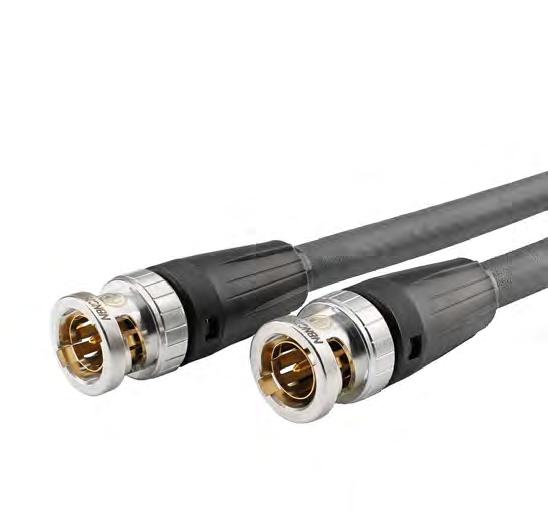
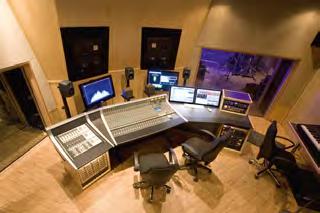





The Biamp Middle East team recently welcomed customers, partners and local

experiences from individual rooms to enterprise venues and everything in
to demo Biamp devices and software, as well as conduct training seminars for employees, partners and customers.
After the remarks, visitors received a tour of the space and product demonstrations, including the new Parlé conference bars. Biamp explained how organisations in the Middle East and across the world from disparate industries from healthcare to education are looking for better solutions to facilitate hybrid work, creating equitable experiences for those inside and outside the traditional campus environment.
According to the manufacturer, the Parlé conference solutions offer Biamp and its partners some of the most exciting growth opportunities, along with its collection of conference room AV bundles for rooms of all sizes.

www.biamp.com

Kramer has announced the completion of a global strategic partnership agreement with Vega Global. Under this agreement, Kramer grants Vega Global authorisation to design, implement and support the entire Kramer solutions portfolio. By tapping into Vega Global’s wide network of AV and IT resellers, this partnership will strengthen Kramer’s solutions offering to markets globally. With over 20 offices across Asia, Oceania and the Middle East, Vega Global has an extensive market presence that also includes key verticals like Enterprise and Education, aligning with Kramer’s market focus, objectives and business strategies.
Silicon Oasis. To mark the occasion, guests were treated to a ribbon cutting ceremony and tour of the new space.
The evening event began with refreshments and a welcome from Biamp CEO and cochairman Rashid Skaf, who talked about the vision of the company – connecting people through extraordinary audiovisual
need for and creation of the Dubai customer experience centre. The space will serve as a showcase to help partners and customers in the region gain a better understanding of Biamp’s capabilities and to see those capabilities in action first-hand.
The conference room inside the experience centre offers opportunities
university students and faculty represented. The Biology Sciences Building houses seven departments, spanning an area of more than 27,000m2. The building required a technology upgrade to provide connectivity for its classrooms for both in-person and distance learning scenarios. The challenge was to bring the building and classrooms up to speed with a fully automated solution that could control content, audio and video, without relying on DSP mixers or video processors.
Gilad Yron, Kramer CEO, said: “I am thrilled and honoured that Kramer is partnering with Vega to redefine how people engage with the world. Our technology powers creativity, productivity, expression and connections. Therefore, the high-value combination of Vega Global’s market reach and technical expertise together with Kramer’s broad portfolio of industry-leading audio and visual solutions, will greatly benefit organisations who are looking at deploying technology solutions to enable the hybrid workplace. This is just
Founded in 1453, Istanbul University is one of the world’s oldest universities.
At present, there are more than 69,000 undergraduate, graduate and doctoral students studying a variety of academia. The main entrance gate, in a style reminiscent of Moorish architecture, stands as it has for more than 150 years, with impressive influence from the Roman and early Byzantine empires. Istanbul University has a notable faculty and alumni including presidents, prime ministers and other political dignitaries, writers, musicians and scientists.

Project partners Hall Technologies and Aselgrup were challenged with melding oldworld style and modern-day technology for the
Aselgrup partnered with Hall Technologies to create the first-of-its-kind smart building at the university. With a vision of a connected classroom, Aselgrup and Hall Technologies outfitted the building’s 38 classrooms with Hall’s EMCEE200 multiview presentation switcher connected to an Epson projector. Seventeen of the rooms were also connected with camera systems for accessible remote learning for students.
The EMCEE200 is a multiview switching device primarily used to tile images of a PC, a teacher’s laptop and classroom cameras. It hosts via its picture-in-picture and picture-overpicture features. The faculty uses Shure stage microphones and wireless lavalier microphones that connect to the EMCEE200 to livestream the teacher’s presentations. Furthermore, the EMCEE200 can record the teacher’s presentation to an external storage device.
www.aselgrup.com www.halltechav.com
the beginning of a long and successful journey together as strategic global business partners.”
Huaming Gu, chief executive officer of Vega Global, added: “I am excited about Vega Global’s partnership with Kramer. As a business, we always look for partnerships with high-quality and reputable brands that deliver professional services to our respective clients. We are looking for this partnership to enhance the customer experience and add value to our clients and we are looking forward to growing the relationship together.”
Echoing the same sentiments, Matthew Deayton, deputy chief executive officer of Vega Global, shared: “We are pleased to partner with Kramer, they have extensive coverage across the APAC and MEA regions, dovetailing perfectly into the Vega footprint. As companies embrace the new hybrid modes of work, having strong collaborations with quality brands is key to delivering best-ofbreed solutions and seamless experiences for our customers.”
www.kramerav.com www.vega-global.com

Pure White, a brand-new, high-end club made famous by the White club in Meydan, has opened in Dubai Harbour. With a capacity of 1,500, Pure White is designed as an outdoor super club where a modern interior, large LED panels and solid sound installation aim to be paramount.
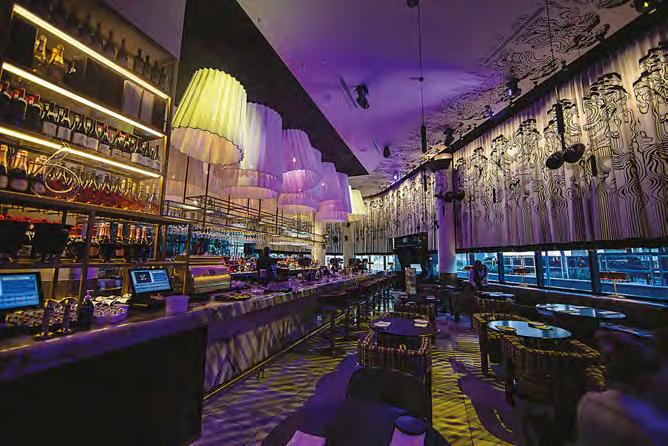

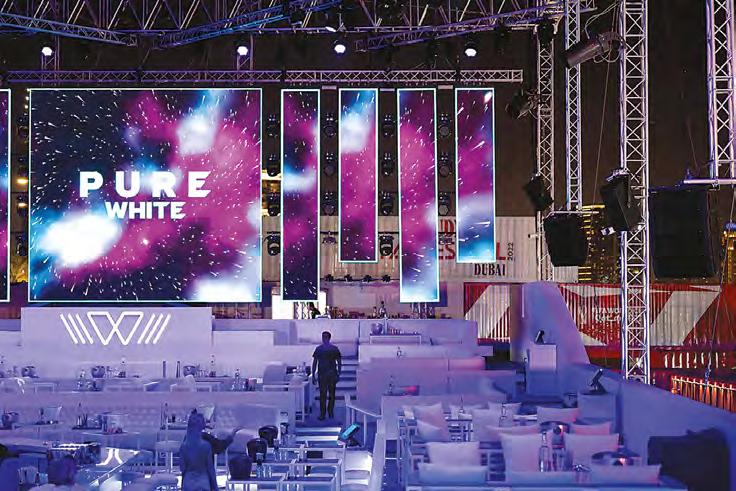
Pure White is said to be the first super club in the region to deploy Adamson Systems loudspeakers. The venue opened with a selection of artists including Usher and French Montana, who used both the main system and M-Series monitors for their performances. The main system comprises primarily of CS10 twoway loudspeakers from the CS-series which have been installed throughout the venue, together with CS119 subs, the CS10P for DJ monitors, and the CS gateway and CS bridge for communication. Along with the CS-series, additional subs and point sources from the
IS-series have been deployed as reinforcement in the venue. The IS10Ps aim to provide tonal balance when moving outside of the intended coverage pattern, while the IS119 is the larger subwoofer in the IS-Series. All artist monitoring was achieved by deploying the M15A/P for stage monitors from the M-Series.
www.adamsonsystems.com
As part of its efforts towards sustainability, Shure is improving its packaging to be more environmentally friendly. This new initiative will ensure Shure’s products prioritise the use of recyclable and renewable materials. New products will be packaged using 75% recyclable and/or renewable materials in 2023. In addition, the company is also improving packaging sustainability by committing to source a greater portion of its paper and fibre-based packaging from suppliers certified by sustainable forestry organisations, such as FSC, SFI and/or PEFC, with the intention to eliminate non-certified packaging by 2030.

Shure has also pledged to optimise packaging for efficient distribution and logistics, creating packaging that better fits onto pallets to maximise space, reducing transportation fuel and emissions produced by excess shipments. It is also ensuring existing packaging is greener, for example, replacing plastic inserts with moulded pulp where possible.
The company recently joined the Sustainable Packaging Coalition and conducted an audit to assess sustainability of more than 1,500 different packaging components.
Shure has also implemented software solutions to help improve packaging design and distribution efficiency. Environmental impact assessments have been added to other environmental requirements as part of Shure’s standard process.
But even before this, Shure was implementing greener packaging. In the 1980s, the company changed the packaging for mixers by eliminating the use of Styrofoam, switched from bleached cardboard to a natural brown colour and used a soy-based ink for the printing on the cardboard box. All the packaging could be recycled, except for the plastic bag that covered the mixer inside the cardboard container.
www.shure.com
Located in the heart of Sandton, Johannesburg, Zioux aims for a fusion of cool, classic and contemporary, with a curated cocktail of food, drinks and music with an interior design inspired by some of Africa’s best-known animals, attributes and energy.
Zioux manager Dino Constantinou knew lighting would be integral to creating the right ambience in the restaurant so he called upon DWR which specified 18 Robe moving lights – 12 LEDBeam 150s and six SPOTEs fitted with wide angle lenses.
Johnny Scholtz headed the project for DWR. Constantinou already had ideas about what he wanted – lighting to create subtle effects and texturing around the room for general dining, which could be ramped up according to the occasion, such as live DJ sets and other events.
Zioux’s management team also operates Saints, another highly successful Sandton nightspot, with DWR completing a small lighting installation comprising one Robe LEDBeam 150 for the DJ with a couple of colour-changing uplighters for the garden. This illumination was said to have made a real difference, so Constantinou contacted Scholtz regarding Zioux.
“Any lighting in Zioux had to be elegant and appropriate to the space,” explained Scholtz, who suggested fixtures with multiple features that would segue with the
interior visuals and environmental lighting.
He continued, discussing the selected LEDBeam 150s: “They are small and versatile and great for producing fabulous washes and great colour with good soft
edges for the wider angles, which is often tricky in a busy space.”
He observed that Robe has “greatly expanded its product range in the last couple of years, so all applications – larger
and smaller – can benefit from the same quality engineering.”
The main challenges onsite were making everything slick and neat, and accessing the roof as most of the fixtures are in the highest part of the ceiling. As they needed to be solidly rigged, thick threaded metal rods were chemically fixed into the structural roof concrete for attaching the lighting brackets, and the false ceiling was added around the lights.
The LEDBeams and SPOTEs are positioned to light the main seating and mingling areas, the DJ booth and to catch the bar and the large chandelier shades above it, adding colour and texturing.
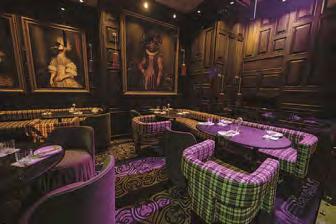

Constantinou wanted full control of the lighting from his cell phone, so Scholtz selected a LightShark web-based appcontrolled interface which runs with an LS-core box that accommodates two DMX universes. The lighting was programmed into sequences and looks using a console which were then uploaded to the box, accessed via the app.
“It was fantastic to be part of this flagship restaurant in Johannesburg,” concluded Scholtz.
A streamlined Void sound system in Zioux completes the space, offering guests an exciting all-round sensory experience.
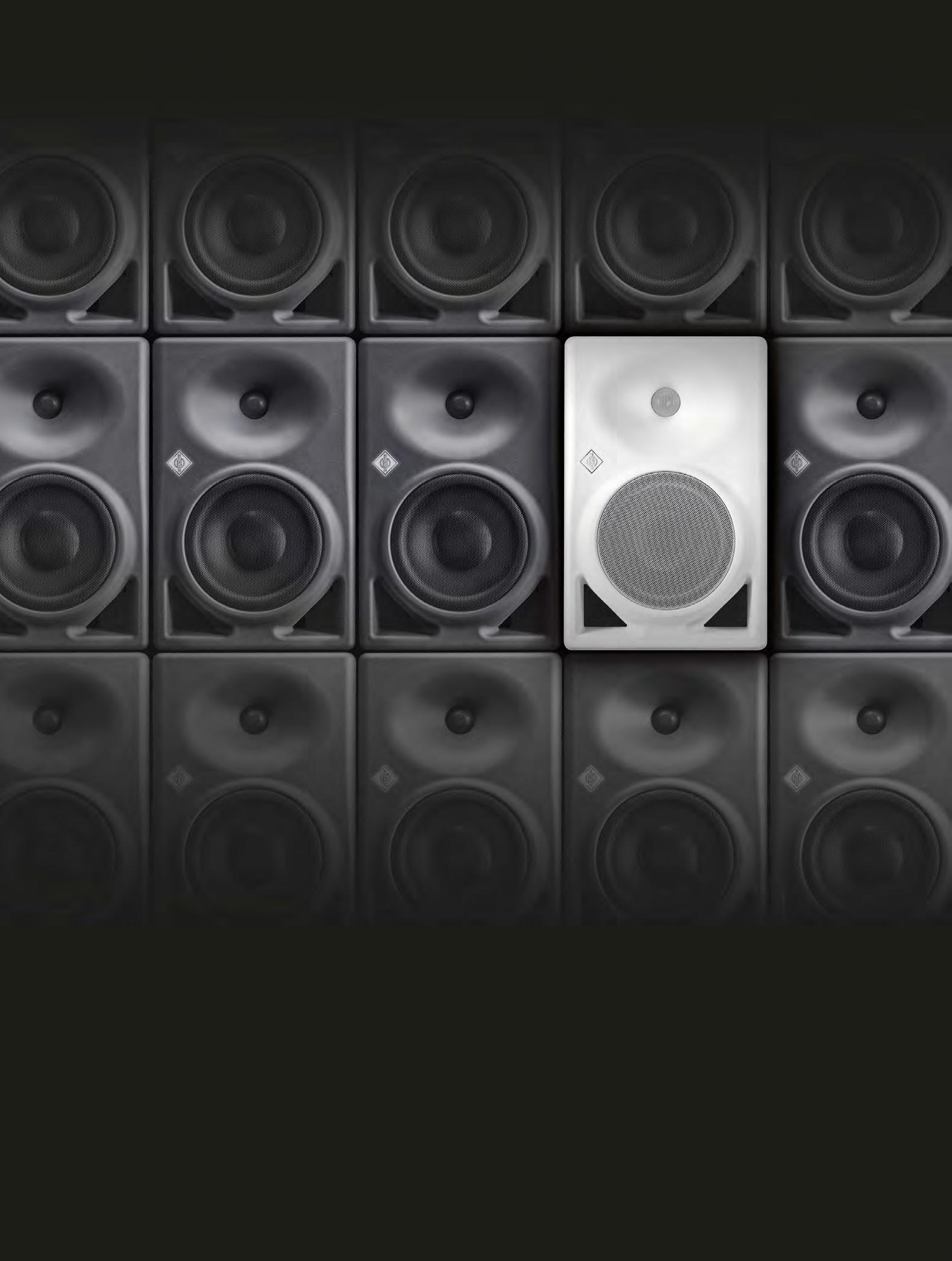



Virtual production is proving to be a game-changer for several industries – one of them being fashion. Istanbul’s MGX Studio has recently collaborated with Iron Project to create M&D Haute Couture, a fashion runway concept that utilises the studio’s virtual production stage. Brompton Technology’s LED video processing, using Tessera, was said to be integral to the project’s success.

“As Turkey’s first virtual production studio, we’ve had the great privilege of working on many exciting projects, including TV series, commercials and films,” said Mete Mümtaz, MGX’s virtual production specialist. “This project was our first foray into the intricate world of fashion, and client requirements for the shoot were slightly different to what we had done before.”

The MGX team created 3D scenes using Unreal Engine, which were shown on a 9600x1536 resolution 100m2 curved LED wall comprising Unilumin Upad III LED panels. Both the main LED wall and the 125m2 LED ceiling panels, used for lighting and reflections, were driven by three 4K Tessera SX40 LED processors and five Tessera XD 10G data distribution units.
Mümtaz noted that colour adjustment was one of the key elements for this project. “It was very important for us to be able to make precise adjustments and corrections to the colours of the images,” he explained. “As this was a fashion shoot, to provide a harmonious look to the entire scene, the colours on the screen had to perfectly match the colours of the clothing the models were wearing. That’s why, as always, we relied on Tessera SX40 LED video processors and, in particular, Tessera features like OSCA and ChromaTune, which ensured beautiful background visuals, even at extremes of brightness and colour gamut.”
Mümtaz also stated that this was Turkey’s first-ever fashion runway project using virtual production. “Our team took the time to demonstrate specific requirements and perfect conditions for shooting in front of

LED, which is very different to shooting on a traditional set. After a week of preparation, both the lighting and camera teams felt very comfortable working in virtual production, and everything ran smoothly throughout the shoot.
“We had really positive feedback from the entire team. The VP technologies at MGX Studio meant the real-time tracked images could be rendered with extremely low latency, allowing the models to be fully immersed in ultra-realistic 3D environments,” Mümtaz commented. “As with every project, the flexibility and reliability of Brompton’s LED video processing has enabled us to realise our client’s vision. Both Tessera’s colour management capabilities and the ability to shoot in ultra-high frame rate helped us demonstrate the creative possibilities of virtual production for recreating the catwalk experience and pushed the boundaries of the client’s artistic directions within the world of fashion even further.”
“We were thrilled when MGX opened Turkey’s very first VP facility last year and chose Brompton LED processing as part of the studio’s cutting-edge LED setup,” concluded Dries Vermeulen, business development manager (Europe) at Brompton Technology.
“It’s great to see this revolutionary virtual production facility bringing together traditional and new technologies to enable such great projects.”
www.bromptontech.com www.mgxfilm.com







Sony Middle East and Africa has delivered an IP HD/4K-ready Live Production studio for Al Araby TV in Doha, Qatar in partnership with Ideal Systems Group. The solutions include Sony’s Live System Management (LSM) and IP Control Software for signal routing and control and configuration of the IP live production system. Sony also provided 11 4K HDC-3500 system cameras and two XV-S7000 multi-format video switchers, delivering operability for mid-range productions. Modern Home supplied 130 65-inch BRAVIA XR TVs for IPTV distribution within the premises. Al Araby TV will be the first major network in the Middle East to be equipped with IP HD/4K-ready technology across its three studios. The IP system enables studios, control rooms and production equipment to be shared within a facility for more efficient use of production resources. Sony’s full IP HD/4K-ready ecosystem will strengthen the state-of-the-art Al Araby studio at its new headquarters in Lusail City in Doha.
The IP Live System will provide a variety of configuration functionalities across a 430m2 newsroom, 290m2 morning studio and a 235m2 blackbox studio, so the user can build several production systems under one networked system of AV devices.
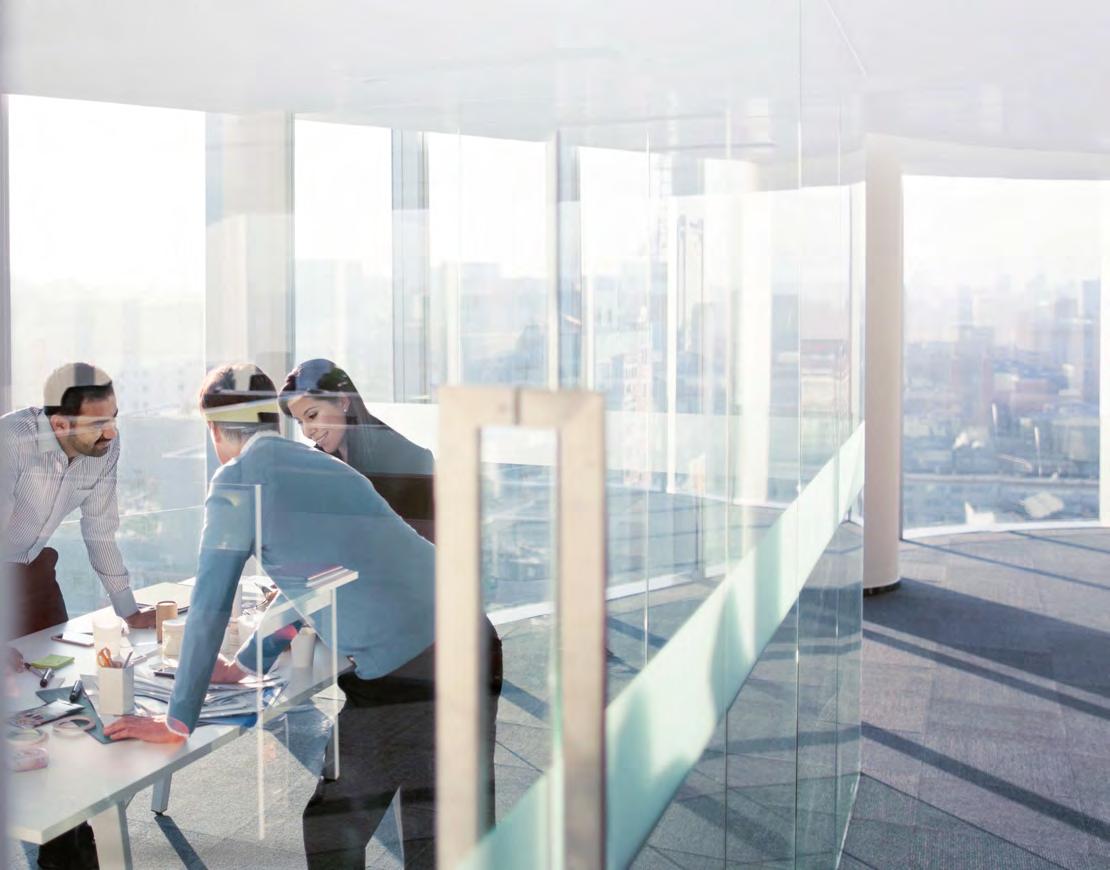
Jobin Joejoe, deputy managing director, Sony Middle East and Africa, said: “We are delighted to work closely with Al Araby studios in Qatar to deliver optimised use of studio facilities, control rooms and the most suitable solutions to maximise programming output. Our goal is to make live production more agile, flexible and cost effective through our end-to-end IP solutions. As we execute more projects in the region, we are upskilling our local partner Modern Home to support customers with after-sales services.”
Koichi Murakami, head of Professional division at Sony Middle East and Africa, added: “This was a challenging project; however, we had the full support of the engineering team at Al Araby, which was a key factor for success. This, coupled with strong contribution from Sony HQ (Japan) and the local engineering
team, helped us to successfully deliver this prestigious project.”


Ali Husseini, director of broadcast operations and visuals, Al Araby TV, commented: “Being an IP implementation, this was a challenging project both in terms of the latest technology and strict delivery timelines. Sony’s pioneering development of practical IP Live Production Solutions and their vast experience in delivering similar projects helped us at multiple levels during the various stages of the project.”
www.idealsys.com www.sony.co.uk




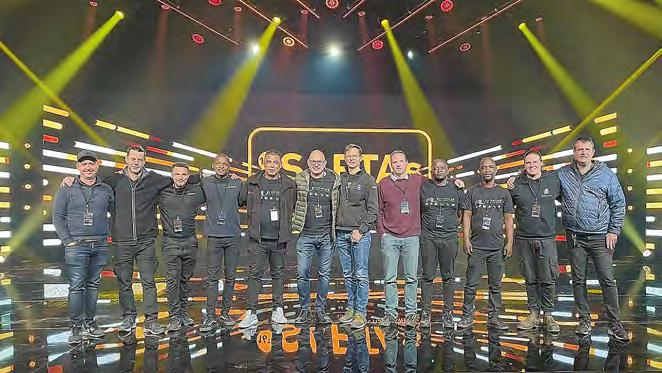
Last year’s 16th annual South African Film and Television Awards (SAFTAs) took place as a virtual event. Broadcast live, Alcons Audio’s pro-ribbon systems were selected for monitoring at the ceremony, themed “Frame the Future”. Production company Don’t Look Down Productions contracted Johannesburg-based AV Unlimited to provide the full technical production, with the monitor sound mixed by Adriaan van der Walt.
“Because the awards ceremony was live to air, there was no opportunity to do a second take. Reliability and consistency were crucial, in terms of both the technical staff and the demands on the equipment,” said Guillaume Ducray, operations director at AV Unlimited. “Because of these demands and, as a long-time user of Alcons systems, we had no doubt about which system to deploy.”
For the main stage monitors, Ducray specified a flown system of left and right
arrays, each comprising three LR16 twoway, dual 8-inch line array modules, loaded with the RBN601 pro-ribbon driver, and one LR16B double 15-inch compact line array bass module. A pair of VR12 two-way, 12-inch mid-size monitors, featuring the RBN601 pro-ribbon driver, were used at the mix position. ALC2 2x1kW and ALC4 2x2kW loudspeaker controllers with onboard Digital Drive Processor (DDP) were used to power and control the system.
“Because this was a virtual event, the broadcast mix was done in the studio, not
meant the mix had to adhere to EBU R 128 loudness normalisation specifications of L(K) = –23 LUFS. The transparency of the VR12, combined with the clinical damping factor of the ALC2, meant the mix in the studio translated very well on-air.”
The LR16s and LR16Bs were set to a 160Hz preset, the latter to no low-end rolloff, while the VR12s were set to full-range.
Van der Walt continued: “To this day, the LR16 system stands its ground against any other professional sound system, with the variety of DDP preset options allowing the user to deploy the system for a wide variety of applications.”
www.alconsaudio.com www.avunlimited.co.za
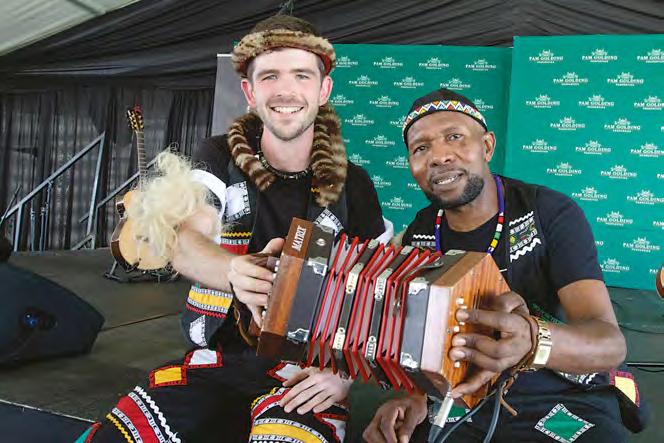
After a two-year Covid gap, the depressed economy and the hazardous N3 highway between Durban and Hilton, as well as severely reduced sponsorship, it was a risky decision to go ahead with the Hilton Arts Festival in KwaZulu Natal, South Africa. But, following discussions, organisers felt art is what brings a society together, so it was worth the gamble.
“With the weather playing ball, crafters and visual artists had a steady flow of visitors all weekend,” said Sue Clarence, founder of the Hilton Arts Festival. “All productions were well-supported, with several selling out. The community of performers, visual artists and crafters who, over the years, have become a firm part of the success of the festival, were overwhelming in their praise, excited to be back.”
The new music auditorium raised the bar for music with its superb acoustic design. “This is what art is meant to do,” Clarence added. “Thanks to our sponsors, we were
able to up our game technically, which made a huge impression on the visiting production companies.”
Working in collaboration with NEXO’s engineering support team, a P+ Series point source system was configured using NEXO NS-1 software to predict coverage in the venue. Four NEXO P12 loudspeakers and four L15 subs are installed in the main room, with amplification from NXAMP4X1MK2 powered controllers. The
“Thank you, Sue Clarence and Evan Roberts for your unfailing dedication to keeping the festival alive,” said Taylor-Broderick. “You took a huge risk and provided a platform for artists of all genres to express themselves and you created an opportunity for at least a dozen entertainment technicians to earn some decent money after the devastating effect that Covid-19 has had on our industry.”
He expressed he would not have attempted the festival without the integrity and dedication of Back Coffee, Insane Sound and Extreme Events. The festival was made possible by the host sponsor, Hilton College, and other major contributors.
“The biggest thanks go to the public, for being here to keep the arts alive,” ended Clarence.
www.dwrdistribution.co.za www.hiltonfestival.co.za
centrally located bar is equipped with two P8s.
“The P12 is the perfect system for this type of venue, thanks to its compact size and shape, and its high sound pressure level,” commented Smart AV owner, Franck Bessol. “It’s also very quick and easy to install, which was greatly appreciated by the client.”
“come for the food, stay for the mood”, has turned to Casablanca-based Smart AV to design and install a versatile sound system.
With a DJ booth in the centre of the restaurant, of soul, funk and local deep house, so it’s key that the system could shift gears from background music to floor-filling sound.
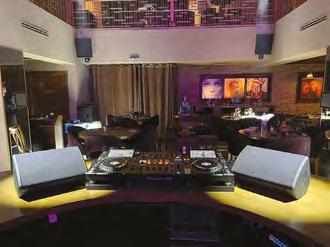

Commenting on behalf of NEXO, sales manager for France and North Africa, JeanJacques Vias, said: “NEXO has earned a global reputation for its compact point source loudspeakers. With its variable dispersion characteristics, coaxial driver configuration and curved cabinets, the P+ Series delivers a perfect balance of stunning performance and sleek good looks.”
www.mixmarrakech.com www.nexo-sa.com
director, Michael Taylor-Broderick from DWR Distribution, was involved in the festival.From a single room to a global enterprise, the Crestron Virtual Control software-based platform enables you to unify and control a growing number of devices. Intelligently and efficiently.
Download our free eBook: Virtual Control Solutions for the Modern Workplace


disguise has reengineered its learning programme to a new offering named disguise Learn. disguise Learn’s new inclassroom and online courses provide an improved experience offering dedicated learning pathways for virtual production, extended reality, broadcast graphics, location-based experiences and live events so users can pick a learning pathway most relevant to their chosen industry application.
“With disguise Learn, we want to share all we’ve learned with our 20 years of industry expertise and make it as easy as possible for anyone to become an expert in disguise workflows,” said disguise training manager for EMEA, Alex Lapthorne.
disguise Learn offers a blended approach with both online and classroom learning for all levels of experience. The online offering comes free of charge and now includes more easily consumable learning content presented in different formats.

disguise Learn offers certification in the form of printed certificates and digital badges that get posted to the attendees’ LinkedIn network upon successful completion of each module.
Alex Wills, disguise chief experience officer, said: “The pace of innovation within the media and entertainment space is increasing exponentially and we want as many people as possible harnessing the disguise platform to stay at the very forefront of these industries.”
www.disguise.one

UAE




EditShare has delivered a storage platform to the Sharjah Government Media Bureau (SGMB) in the United Arab Emirates. The new system allows SGMB to expand its activities and meet its goal of migrating to 4K UHD. The new system is built on EditShare’s EFS 300 storage architecture and is fully redundant. The system replaces a postproduction and storage network which was tied to a single vendor. “With our previous system reaching end of life, it gave us a chance to define what we really needed from a storage network,” said Maher Kazmouz, manager, media department for His Highness Ruler of Sharjah. “Key goals were the ability to work at 4K resolution
and HD, to be flexible in the file formats and creative software tools we use and to have a single point of control from ingest to archive. EditShare showed they could meet all our requirements and provide us with capability for future expansion.”
The system was implemented by Broadcast Solutions Middle East, a systems integrator and EditShare channel partner. “SGMB were impressed by the flexibility and reliability we could offer with EditShare technology,” said Laurent Mairet, managing partner at Broadcast Solutions Middle East.
www.editshare.com


Stage Audio Works has reported that its live workshops run by MxU at the end of last year were a resounding success. Over 200 attendees from various ministries congregated at 3Ci Church in Pretoria for a masterclass in live production for worship. The event was led by MxU co-founders Jeff Sandstrom and Lee Fields, who travelled from the US. SAW and co-hosts d&b audiotechnik were on-hand to provide technical assistance and any additional support required.
“We were thrilled to be partnering with 3Ci Church and Stage Audio Works,” said Sandstrom. “Lee and I spent a portion of the day challenging each other with
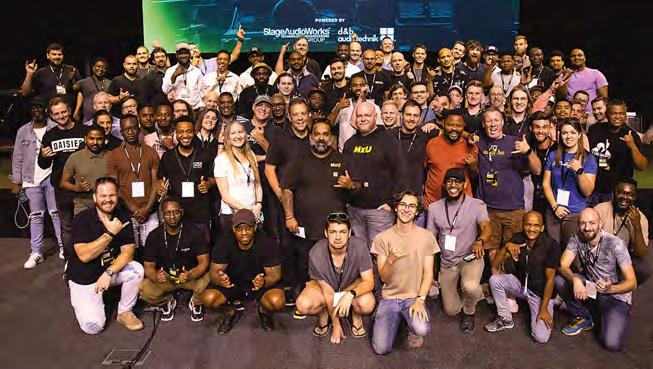

Protec has made significant changes not only to its brand, but also the way it handles operations. Reflected with a new logo and brand identity, with richer colours and a new user-friendly website, the company explained that the rebrand is the culmination of almost two years of reflection, research and carefully thoughtout changes in structure and management.
Protec’s Middle East team of 70 has also been optimising its processes and procedures including the introduction of new SOPs and resource planning and rental software. In April, it had its ISO 9001:2015, ISO 14001:2015 and ISO 45001:2018 accreditation inspected and reissued, affirming ongoing commitment to quality, safety and minimising environmental




impact. The company has appointed general manager, Matt Allen, who has a fresh, optimistic approach to the role. Using repurposed and in-stock materials, the team has refreshed the reception area and updated the interior and exterior branding. One of the most impressive additions to the facilities is the PreVisualisation suite, a sound-treated dark room with a separate recording booth offering employees and clients an immersive viewing experience to help in the planning and visualisation of events. With a separate recording booth, Protec offers an opportunity for content or voice recording.
www.protecevents.com
best practices, sharing tips and tricks to try and find out how we can improve our process, to make the tracks we mix sound better. Our hope is that everyone present had the opportunity to eavesdrop on this conversation and apply some of these tips and tricks to their own context.”
Participants were encouraged to ask questions as well as share their own insights and experience during the workshop, which had plenty of hands-on opportunities as well as panel discussions and demonstrations. There was also time to network and chat more informally over refreshments.
www.stageaudioworks.com


VITEC has inaugurated a new office in Dubai in-line with its rapid expansion in the Middle East. The company’s investment into its new regional headquarters is said to demonstrate its commitment to long-term growth in the Middle East, with a particular focus on Saudi Arabia, UAE, Qatar and Egypt. Since the company established its presence in the region in 2019, business in the area has accelerated. VITEC expected a 50% growth in revenue for 2022. With a skilled regional team of nine in Dubai and four in Saudi Arabia, the ME team covers sales, business development, pre- and post-sales to better serve existing customers and prospects.
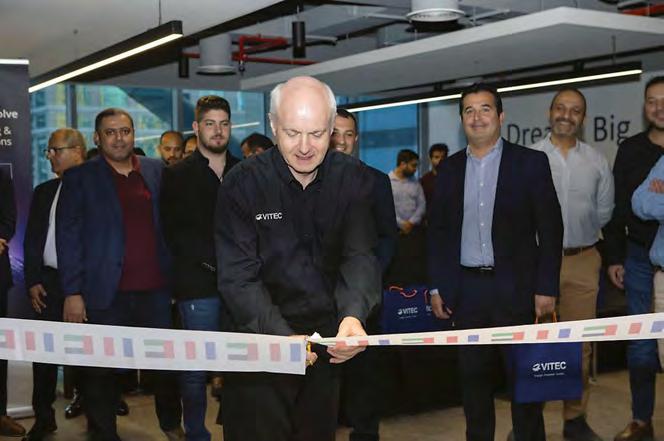
business opportunities, markets and verticals in the region.”
Sustainability is a key part of VITEC’s core values, aligning with the Middle East’s net zero vision. The organisation has been carbon neutral since 2021 and recently launched the GreenPEG initiative to further optimise MPEG technology by addressing –and minimising – the size, weight and power of devices to reduce energy consumption.
Over the next year, VITEC intends to continue with its strategic growth plan in the Middle East, targeting key verticals including broadcast, military, healthcare, sports/venues, corporate/government and accommodation. “We believe our continuous
Cape Town-based Ultra Events has purchased 12 Robe Robin LEDBeam 350s from DWR Distribution which will be put straight to work as the events company’s upcoming calendar is, in its own words, “flourishing”.
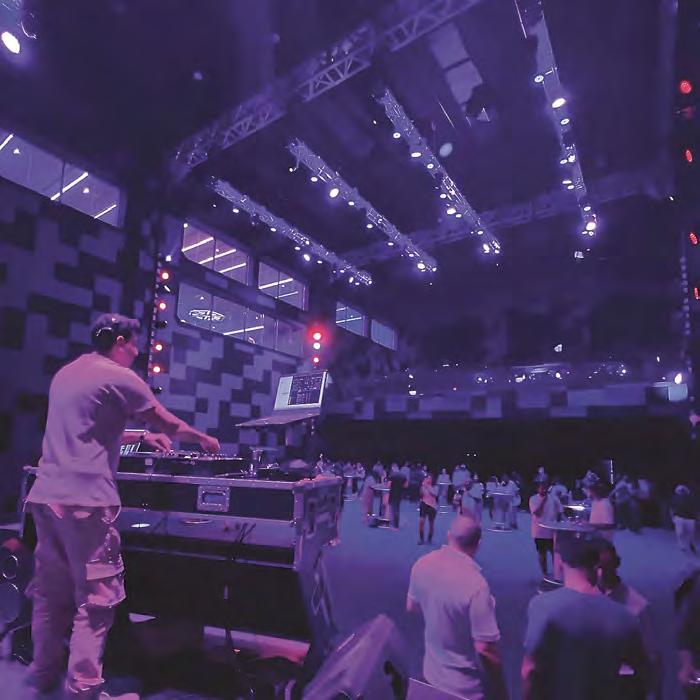
With Covid-19 still fresh in the minds of the South African live events industry, Ultra Events owner Costa Champanis was one of the core people during the pandemic who helped come up with plans and ideas to save the live events industry and was instrumental in the formation of #LightSAred. That fact that work is now finally starting to pick back up is “such a relief,” said Champanis. “After a dark period of business during Covid, with the events industry being shut down and our ability to work restricted, it’s a great feeling to be onsite and doing what we love most, with great people and nice toys to work with.”
The LEDBeam 350 is the big brother of the LEDBeam 150. The unit is capable of creating fast sweeping beams and washes while maintaining a 3.8–60° zoom range. CPulse (the fixture’s Pulse Width Modulation control system) removes any onscreen camera flicker, making the LEDBeam 350s suitable for work with the most advanced HD and UHD cameras.
“I was able to spend a bit of time with Costa and his team while taking delivery of their new LEDBeam 350s,” commented DWR’s representative in Cape Town, Johnny Scholtz. “They already have work for the units this weekend and Costa says they will be properly put to the test this

Nicolas Pons, VP business development Middle East at VITEC, commented: “The purchase of our new
our ties and support our anticipated further expansions in the Middle East,” concluded Pons. “Our products and philosophy align perfectly with the region’s requirements and ambitions, and we’re looking forward to supporting companies across the Middle East for many years to come.”
www.vitec.com
Provision AVL has taken part in a futuristic development in Abu Dhabi. Al Qana is an area comprising the National Aquarium, cinema complexes and restaurants and is now home to a gaming complex known as Pixoul Gaming. Provision AVL worked alongside the onsite team to provide main and flexible support structures for the E-Sports Arena.
Pixoul offers an esports and virtual reality experience in one single gaming complex. Visitors have the chance to immerse themselves in online gaming through a range of technologies from a variety of virtual reality simulators. Pixoul also includes the first-ever certified esport academy in the region with the mission of highlighting the importance of playing responsibly.
As regional distributor for Prolyte trussing and EXE Technology chain hoists and control, the team at Provision AVL, led by Paul Hadfield, called upon a range of equipment to provide long spans of open high load trusses and chain hoists of the highest performance and safety standards.
Hadfield explained: “We immediately understood their vision and future scope for use of the event hall, not only for
high-profile, global esports use but also to provide the venue with solutions that would provide a multitude of possibilities in
terms of live events, DJ events and product showcase launches.
“The venue required long open spans with high-capacity loading but with compact dimensions to not affect the experience of the attendees. With this is mind, we knew that Prolyte’s BGR70 truss was the best truss suited to this application. Couple that with S36 trussing suspended on EXE 1,000kg D8+ chain hoists and modular staging in the form of Prolyte Stagedex, this venue can be ever-changing to suit each event.
‘We expect big things for this venue, and it sets the standard for future gaming complexes to follow. It’s been a privilege to be part of this journey and we remain committed to supporting the team going forwards as they break new ground in the fast-evolving world of gaming.”
www.prolyte.com www.provisionavl.com
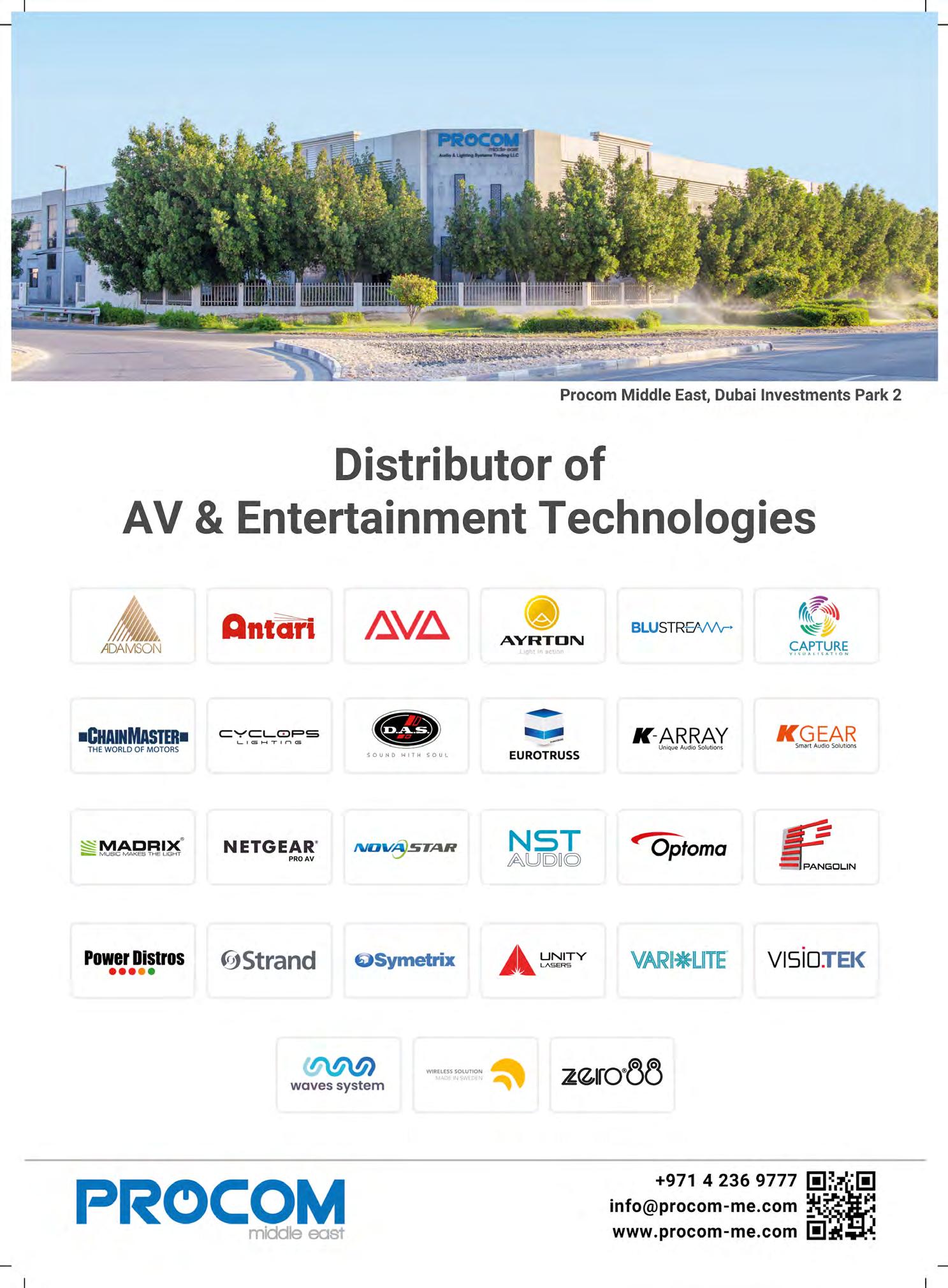

TVU Networks has provided 24/7 onsite support in Qatar, servicing more rentals of live equipment in Qatar than ever before in the company’s history. Hundreds of TVU One backpacks and RPS Link transceivers have been commissioned in order to capture content of the competition not available on the international pool feed. The manufacturer is also ensuring content comes from more than just the host country and, through an exclusive partnership with Total Media Cast, live feeds from fan zones from all corners of the globe will be made available through TVU Grid.
“There has been an international investment explosion in TVU live solutions,” says Halid Hatic, TVU Networks VP of media services. “Success after success naturally has broadcasters taking notice of how delay-free and problem-free TVU solutions are. Fox Sports, ESPN, CNN, the Alphabet Networks and hundreds of local TV stations have all been long-time North American customers but now we’re very busy with customers from Korea, China, Japan, India, France, Germany, Australia, Israel and many more.”
“It is a good problem to have,” furthered TVU Networks CEO, Paul Shen. “We collaborate with our customers so that
rapper Gims. Produced by FIFA’s Creative Entertainment Executive, RedOne, three songs on the official soundtrack were recorded at Katara Studios in Doha.
“We began working on audio demos in 2021, soon after FIFA Sound announced its new entertainment strategy,” Murad furthered. “The work we did sounds great. Prism Sound converters play a big part in our success, and we really couldn’t have delivered such high-quality audio without them.”
FIFA World Cup in Qatar. With the music being recorded and mixed at Katara Studios in Doha, the British manufacturer’s products were used extensively throughout the process to ensure that all audio produced delivered the highest levels of clarity and quality.
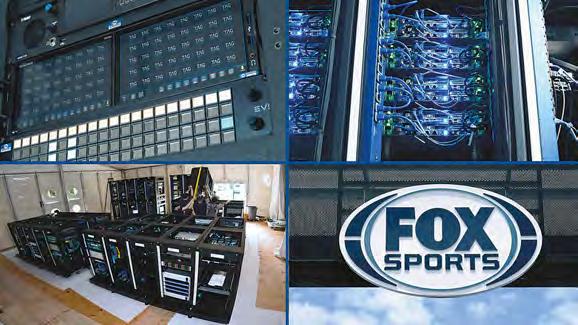


“Katara Studios has over 50 Prism Sound converters ranging from the flagship ADA-8XR multichannel converters, through to DA2 stereo D/A and AD2 stereo A/D converters,” explained internationally acclaimed mastering engineer Mazen Murad, Katara Studio’s director of music production. “We use them for everything, all the time. For the FIFA World Cup project, every activation that had anything to do with music involved a Prism Sound unit at some point in the creative chain – from recording live musicians, through to mixing, mastering and postproduction.”
The tournament saw FIFA break with tradition by scrapping the concept of one official song. Instead, it released the FIFA World Cup Official Soundtrack featuring multiple songs from artists
Katara Studios is known as one of the most technically advanced film and music recording complexes in the Middle East. To capture the music for the opening and closing ceremonies, Katara Studios hosted a week of full orchestral sessions engineered by Matt Howe, the studio’s chief recording engineer and formerly of AIR Studio and Metropolis. Howe and Murad invited British-based composer and conductor Youki Yamamoto to lead from the podium.
“Some of Katara’s larger systems are configured with up to 96 channels worth of Prism Sound ADA-8XRs in transportable racks,” described Howe. “We can even go higher than that if we unite them in tandem with our other interface racks, at mixed sample rates and connected to other capture systems. This is useful when we have requests for very highdefinition ‘audiophile’ multichannel recordings such as Dolby Atmos and immersive sound ‘Stem’ capture and delivery when we can afford to go outside of the remit of broadcast standards.”
there are no surprises. Despite our recent growth, every delivery is set in stone and every order is filled.”
ES:ME Entertainment Services, a rental company based in Qatar, has invested in L-Acoustics products via Edge Electronics, the MENA distributor for L-Acoustics. The K3 system is made up of 24 L-Acoustics K3, eight KS28, two LA AK AVB II, one P1 processor, as well as two extra LS10 switchers, and is said to be the first system of its kind sold in the Middle East.
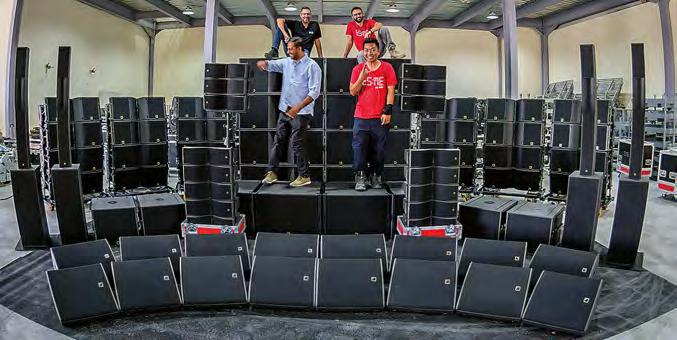
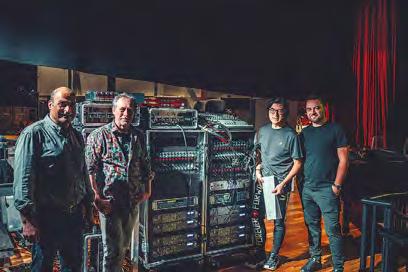
“We’re incredibly excited to have ES:ME Entertainment Services joining the K3 Rental Partner network,” said Chris Mead, regional sales manager for the Middle East, L-Acoustics. “Their expertise in the local market and understanding of end client’s needs ensure that K3 will delight audiences at the region’s most prestigious events.”
The system is currently available to rent in Qatar, and there was reportedly plenty of interest in utilising it for the World Cup in the region.
“We are thrilled with the increasing demand of L-Acoustics in the Middle East,” added Pratap Singh from Edge Electronics. “We are committed to providing the best possible AV solutions to our partners and thank them for their continuous trust in Edge Electronics.”
“After a long wait due to global supply chain restrictions, we finally got our hands on our brand-new L-Acoustics K3 system with the sole objective of serving the region’s market at the best possible level. We were excited to try it for the first time at the World Cup and hope to see it in action at many more events across the Middle East,” said Alexander Wuerfel, CEO, ES:ME.
edgeet.com www.es-me.net www.l-acoustics.com
US broadcaster FOX Sports has used equipment from TAG Video Systems for the World Cup in Qatar. Serving as the broadcaster’s monitoring and visualisation provider for the event, TAG’s 100% IP software platform served all of their control rooms and operations multiviewers, monitoring the integrity of over 1,200 sources driving more than 150 displays. FOX Sports presented all 64 matches from the tournament live in the US across FOX and FS1 with every match livestreaming on the FOX Sports app and available on-demand as replays on Tubi.



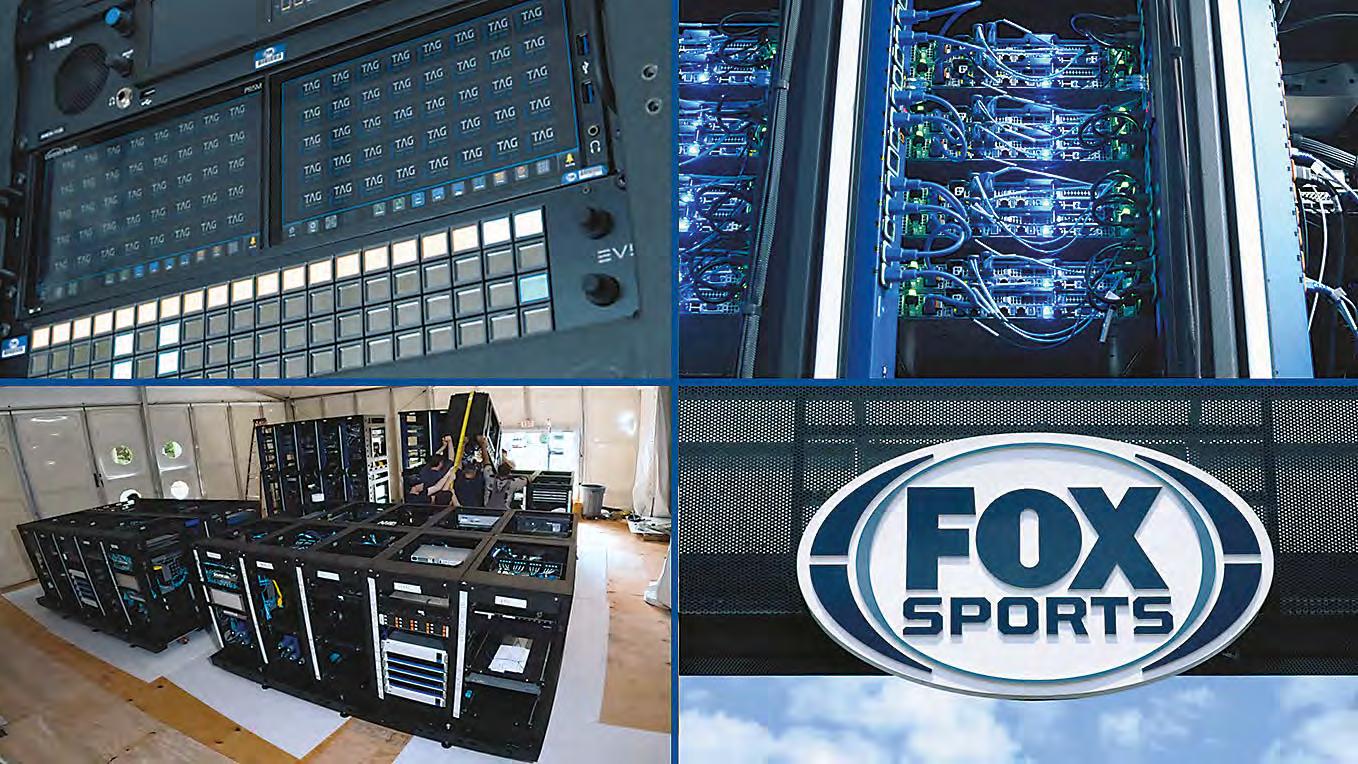
Built as two separate and redundant
Kevin Callahan, VP, field operations and engineering at FOX Sports. “It connects to the studio location; it connects to all the venues; it connects to our Los Angeles broadcast facility as well as our Tempe broadcast facility.”
Leveraging IP and SMPTE ST 2110 technology, the system was able to move to all-fibre, reducing the size and weight of the kit significantly. With a full control room, 40 tech core racks and 10 venue racks, the system travelled fully pre-wired and was ready

Challenging environments demand greater control. Pushing the limits of reliable performance, our complete video wall control solutions manage control room applications at any size, whether monitoring traffic, process control or security surveillance.
We make life easier for system integrators whilst enabling control room operators to focus on their core objectives.

Blue Array Productions has become the first technical supply company in South Africa to take ownership of a DiGiCo Quantum 338, a sought-after rider-driven digital mixing console, purchased from DWR Distribution. Over the past 17 years, Blue Array has become known for its professional service in audio rental and productions. Its DiGiCo journey started in 2016 with the investment of an SD5, which was also a first in the SA market. Today, it has a DiGiCo S31, SD11, SD5 and now the Quantum 338, all taken care of by senior sound engineer Nathan Thiart and the Blue Array team.

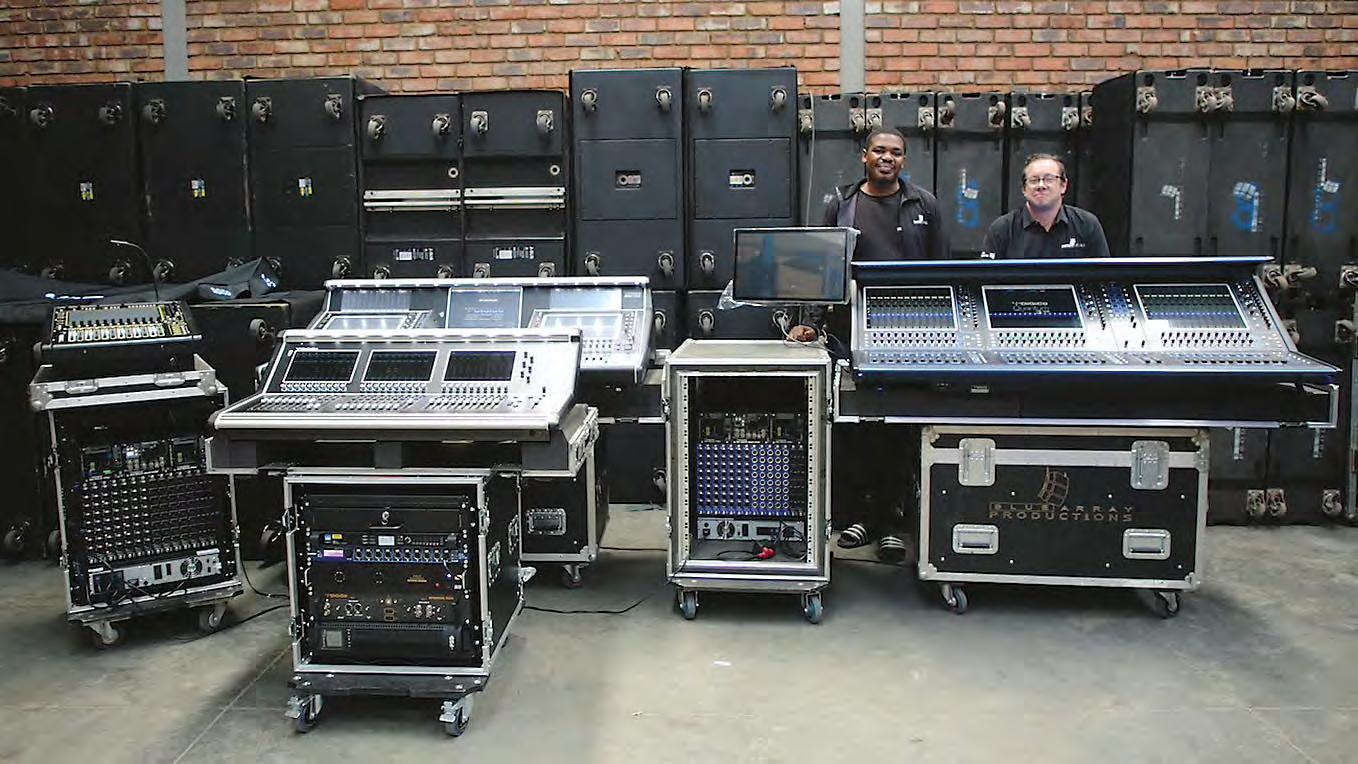
“The idea behind our latest purchase was to specify rider-driven equipment that would also cater for local audio engineers,” said
Johannesburg. “We considered the SD12-96, nothing too big nor too fancy, and something that would satisfy the local market. Our main necessity was to acquire a large-format console to pair up with the SD5, something that could handle a normal band or festival setup all the way to an international rider. The S31 is great for day-to-day events but we
While the Blue Array team had its eye on Quantum, it did not want to put pressure on the business by requesting something that was top of the range, particularly after
Kobus van Rensburg, owner of the company, disagreed. Thiart said: “Kobus decided that the Quantum 338 was the way to go, considering how technical riders are evolving to Quantum. We knew that this would be the right console for the company.” The next upgrade will include a Quantum engine for the SD5.
The Quantum 338 went straight onto DStv’s Delicious International Food & Music Festival held in Johannesburg where it was used for a performance by Nigerian singer and songwriter, Burna Boy. Over the same period, Burna Boy also played in Namibia
The Quantum also featured at Liefde by die Dam in Cape Town and for Calum Scott’s Bridges South Africa Tour at the end of last year.
It has been a seamless transition for Thiart to move across to the new platform. “There are definitely some new attributes but, in terms of the workflow, everything has stayed the same and we know where to find everything,” he said.
www.bluearray.co.za www.dwrdistribution.co.za
intercom system. The frame was fitted with two 32-port OMI OMNEO matrix interface cards, three AIO cards and one 64-port MADI-2 card. The audio signals were sent and received via MADI and fed into the system for distribution to various panels and areas, as well as camera programme feeds, IFBs and others. In total, 11 KP-5032 and 26 KP-4016 keypanels were in use, along with 10 TIF-2000A telephone interfaces.
signals being passed over the DSNG satellite uplink truck and over the fibre feeds,” Southgate continued. “Production was covered by seven KP-5032 panels for various departments and the in-house UFC
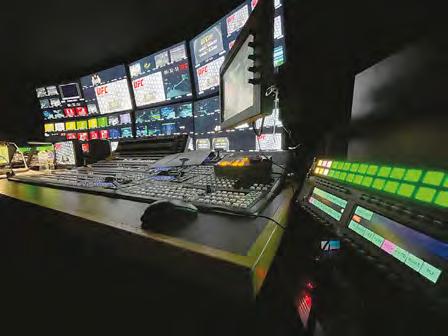
RTS equipment was at the heart of the intercom system for the recent UFC 280 mixed martial arts event at the Etihad Arena in Abu Dhabi. The event, which saw fights for the UFC Lightweight and Bantamweight titles, was broadcast worldwide, requiring a large intercom solution to ensure various production crews, broadcasters and organisers could stay in close contact.
“UFC are very specific in how they work and the systems they use,” explained
“As the show has various stages to it, with the lead-up fights being free-to-air and the main fights of the evening being pay-per-view, there are various elements for each of those stages.”
Windows-based IPEdit software was in use to configure the 54 OMNEO ports that were available and connected to the ADAM-M matrix which was at the heart of the
“We used three managed switches, all connected via fibre, and created each production area in a token ring network to ensure system redundancy, as up-time of panels while on-air is vital and even more so during pay-per-view,” explained Southgate. The keypanels were distributed around the different production areas to meet their specific needs. “There were different graphics positions for the various elements of the free-to-air, pay-per-view and fight metrics; these were covered by five positions using five panels,” he added. “The EVS department was split into seven positions, with the addition of an extra producer cutting highlights for a separate show and an editor position for cutting news reels and highlights for various news and sports outlets.
“The TX positions were covered by two panels, with this area sending the feeds to the various stakeholders and broadcasters and also ensuring the integrity of the
technical manager ensuring everything ran smoothly. The remaining panels were split between shading, audio and front of house technical director, producer, lighting and audio, as well as the production office and OB trucks.”
Reflecting on a successful event that saw Islam Makhachev defeat Charles Oliveira and claim the vacant UFC Lightweight Championship title, Southgate was full of praise for the RTS intercom network: “RTS intercoms once again proved to be the best choice – it’s simply my comms guarantee.”
 Michael Southgate, who was contracted by NEP Singapore to be the comms guarantee engineer for the event.
Michael Southgate, who was contracted by NEP Singapore to be the comms guarantee engineer for the event.

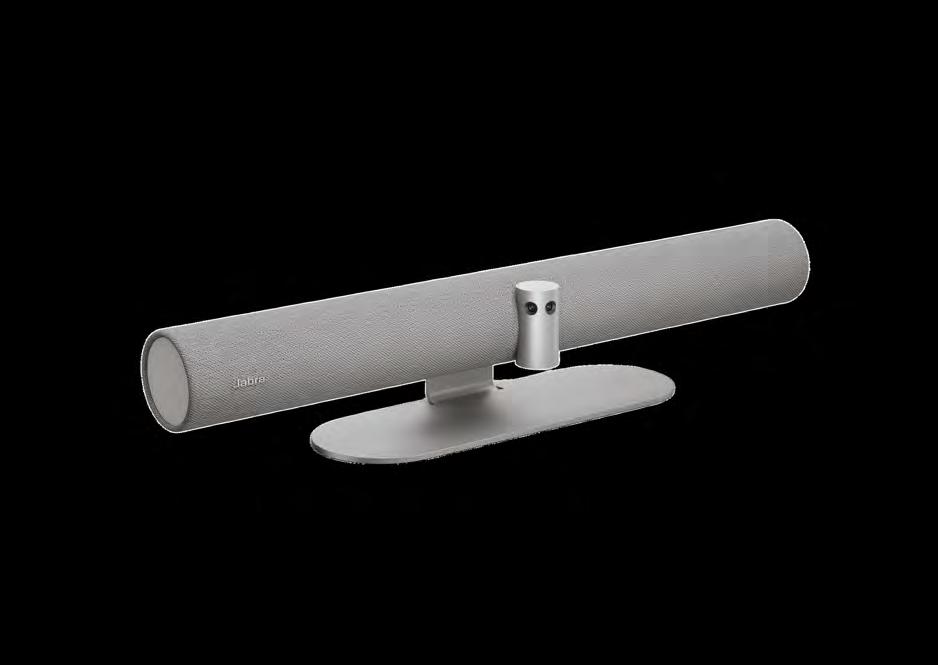

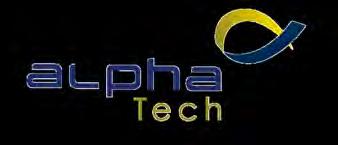

BeWunder, previously known as Neumann & Müller Middle East is the next phase of our growth!
Carrying the legacy of Neumann&Müller and the foundation we have built in the region with our team & partners, we are excited to work towards the bright future of BeWunder.
BeWunder marks the next stage of our journey, giving us the opportunity to expand our reach and extend services for our current and future partners.
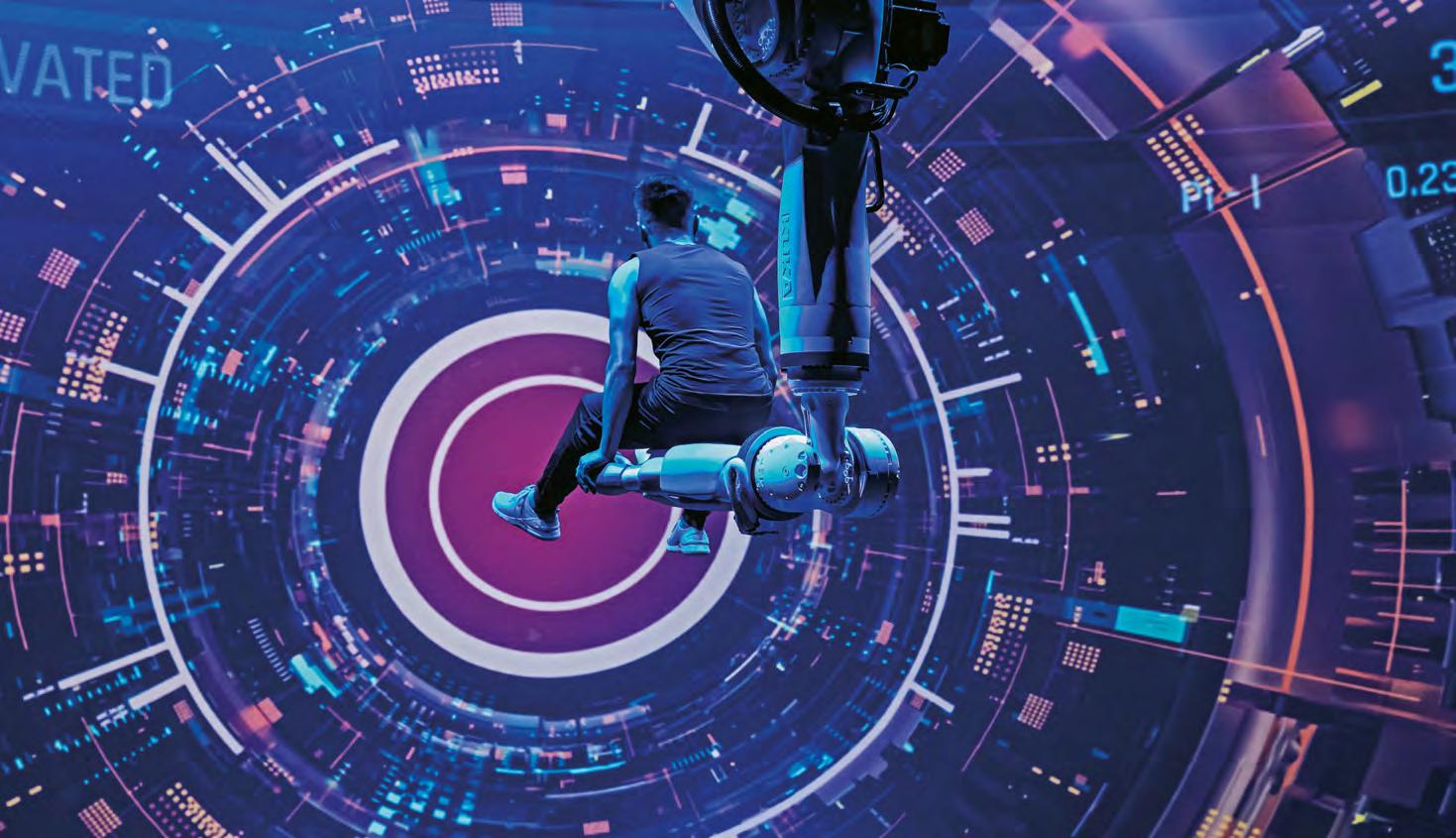

PRO LAB has become the distributor for Digital Projection in the GCC region.
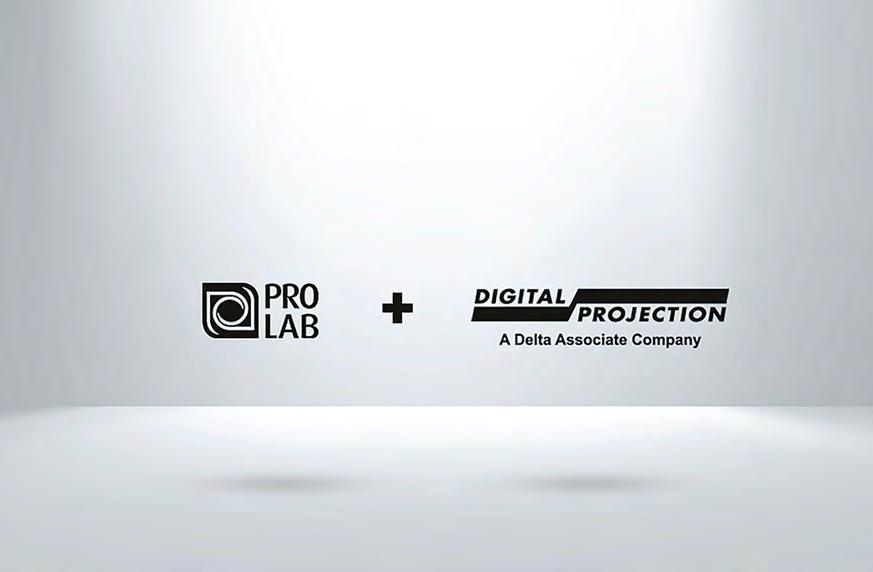
Digital Projection manufactures a line of 3-chip and single-chip DLP projection systems, suited to demanding applications such as large venues, live event staging, education, medical and scientific research,
and together we look forward to growing this business.”
PRO LAB has also partnered with VIOSO, becoming its exclusive distributor in the Middle East region. The VIOSO project setup includes panorama screens, dome projections and
to deploy advanced visual solutions. We are extremely pleased to be working with Digital Projection in the GCC region. We look forward to a successful and long-term partnership with DP and the team.”
Matthew Horwood, country manager, UK and Middle East at Digital Projection, commented: “We are pleased to be working in partnership with PRO LAB in the Middle East. Together we have achieved great success, particularly in the events and rental and staging markets, helping customers execute multichannel projector projects throughout the region. High-end projection still provides the ideal solution for many large-scale applications
“PRO LAB will provide our technology, software and server solutions to the AV market, including our unique dome projection and mapping capabilities. In addition, the company will be a contact for simulation/industrial applications from our simulation section. We are very glad about this cooperation and would like to thank PRO LAB for their spirit and enthusiasm to bring the VIOSO magic to the world,” commented Raul Vandenberg, sales director at VIOSO.
www.digitalprojection.com www.prolabllc.com www.vioso.com
Dubai-based distributor Thomsun has added Univox by Edin to its expanding portfolio of pro AV brands. Owned and operated by Swedish founder Bo Edin AB, Univox is a manufacturer of high-quality RF and IR assistive listening products and was responsible for the creation of the very first true constant current loop amplifier back in 1969. It’s since grown to occupy a strong position in the global hearing enhancement system market. Thomsun will be responsible for the Univox brand exclusively in the GCC territories.
“We see Thomsun as a long-time partner that we can co-develop a business relationship with and help us grow further in the GCC countries,” explained Univox CEO, Mattias Arrhenius. “We are always on the lookout for partners that will actively work to promote our products, that puts the effort in and wants mutual growth. During our first meetings, we made it clear that you get out what you put in. If you have actively pushed the products, tried to analyse the market and see the possible routes in, you will be successful. But it does take effort.
Thomsun’s response was ‘no problem, we’ll do it!’, and that speaks volumes. It’s a mutual relationship, we need to put effort in, and the distributor needs to put effort in, and that’s definitely what we’ve been seeing so far.”
“For us at Thomsun, this is a new technology, but I think also for the Middle East market as well,” added Thomsun’s Univox brand manager, Ahamed Naufel. “We have already completed our first orders and are confident that the business is going to pick up quickly.”
Thomsun introduced the brand to the local market for the first time at GITEX Global 2022. “I’m very impressed and satisfied with the presentation the Thomsun team created for the show, and I hope we did our part too,” added the Univox CEO. “They had all of our items on display on the booth and I feel confident that the company will diligently and professionally continue to promote our solutions.”
www.thomsun.com www.univox.eu
Ayrton and Procom Middle East have entered into a distribution agreement covering the Middle East region. Procom will take responsibility for the marketing, sales, technical support and development for the lighting manufacturer’s product catalogue in the GCC, including UAE and Saudi Arabia. The distributor has a strong portfolio of professional lighting and stage equipment that “goes hand-in-hand” with Ayrton.
Procom offers customers project and product support services across the region. It services the market from its state-of-the-art showroom and demo-space in Dubai, as well as a service centre that will extend Ayrton’s factory warranty.
“As the region welcomes increasingly high-profile lighting shows, the demand for
performance luminaires at the cutting-edge of technology is increasing, and hence the demand for Ayrton products,” said Rami Harfouch, business development manager at Procom. “Ayrton and Procom complement each other in the region, bringing together product recognition and local service and support.”

“We are excited to welcome Procom as our new distributor and to see the brand growing further in the future,” added Michael Althaus, global sales director of Ayrton. “Appointing a distributor is never easy, but Procom ticks all the boxes and their passion for distribution and stage lighting is second to none. Hard to find elsewhere in the region.”
www.ayrton.eu www.procom-me.com
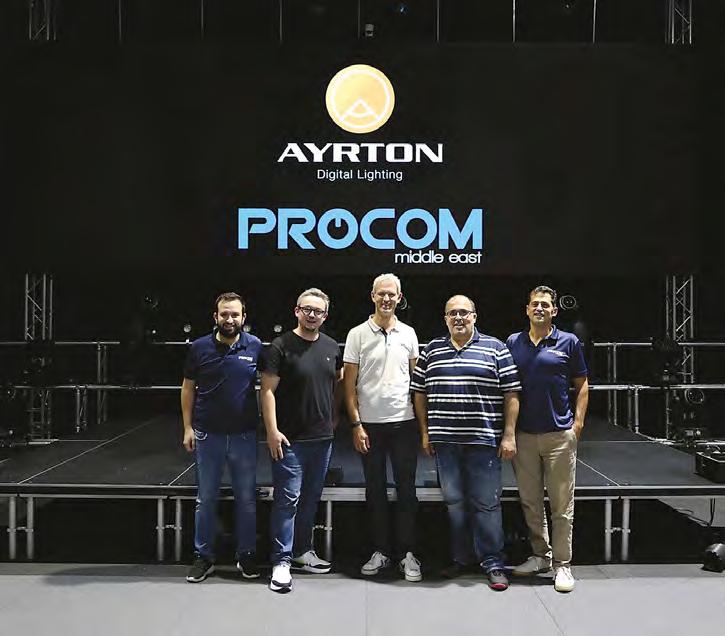
A manufacturer of electric chain hoists and chain hoist controllers for the entertainment industry, Chainmaster has partnered with DWR Distribution to expand its presence throughout South Africa.
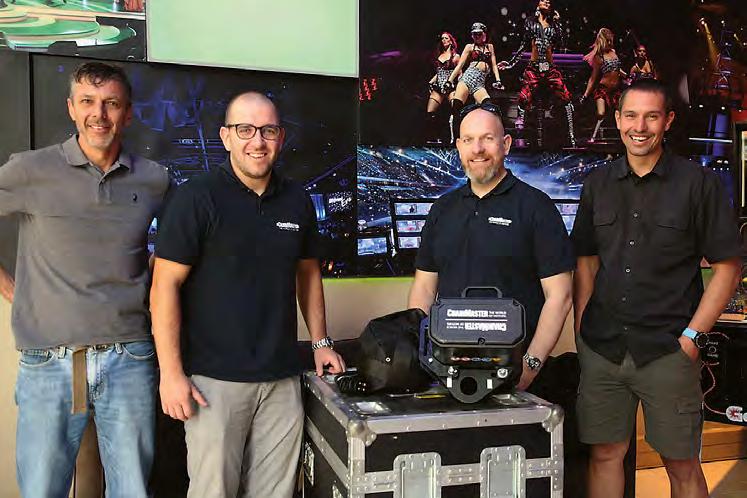

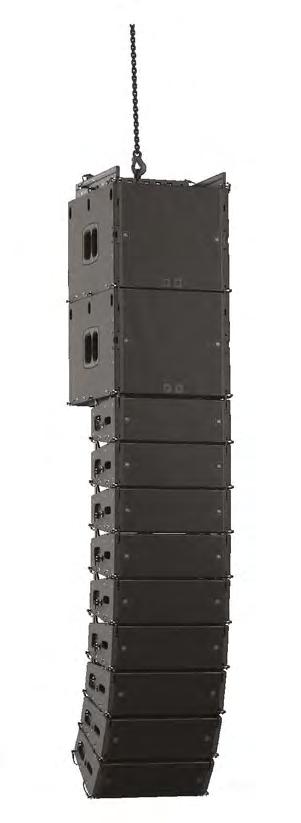
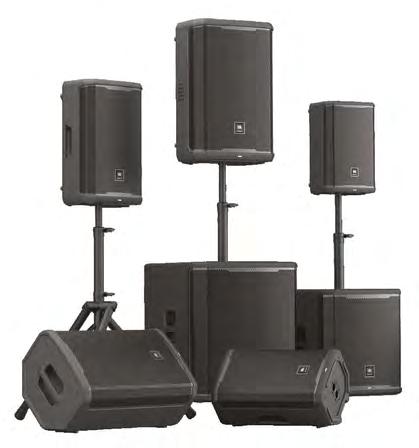

Chainmaster CEO Benjamin Göldner and global brand manager Adam Beaumont recently visited South Africa and, accompanied by DWR’s Robert Izzett, called on numerous local rental technical suppliers.
“While Chainmaster is well-established throughout the world, it’s the first time that the brand will be represented in South Africa and we look forward to a long-term relationship with DWR,” commented Göldner.
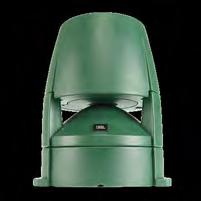



NMK has announced a distribution deal with LG’s digital signage segment across the UAE, with Edge Electronics handling this market in Qatar. This partnership is said to be an advancement towards NMK’s objective of strengthening its video portfolio, in line with offering AV solutions while distributing wellknown brands across the Middle East. “We are excited to add LG into our portfolio and focus our energy on growing its display business within the territory. LG will be a key steppingstone in expanding our offering,” explained Lloyd Platt, business manager at NMK Electronics.


Commenting on the partnership, Jinyong Jang, information display team leader from LGE Gulf, added: “Bespoke solutions with excellent pre- and post-sales service require specialist partners. NMK, a specialist audiovisual distributor serving a spectrum of customers, provides the value-added services we are looking for. They are an excellent fit and aligned with LG Electronics’ ethos of providing cutting-edge technology and customised solutions. We look forward to working with the NMK team across the region.”
In October, Izzett visited the manufacturer’s headquarters in Germany and was delighted to see the high quality of their products. “It was amazing to see the company premises and the dizzying number of hoists that are produced there every year and to meet the whole team,” Izzett explained. “We look forward to welcoming the great team to South Africa next year in 2023 as part of our Open Day and showcasing the new Chainmaster chain hoist product portfolio to everyone.”
Alex Barrand has been appointed to the position of EMEA sales manager at Optimal Audio. An experienced audio professional with a background in audio engineering, design and installation, Barrand cut his teeth on a number of large-scale festival installs before taking up the position of head of production at the iconic Ministry of Sound. In 2011, he moved to a global management position with Pioneer Pro Audio, focusing on product planning and development.
“Opportunities to be involved in helping to develop a brand from its very early stages are few and far between and not to be missed,” Barrand commented. “Optimal Audio’s approach to commercial audio places the emphasis on
K-array has announced the appointment of Simone Pratesi as chief financial officer. In the new role, he will oversee the budgetary and finance policy. Pratesi is a long-time entrepreneur with over 25 years of experience as chief financial officer and investor relator of B&C Speakers, where he has gained extensive experience in the financial field. He is also president of Alboran Hydrogen and CFO of Reco 3.36.
“I am honoured to be part of K-array, an innovation-oriented company with a desire to always do new things,” commented Pratesi. “I’m looking forward to offering all my experience to contribute to growing and expanding the company.”

www.k-array.com
harnessing cutting-edge technology to help deliver solutions that are easy to operate for end
users. That simplicity is essential in the field, and yet all too often seems to be overlooked.
I’m excited to be on board with such a fantastic forward-thinking team.”
Bradley Scott Watson, sales director for Optimal Audio, said: “Alex combines a high level of technical expertise with a thorough understanding of the market, and we are confident that he will be instrumental in helping to establish Optimal Audio in the front rank of commercial audio across the EMEA region.”
In addition, Jamie Gomez has been appointed to the position of global marketing manager for Martin Audio and Optimal Audio. Gomez moves to his new role from within the Focusrite Group, where he was GMM for Focusrite Pro.

www.optimal-audio.co.uk
Web-based project software company, Jetbuilt, recently welcomed Jonathan BreckonRowe to the team as EMEA manager, building on its ambitious global strategy. BreckonRowe, former chief technology officer at industry heavyweight Kramer, brings with him over 25 years of industry knowledge and is adding renewed momentum to Jetbuilt’s product roadmap. Having held key roles in
well-known AV companies, Breckon-Rowe’s appointment is said to be a clear signal of exciting future growth for Jetbuilt.

Based in California, Jetbuilt is an AV installation software company that aims to empower AV, IT and security professionals to manage complex projects, proposals and client portfolios with ease. The appointment of Breckon-Rowe as EMEA manager reinforces the company’s plans to drive international brand recognition and sales.
Breckon-Rowe said: “The capabilities of this software to streamline the installation process and workflow of AV professionals is industrychanging. It’s no overstatement to say that the technology created by Jetbuilt is the future of the professional AV industry. I’m thrilled to be a part of such a transformative mission.”
“We’re delighted to have Jonathan on board,” commented Jetbuilt CEO, Paul Dexter. “His profound experience of AV technology alongside his industry connections have added a new breadth of expertise to the Jetbuilt team and we see this new appointment as a huge step in the right direction for our global expansion strategy.”
d&b audiotechnik has appointed renowned Grammy Award-winning FOH engineer, Stefan “Serge” Graefe, as a senior member of its Soundscape Enablement Team. Graefe has gained 28 years of experience as a sound designer and technologist with a profound understanding of creative approaches to performance and, in particular, the uses

For me, the biggest benefit of using immersive sound systems is that artists can present their music in the way they want the listener to hear it, expanding the possibilities for sound in creating transformational experiences and as a value to our customers.”
“We are delighted to welcome Serge to d&b. Soundscape’s user base and technology continue to advance, and

“I am thrilled to be a part of such a dynamic company, whose work with Soundscape has been game-changing for the sound industry,” commented Graefe. “In my role as a senior member of the team, I will work to expand Soundscape’s reach, which in turn will provide artists, engineers and designers with a scalable immersive audio platform that provides unparalleled creative opportunities.
profit organisation formed to promote and support the AES70 standard for professional applications. “I am very excited for the opportunity to join the OCA board of directors and reaffirm d&b’s commitment to the OCA and the open public standard for media network control,” said Biermann. www.dbaudio.com

Clear-Com has announced the appointment of Andreas Schick to the applications engineering team in EMEA. Schick holds the title of applications engineer II and brings over 10 years of professional experience in the AV industry to his role.
“We are so pleased to have Andreas on board,” said Ernie Addow, senior global applications engineering manager at Clear-Com. “His experience, as well as his prior familiarity with Clear-Com equipment and other intercom systems, make him a great asset. He is a skilled engineer and excellent problem solver, and we are confident in his ability to support our growing user base. Andreas will be based in Germany and will
cover the DACH region, as well as Europe at large.”
“I am thrilled to have a chance to work for one of the market leaders in comms worldwide,” said Schick. “I am looking forward to exploring new intercom applications and supporting Clear-Com customers in their endeavours.”
www.clearcom.com
Williams AV has named Norhisham (Nori) Iskhandar as the new international technical sales manager for the Middle East. Iskhandar has extensive experience in the audio and video industry, working for companies such as Blackmagic Design, Sennheiser and Void Acoustics.
“Nori brings a depth of AV market knowledge and a wealth of experience in product development and business management. His combination of experience along with his passion for customer success is what makes Nori a great addition to the Williams AV team,” said Per Persson, VP of international sales.
“I’m passionate about building long-term customer relationships and being a resource for my customers to find the best technology solution for their projects. I am looking forward to helping channel partners in the

Middle East grow with Williams AV’s assistive communication products,” said Iskhandar.
Genelec has appointed Kati Pajukallio as AV business manager as it looks to drive growth in international markets. Pajukallio joined the loudspeaker manufacturer last year, bringing with her a wealth of AV industry experience having previously worked in marketing communications roles for Electrosonic and Audico Systems.
As AV business manager, Pajukallio will lead Genelec’s global AV Installation

ROE Visual has announced the appointment of Khalid Sweidan as vice president of sales in the Middle East and Africa. True to its philosophy of offering local support, the expansion of its sales staff with a locally based and native Arab-speaking sales executive, ROE Visual is tapping into the growing opportunities in the MEA region. The subsidiary ROE Visual MEA sales office will offer regional support and service,
business, helping to expand the company’s international presence by developing its AV portfolio and partner network. “Since the launch of our Smart IP-networked loudspeaker family in 2019, our profile in the AV market has grown significantly and we’re totally committed to further expansion,” said Genelec business development director, Ken Kimura. “The experience that Kati brings to the company will help us to significantly drive our global
now is the right time to have a formal presence in the region to be close to our customers and to be able to cater to their service requirements. I feel very excited to be a part of the ROE organisation, which is fully committed to growing and capturing business in the MEA region,” said Sweidan.
“With the massive growth in high-end video display solutions in the Middle East,
www.roevisual.com
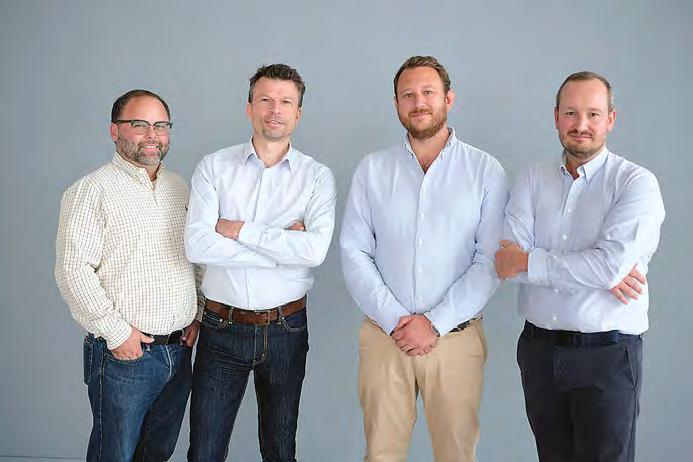
L-Acoustics has unveiled the creation of new sales organisation to help drive its ambitious vision that will be focused on sales strategy, business development and building territorial sales channels. Under the general management of L-Acoustics CEO Laurent Vaissié, the new team will be split across three divisions: Sales and Sales Operations, Business Development and Strategy Leadership. The new organisation emerges following the retirement of executive director of business development Jochen Frohn who, for the last 14 years, set the vision for the global sales team.
Heading up the Sales and Sales Operations division, Jacob Barfoed has been promoted to
of sales APAC, and BJ Shaver, director of sales Americas, and will continue to support EMEA sales operations until L-Acoustics finds someone to fill his previous position.
Nick Fichte has been promoted to director of sales for L-Acoustics Creations. Newly integrated into the global sales division, Fichte will spearhead the global sales strategy and development of the growing Creations network of certified integrators, driving growth in the residential, marine and architectural markets.

Within the Sales and Sales Operations division, Oksana Mudrak moves into the role of global head of sales coordination. www.l-acoustics.com

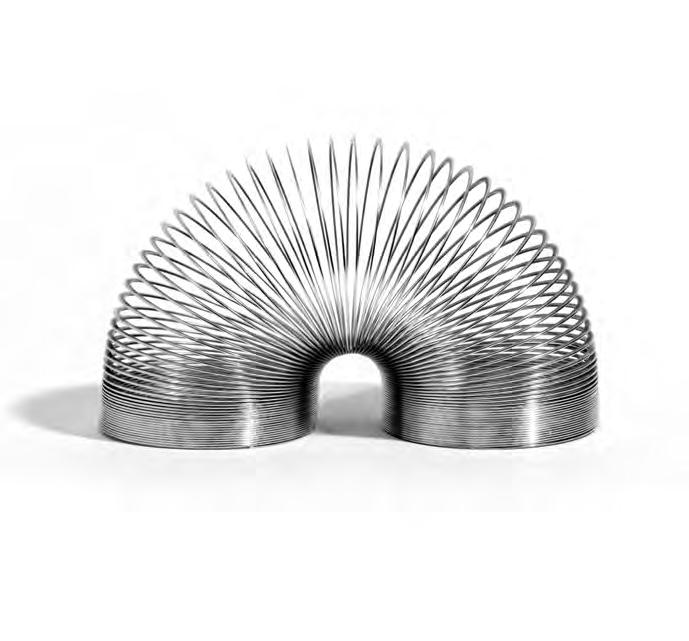
Tell us about your background and some major events you have managed
I began as a sound engineer for radio and TV, before moving into outside broadcasting in charge of the sound, video and satellite uplink for a French company. One of the major

projects I worked on there was the Tour de France cycling race, where everything needed to be wireless as the whole operation was constantly on the move. After that, I was spectrum manager for the 2012 London Olympics, and it was on this event that I first understood frequency issues don’t just come from microphones or video cameras. A lot of radio equipment was also used to track the race results. After London 2012, I worked at the Sochi Winter Olympics as a broadcast engineer and was senior spectrum manager at Baku for the first European Games in 2015 and the 25th Asian Games in China. Most recently, I was spectrum manager at Dubai Expo 2020.
I was heavily involved in developing the strategy for managing spectrum allocation across the entire 2,000,000m2 site on behalf of Alkira DWC, which was particularly interesting as it’s not just a sporting event taking place over a couple of days. In addition to being a very unique type of event, when you travel you quickly encounter differences
in various locations: new regulations, different working practices and approaches to be aware of.
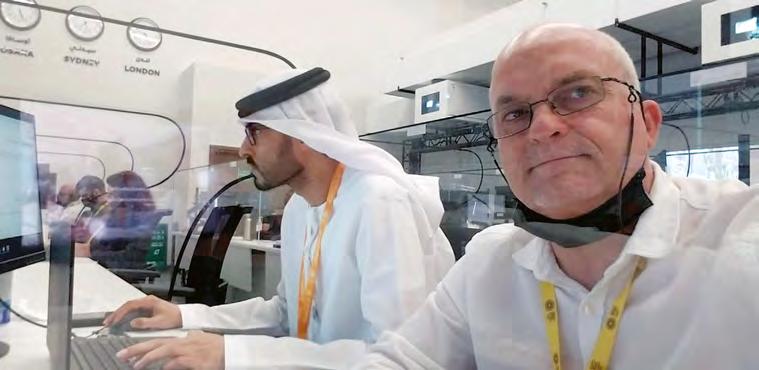
It was a very uncommon event and the first thing to take into account was the length. Planning is everything and you can’t break your spectrum plan just to appease one person or client. You also have to take into account who is coming; Expo was for everyone. This is different from a football match where only rights-holders are present. Furthermore, the location, a single site with everything all in one place, was also very unusual. The Olympics are typically spread over more than 30 sites.
What were the main considerations when designing the plan?
I decided to divide everything into two 12week periods, with a full month beforehand

As the spectrum manager for major events including the Dubai Expo, Alkira’s Jean-Christophe Pakel is tasked with ensuring interference isn’t an issue
for the start and pre-event. The interesting part becomes how you can reuse spectrum. You’re dealing with a variety of different channel sizes and have to take into account
The first thing I did was make a frequency plan for the specific audio services and, inside it, divvy up the spectrum. For example, microphones ran from 470–800MHz.
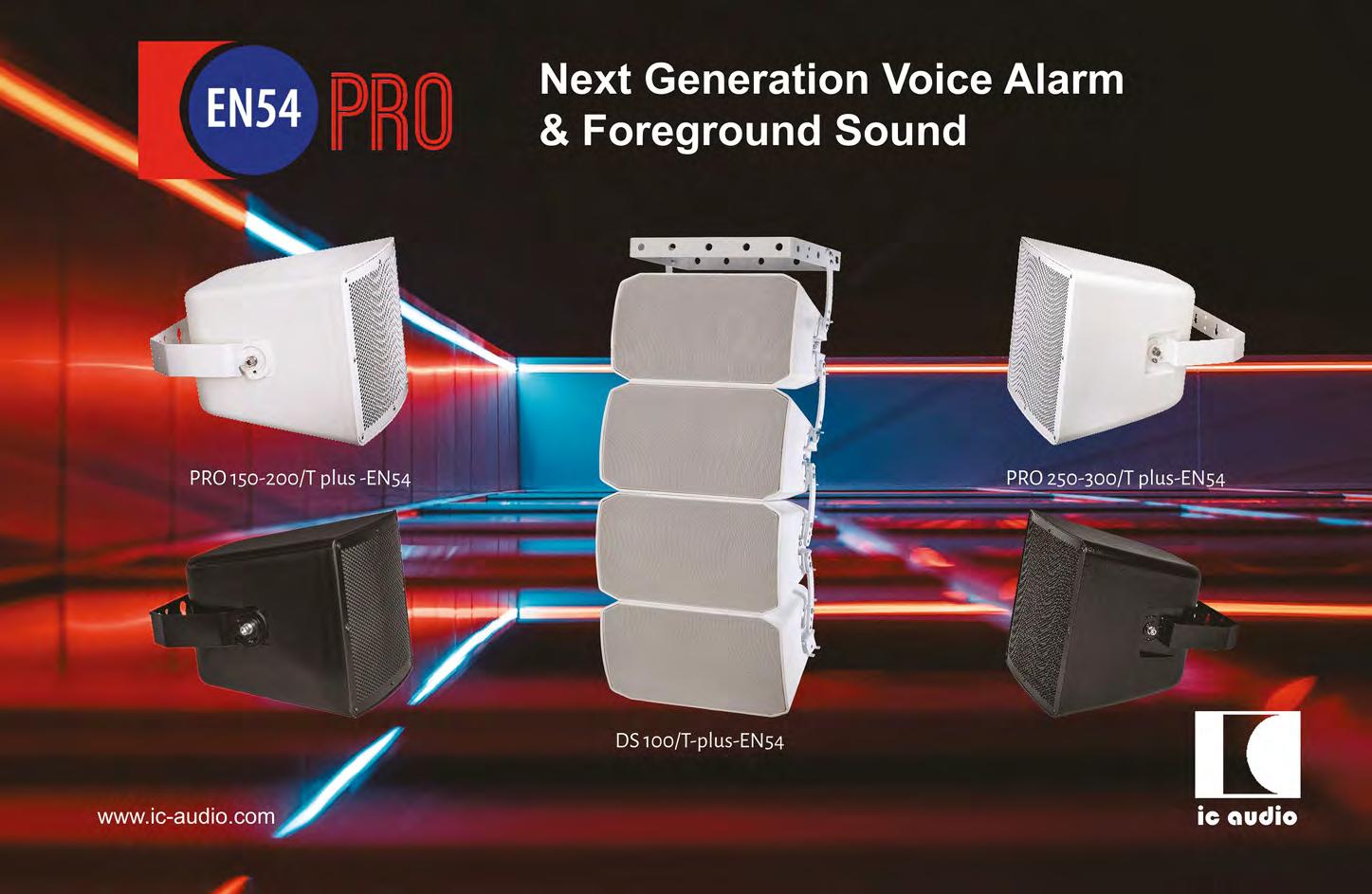
What were

once Expo went live?
There were many kinds of users occupying spectrum, and some are more important than others. ENG crews, for example, really just needed to get in, do their interviews and get back out. I was able to pack 80 crews into just 8MHz of spectrum, and while normally you would tell me this wouldn’t be possible in terms of interference management, if the crews face serious interference, they will opt to plug-in instead. This approach meant that I could focus on the main goal of protecting the spectrum around important gigs, ceremonies and events. Managing an event of this scale, it’s important to know how much you can bend the rules.
There were three main stages, and another at the Sustainability entrance. Rather than split it per venue, I made an overall spectrum plan based on distance. If something was happening on the Jubilee stage, the next allocation had to be at least 250m away. These were very heavily congested environments though, so it was important to keep the channel spacing to no less than 100kHz, which helped to monitor and search for offending frequencies without worrying about sensor sensitivity.

At times when there was lots of interference happening, especially during sound checks, the crews weren’t allowed to scan and deploy RF themselves. If they wanted fresh
frequencies, they had to refer solely to a sheet defined by us. In an emergency they could scan, but they had to quickly return to their original frequency. With many artists bringing in their own gear, sometimes you did have to accommodate, but if there was an issue the engineers had to escalate it with us. For a big stage like Jubilee, we left some frequencies spare as a backup.
No, so on your plan you have to segregate everything. For example, the “guard band” is more important to IEMs than microphones; you can actually be quite relaxed with mics (but at the same time need to anticipate a lot of things). I limited both to 50mW power and if more was required they had to ask.
Unfortunately not. That is a characteristic of the show microphone and, as I don’t have the time to study the parameters of every piece of equipment brought in, the rules have to stay the same for everything. It’s for this reason we use very strong guard bands. It’s better to make your plan stronger so that you never reach its limit and are forced to cram everything in. On a six-month event, rules have to be standardised and planned well in advance. Success comes down to preparation.
OVER MORE THAN A DECADE, COKE STUDIO HAS become a big hit in Pakistan. Now in its 14th season, the TV programme is not only broadcast throughout the country but has also gained somewhat of a cult following abroad. The format takes established and emerging artists, fusing them to create musical concoctions blending regional and western music.
The show developed by Giraffe Marketing Pakistan has proved so successful that after the end of the latest series, plans were made to develop it into a touring live show. The first outing of Coke Studio Live saw thousands of fans fill the Coca-Cola Arena in Dubai to finally see their favourite acts from Season 14 in person. “I’m from Pakistan myself, so this was a particularly exciting project to work on,” explains Flair Event Services’ Sheikh Asfand Aly. “It was the first time they’ve taken the format outside of the studio, and Flair played an instrumental role.”
“During the previous events season, Flair was awarded multiple tenders at the Coca-Cola Arena; out of the 58 live events that were held, we executed 42,” adds Flair managing director, Sameer Rahman. “As a result, we’ve built a strong track record with the management and many of the frequent promotors.”
Initially tasked with handling technical services for the event, Flair’s passion for the platform saw it become increasingly involved in creative elements as discussions progressed, ultimately leading to the introduction of a completely new lighting design. “We were given the opportunity to tender as one of the three main suppliers for the arena,” furthers Rahman. “There were very specific requirements that included previsualising everything to assess the look and feel of each song. This worked hugely in our favour as we were the first company regionally –Flair and our sister company Stage FX – who invested in Depence² previsualisation 3D rendering and show control software back in early 2020. Throughout lockdown, this is what our teams had been busy honing their skills on.”
Flair’s experience working at the arena also gave it an edge when it came to the stage design. “The client initially shared a 2D drawing of their preferred stage idea. Our technical director and I reviewed it and, based on our experience with sightlines and typical seating arrangements, asked if we could also propose an alternative. They were wary that they’d never done a live show like this before and so were open to ideas.”
They quickly came up with a few initial concepts on pen and paper. “When we were happy with those, we moved onto Vectorworks, the software we use for managing workflows and general previsualisations,” explains Rahman. “We created something that retained all the elements of the original, but was much beefier and more impactful, while keeping the arena’s constraints, sightlines and the seating properly in mind. It really exceeded the client’s expectations.”
Key to achieving Flair’s revised design in the most efficient way was the choice of luminaires, which revolved heavily around Chauvet Strike Blinders, Robe’s MegaPointe, Robin LEDBeam and Spiider fixtures and Claypaky Stormys. “There were rockbased songs, but also a lot of ethnic instruments and even some melodic dance-along-type songs,” says Rahman. “This required many different moods and we wanted to give everything a bit of a retro feel. One fixture that works extremely well in the arena is the Strike One Blinder. It’s a big, chunky LED-based fixture and is great for creating that rock-and-roll ACL punchy effect.”
“For the moving fixtures, we chose Robe’s MegaPointe specifically for its hybrid capabilities,” adds technical director Marno Snyman. “It can do basically anything if you use it correctly – massive gobo looks, huge breakups, wash-like effects or an extremely tight beam. Given the difference in genres, it was the perfect use case for a true hybrid fixture. Specifically, we needed a big wash look and lots of colour onstage, which we could achieve quite easily with MegaPointe.”
All in all, the lighting rig comprised 31 Chauvet Strike One Blinders, 32 Acme bl200 and 18 Claypaky Stormys. For moving lights, the team called on 40 MegaPointes, 48 Robin LEDBeam 150s, 42 Spiiders and 18 Martin Mac Viper Performance.


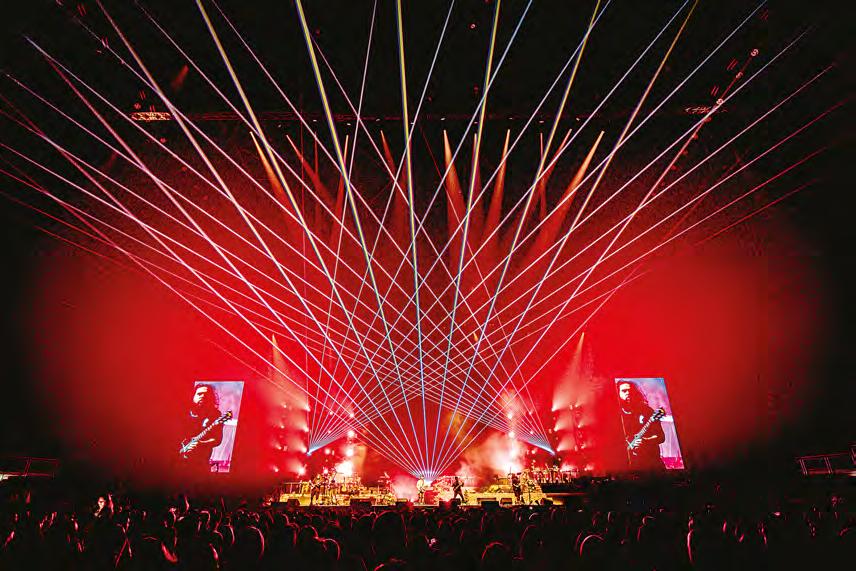

Additional effects from Stage FX included eight MagicFX CO2 Jets, eight MagicFX Flamaniacs and six Microh Titan RGB.
While the lighting was undoubtedly the main focus for Flair from a creative standpoint, the team’s technical services extended to practically all aspects of the stage setup. 178.5m2 of the company’s new InfiLED P3 LED screen was erected at the rear of the stage. Powered by four Novastar MCTRL 4K LED controllers, content was fed from a pair of Resolume Arena media servers over Analog Way HDMI over Fibre Extender 4ks with Barco’s S3 and ImagePro 4K providing additional image processing.
“We created the canvas and provided a pixel map which the client used to create content to the right scale,” notes Rahman. “We received details of the colours used and a mood board of what the content was going to look like, which was essential for building our lighting design around.”
For audio reinforcement, the venue’s in-house JBL VTX line array was called on, supplemented with additional fills from d&b Y8, Y12 and Y-SUB cabinets. The system was managed by a DiGiCo SD7 and SD-Rack at FOH, alongside an SD10 and SD-Racks at monitor world. Monitoring for the artists onstage was via 12 d&B M4 wedges in combination with 30 channels of wireless IEMs spanning Sennheiser SR 2050, EK 2000 and G4 systems.
A large selection of wired and wireless artists mics were also available. These included Sennheiser 6000, Shure Axient and Shure ULXD for wireless, with the option to be fitted with DPA d:facto 4018 capsules. Wired models included Shure Beta 91A, Beta 52A, SM58, SM57, SM81, Neumann KM184, DPA 4099 instrument mics and DPA DC4099 drum clip mics, with Klark Teknik DN200s and Sennheiser MKH 416s capturing ambiance around the drum kit. Eight Riedel Bolero wireless intercom panels were deployed for team communication. “From a technical perspective, the event was like a music festival, with each artist having their own set of audio requirements,” explains Rahman.
Having initially requested a different mixing console, one which Flair also stocked in its inventory, the team
recommended upgrading to the SD7. “They told us they would love to, but didn’t know anyone in Pakistan that could operate one,” the managing director shares. “There isn’t a single SD7 in the entire country, but we assured them of our full support.

“Our team is very used to doing these larger scale events,” notes Snyman. “Obviously, great lighting and video is essential, but if it


plans are already in place for follow-up concerts. Flair’s expertise at the Coca-Cola Arena has positioned it as the preferred partner for those. “Based on the success of this show, there’s clearly a demand for more,” concludes Rahman. “There are a lot of discussions in the works right now, with dates and timings yet to be determined.

I think our team has already exceeded
 A DiGiCo SD7 takes pride of place at FOH
Robe’s MegaPointe was reportedly essential to creating the variety of differing moods
A DiGiCo SD7 takes pride of place at FOH
Robe’s MegaPointe was reportedly essential to creating the variety of differing moods
THE MIDDLE EAST HAS BECOME FAMOUS FOR OFFERING the very best of the best, but developing a world-class recording sector is still on its list of accomplishments. However, if there’s one thing that those in this part of the world know how to do well, it’s making a statement.
LP.ME recently opened its doors up on the 30th floor of a high-rise in Dubai’s Jumeirah Lake Towers. Quite literally head and shoulders above the competition, the new studio space is packed full of a selection of world-class equipment that has long been a dream of LP.ME CEO Daniel Romanovskyi and the rest of the team behind the project.
“When we discussed the idea of building these dream studios and rooms, I always said that what we were making had to be either zero or 100%; either we made the very best and most exclusive studios in every possible way, or we should not even try,” says Romanovskyi. “I’m proud that we have managed to defy all odds and build what is arguably one of the bestsounding studios in the world.”
Something of this calibre hasn’t risen from the ground overnight. While a long-time ambition of the CEO, the slowdown in business activities around the pandemic afforded the opportunity to finally set wheels in motion. The desire to create the absolute best space possible infused all aspects of the design, not only in terms of equipment but down to the décor, where finishing touches convey a unique style.
The ambitious design drawn up by Kevin Boujikian, managing director of Dubai distributor Provision AVL, and Eddy Jazra, head of the audio department at LP.ME, would see all the 30th floor reconfigured to house three main recording suites – one flagship space purely for stereo production and the other two boasting full Dolby-certified Atmos capabilities. Linking the space together
to create a production hub is a fleet of smaller DAW-based studios providing scaled-back equipment setups. The icing on the cake is an inhouse video production studio and team that provides bidirectional AV communication between any of the rooms, along with the ability to livestream production sessions.
Construction on LP.ME started in earnest in late 2021, battling challenges beyond anyone’s control such as supply and
attention can turn to the very best equipment solutions on the market. It wasn’t long before the CEO contacted Boujikian to enquire about Solid State Logic’s latest 48-channel Duality Fuse console for the main stereo room.

“It was the request for the Duality that kickstarted this entire project,” recalls Boujikian. “What started as one console quickly led to multiple rooms, a live room and a recording room,
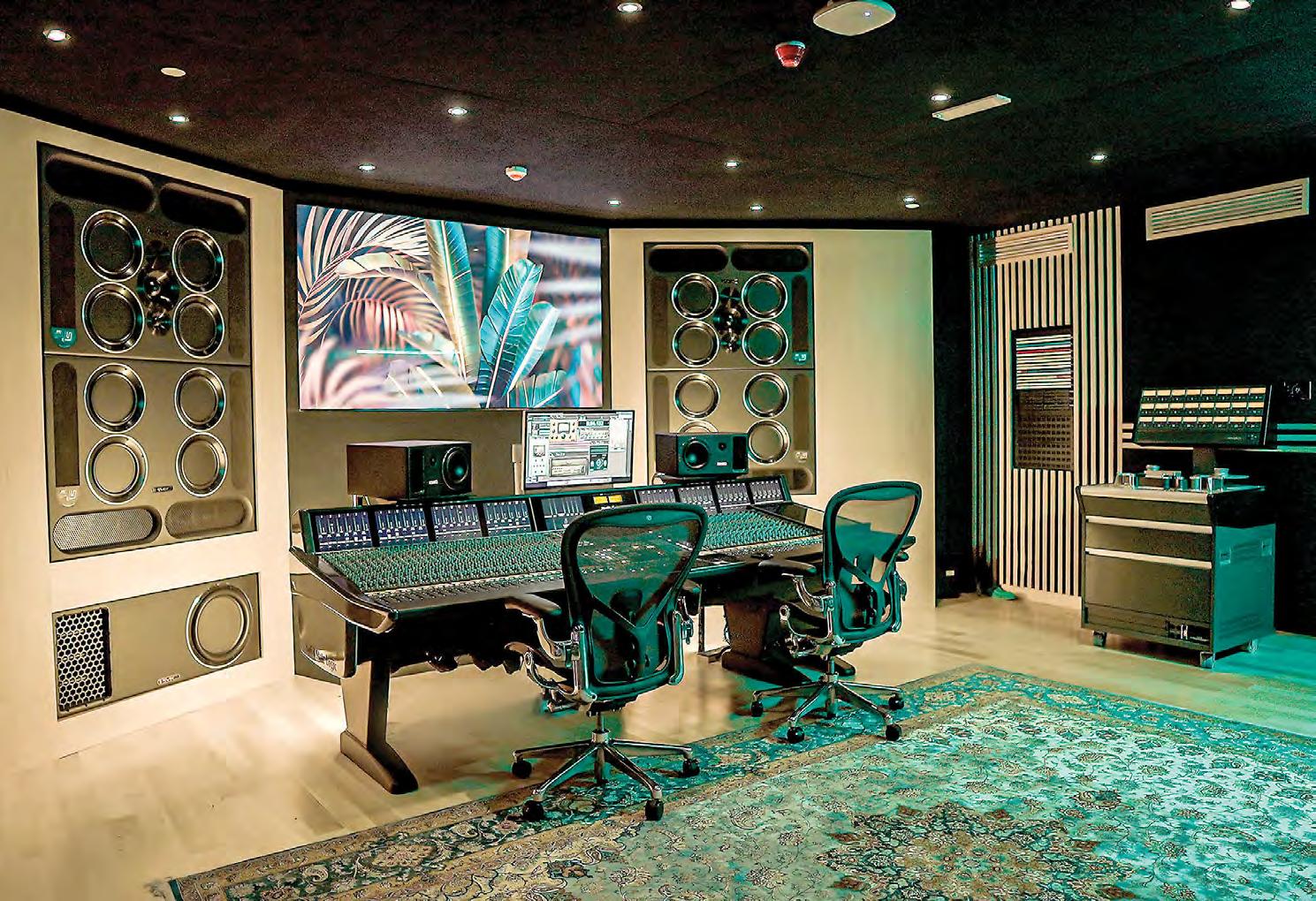

enter] comprised the stereo studio, four producer rooms plus a chillout area and offices. During phase two, plans quickly started growing to include a video department for inhouse production, and finally the third phase would be the two Dolby Atmos suites.”

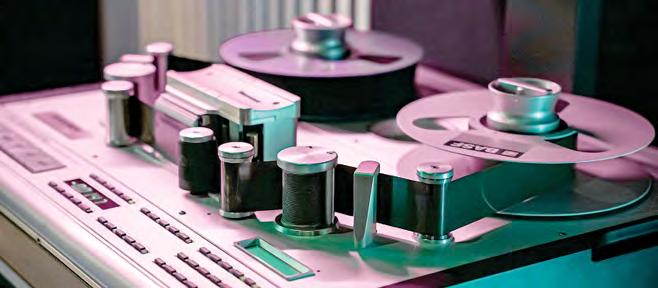
While the budget was not the overall concern with this project, it wasn’t simply a case of buying the most expensive equipment on offer, Boujikian continues: “The goal is meeting world-class standards by integrating the very best equipment: legendary outboards and gear, everything class-A and the cream of the crop. This extended right down to the furniture, such as the Fendi table in the meeting room, which was delivered all the way from Italy, and was quite a struggle for 16 people to get up onto the 30th floor.”
That chance phone call quickly led to Boujikian taking on the role of project director for the entire studio build and becoming intimately involved in all aspects. “It happened organically as the project progressed,” furthers Boujikian. “Ultimately, we’ve been responsible for the complete project management of the construction, sourcing of all the outboard equipment, acoustics, cabling design, AV design, video design, lighting design, even furniture and interior design. The idea was to create one of the most exclusive and best studios in the MENA region, and so of course I was very excited to be a part of everything.”
There are a number of attributes that make LP.ME’s stereo room special. Front and centre is the pairing of the 48-channel Duality Fuse console with a quartet of PMC’s flagship QB1-XBDA monitors combined with a pair of PMC’s BST “Beast” subwoofers; a setup found in only a handful of studios around the globe, like Interscope and Netflix studios.
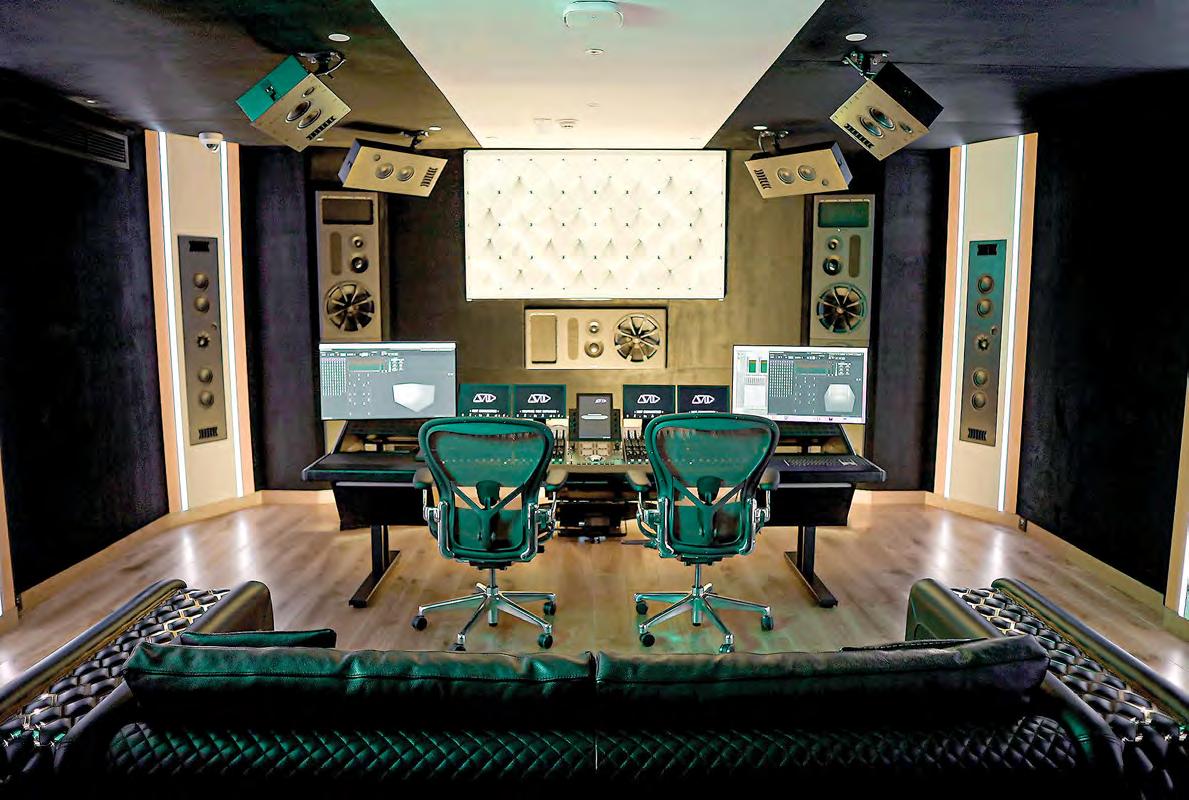
The Duality Fuse pairs with an Avid MTRX HD audio interface and Pro Tools HDX Core running Pro Tools HD off a 28-core Mac Pro workstation. Nearfield monitoring for a contrasting flavour comes from a pair of PMC Six active studio monitors. A Burl Audio B80 mothership brings analogue audio into the Dante domain in combination with an Antelope Audio Galaxy 64 providing Dante I/O for recording onto either a JoeCo BBR64Dante recorder and Avid Nexis Pro 40TB storage system.
“It’s more than just a stereo room, it’s an experience,” says Jazra. “The sonic image is so clear you could spend hours in that room without your ears being bothered, even at high volume levels. The PMC Beast subs are limited at 15Hz but have the potential to go even lower. But our plan isn’t to cause an earthquake.”
A common theme throughout LP.ME is the sporadic appearance of iconic pieces of audio history, such as one of a
very limited number of Sennheiser HE-1 Orpheus headphones decorating the corridors between the Atmos suites. While some are purely for show, the majority are fully functional and actively encouraged for use. In the main studio, this means a healthy selection of vintage outboard equipment on-hand: two original Fairchild 670s, four Urei 1176s and multiple 1178s, the full range of Tube Tech outboards as well as Universal Audio vintage LA-3A and LA-2A compressors. For the true audio purist there is even a choice of two analogue tape machines to track with – a rarely used Studer 24-channel multitrack tape recorder, which had been used to make safety copies for artists including Elvis Presley prior to being shipped out to Dubai, and a stereo two-channel Gold Edition Studer recorder. Similarly, the selection of microphones in the stereo studio are heavily influenced by vintage classics and include the likes of Neumann U87, M 149, TLM 170R and KM 184, AKG C12 Twin, Schoeps Colette Series and Sony C-800G
The two Atmos suites boast setups capable of catering to the ever-evolving world of immersive (spatial) audio productions. The largest boasts an 11.1.6 speaker configuration of three PMC BB6-XBDA speakers handling the LCR main speakers, eight CI40s for the rears and sides, and six CI65s for the ceiling-hung overheads. A pair of PMC BST subwoofers take over for low-end
The slightly smaller second suite is built around a 9.1.4 configuration of three PMC MB3-XBDAs and 10 CI65s paired with four PMC8-2 subwoofers. Control in each Atmos space revolves around Avid S6 M40 modular control surfaces that pair with Pro Tools via an Avid MTRX HD offering multiple mic-line feeds.
“Provision AVL approached us in 2021 and laid out the vision for the studios,” recalls Maurice Patist, head of sales, pro global studio products at PMC. “The attention to detail and the absolute desire to do it right allowed us to create the right combination of proper room design and acoustics, combined with the PMC monitoring systems to maximise the performance of the control rooms. Being able to build two high-performance Dolby Atmos
MB3-XBD-A models was an incredible opportunity. You’ve got to e rooms ‘right’ to allow the speakers to perform to its best

While greatly stripped down from their bigger counterparts, the four producer rooms nevertheless offer impressive setups for their size. Here, PMC6 speakers take over main monitoring duties, with the largest producer room also housing a pair of PMC IB1S-AIIIs for contrast. Pro Tools Ultimate runs on Mac Studios with 27-inch Mac screens and 75-inch Samsung Frames and pair with Antelope Audio Galaxy interfaces that can be used in combination with outboard gear through the Switchcraft patchbays that connect with an SSL BUS+ and Neve 8816.
As you would expect for a studio of this pedigree, audio is fully interconnected via the Dante network, allowing engineers to pick their preferred space or even work in tandem on the same project concurrently from multiple suites. This is aided by the inhouse NewTek Tricaster TC2 Elite video production platform formed from 16 NewTek 4K PTZ cameras and a raft of Samsung 85-inch 8K screens and 75-inch 4K Frames spread throughout the studio. The inhouse video team can provide full-scale video production for short film and music clips, thanks to an impressive video arsenal led by an ARRI Mini LF cam. With such a large investment, protection against the unexpected is an important consideration from the outset. Once again, LP.ME has taken the proactive approach. “We’ve
into every room and corridor – which combines both gas and water. In the event that it is needed, gas is released to extinguish any potential source of heat early without harming the expensive equipment within. But in the event there is an actual fire and the system senses high temperatures, water is delivered instead. That was very new and not something we’d worked with before. One of the challenges was factoring in all the extra space it required, such as lowered ceilings to accommodate the pumps. We had to dedicate an entire room just to house the main system components, but the extra protection offered makes it fully worth it.”
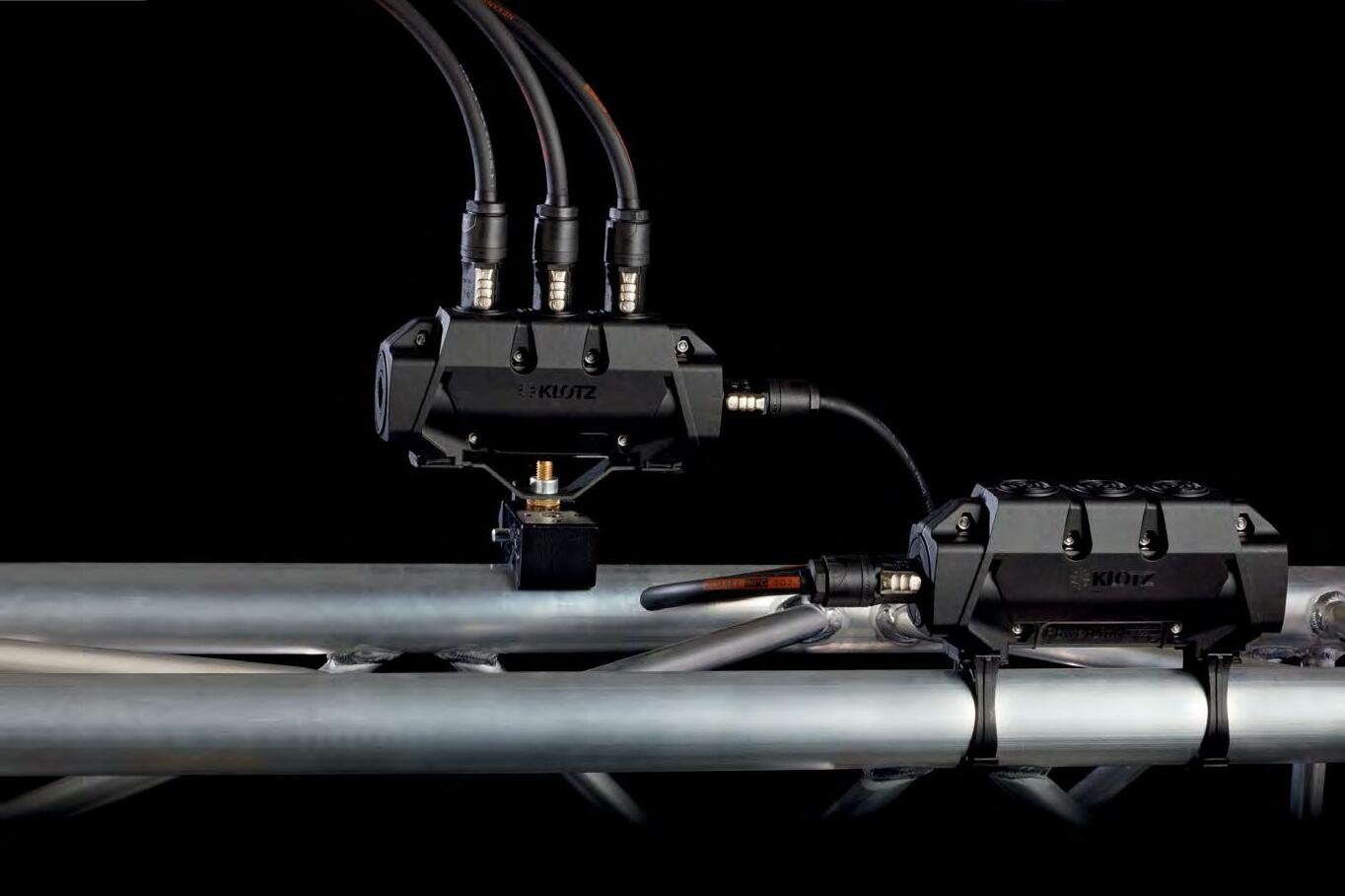
Given that the world was emerging from a global pandemic in late 2021, the fact that LP.ME has risen from nothing in just over 12 months is testament to the hard work and dedication of all involved. “The equipment was being drip-fed over the course of 6–8 months,” recalls Boujikian. “One of the highlights for

me was when Maurice Patist from PMC and Brian Pennington from Dolby Labs travelled over to inspect and commission the speakers as well as conduct a complete review of the audio design. These guys have worked on the world’s very best studios such as Abbey Road and Universal Studios, and they had nothing but praise for what we’d achieved.”
“For over 20 years I have been privileged to go around the world commissioning and calibrating many studios,” adds Patist. “Being involved in this ambitious project from the early stages of design and then being there to see and, more importantly, hear the final results has been an incredible experience. The commitment from the team and owner to building world-class studios in Dubai has given us two incredible performing Dolby Atmos mix studios combined with a stereo control room, with all the performance and gear an engineer can wish for. That, in our opinion, easily matches the very best.”

Primed to open its doors any day, the excitement of the LP.ME team is palpable. “Music has shaped cultures and societies throughout the world; it’s passed down from generation to generation within families and communities, from educational needs to cultural festivities,” explains Amna Ahmed, creative director at LP.ME. “It’s the one language everyone understands. And through this language, we at LP.ME envision uniting the world with peace, harmony, creativity, arts and culture. We have a number of very interesting initiatives in this regard planned for when the studio has opened.”
www.lp.me www.pmc-speakers.com www.provisionavl.com www.solidstatelogic.com
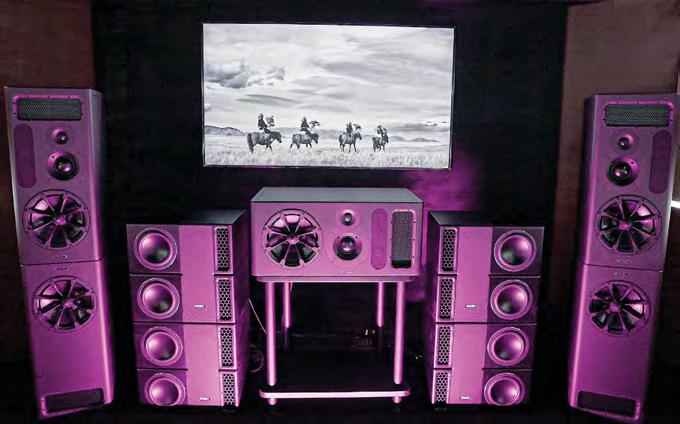
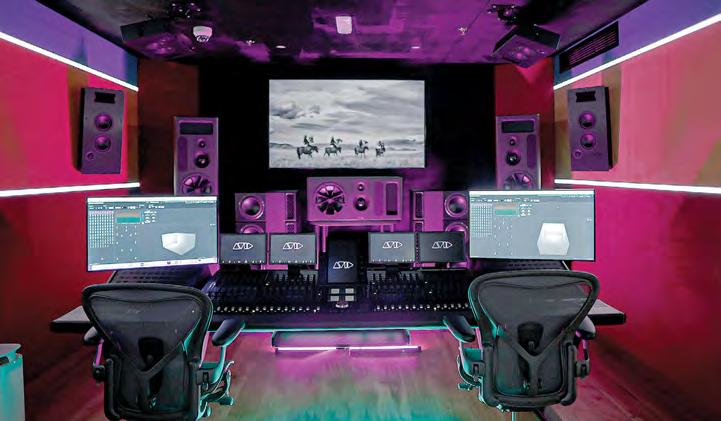

AS THE HOSPITALITY MARKET REMERGES FROM THE shock of the pandemic, it’s led to the establishment of several new eating and drinking hubs in Dubai in a bid to lure travellers to different parts of the city. One of those to spring to life is Palm Jumeirah’s Palm West Beach. Over the course of the last year, a handful of unique eating and drinking establishments have emerged on what is often considered one of Dubai’s most beautiful beaches.



At the far end of Palm West Beach lies Surf Club. Describing itself as out-of-the-box, the outlet brings a particularly relaxed vibe to the promenade – one that extends throughout the interior walls. Daytime guests wishing to sun themselves by the shore have the option of private cabanas and sun loungers with exclusive access to the beach. Then, by night, the action shifts back to the Sundowner Cocktail Bar behind, where guests can dance into the night under the stars, against the backdrop of the Dubai Marina and Ain Dubai.
Music, and the general ambiance of Surf Club, is key to creating the right atmosphere. “The management was looking for a premium sound system as they wanted to start attracting more and more high-end international DJs to the venue,” explains Andy Williams, managing partner of audiovisual specialist Em-Tec, a company responsible for outfitting scores of Dubai’s best F&B outlets over the last 20 years. “They approached us to come up with a solution which not only gave high-quality sound throughout the venue,
but also helped minimise disturbances to the neighbours. The whole of the Palm is residential apartments and hotels, but there are also a lot of F&B outlets situated on the beachfront, so sound leakage is a big concern in the area.”

Em-Tec devised an audio design working in collaboration with an acoustic technician, who helped to specify materials to better contain sound dispersion within the venue. “We were approached because the client specifically wanted Funktion-One,” Williams adds. “They’d heard it at other venues and really liked the type of sound it creates.”
Em-Tec quickly put its design into action, installing a line of four Funktion-One Res 2 cabinets and Br218 bass-reflex double 18-inch subwoofers lining the front of the bar and firing out to sea. These are augmented with fill cabinets comprising 12-inch F1201s, 10-inch F101s and 8-inch F81s distributed around the beach cabanas and dining tables, together with ultra-compact 5-inch F5 cabinets lining the wall against the promenade. Additional Sb8 and Br218 subwoofers provide low end throughout the space where required. Power for the entire setup is derived from Full
Fat Audio FFA-10000, FFA-8004, FFA-4004 and FFA-2004 amplifiers in tandem with an XTA processor.
To further aid in limiting unwanted dispersion of the lower bass frequencies, Em-Tec created a series of concrete outer enclosures in which to integrate the subwoofer cabinets.
“These worked as an extra measure to help limit any distribution from the back of the subwoofers,” notes Williams. “They are slightly overkill but it all helps to control the sound, which the authorities are very strict about. Bass is the thing that travels the furthest and, while not much energy comes out the back of Funktion-One boxes, demonstrating to the authorities that we take the matter seriously was important.”
While great attention was paid to sound dispersion in the planning phase, the venue’s location on the beach simplified the physical installation. “Given our location, we didn’t have issues with cabling and the actual installation was quite straightforward,” says Williams. “Power is always a consideration in that part of Dubai, so we had to make sure everything was as efficient as possible with the amplifier processes.”
Upon opening to the public earlier in the year, the success of Surf Club quickly took its management by surprise. Busy nights now frequently see more than 1,000 partygoers lining the beach, which quickly forced an audio upgrade to match. “The place gets so unexpectedly busy now that we have replaced the Res 2s with Res 4s [Resolution 4E-CP],” offers Williams. “Not only are the bigger speakers capable of a higher output, they are also more controlled behind the cabinets because of their 45° dispersion, which further helps with controlling leakage outside the venue. Ninety percent of the system is firing straight out to the sea.”
“At night, they really crank up the levels in the beach area and the system really pumps,” concludes Em-Tec project manager Armand Bulder. “Despite this, leakage at the rear of the venue heading towards the hotels is practically non-existent. I think we did a great job of managing to keep everything wellcontained.”
www.emtec.xyz www.funktion-one.com












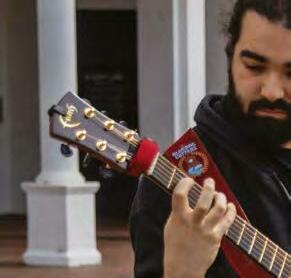
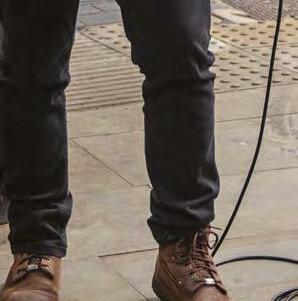

EVERSE 8’s superior sound quality, output capacity, and wide, even coverage is unmatched by any other battery-powered loudspeaker available today. The difference is clear to hear via an 8” woofer mounted using EV’s patented SST (Signal Synchronized Transducers) port design, and a high-output titanium tweeter mounted onto a custom constant-directivity waveguide. System reliability is verified with extensive music abuse and endurance testing. Decades of pro-audio know-how delivered in a super-portable package.



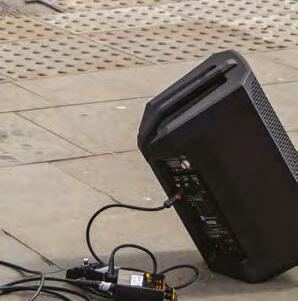
EVERSE 8 is powered by a custom-designed high-capacity Li-ion battery pack, fully optimized for audio use and providing plentiful power for up to 12 hours of run time. Protection circuitry reduces the risk of your battery discharging to such a low voltage that it can no longer be recharged – for example, after long periods in storage. Tool-free screws make removing the battery pack effortless. Uncompromising sound quality, unplugged.











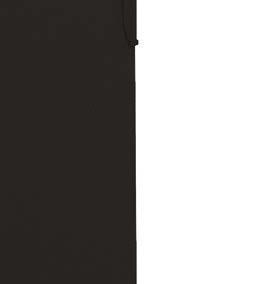

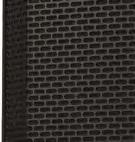

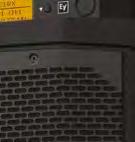

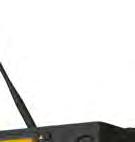

















In combination with the rugged polypropylene enclosure, use of the included weatherized input cover allows EVERSE 8 to meet the IP43 rating (water resistant for splashes and light rain) when running on battery power and while Bluetooth® streaming. Built-in feet with no-skid rubber pads ensure the system stays put. Bring EVERSE 8 outside for busking, marching band practice, or the backyard BBQ – wherever you need a PA, whatever the forecast.

while accompanying soundscapes can create nostalgic ambiance while also providing an educational narrative.
Egypt’s Ministry of Tourism and Antiquities tasked Cairo-based systems integrator Quality with all aspects of AV integration throughout NMEC, working under the vision of architect Dr El Ghazaly Kesseiba. The various exhibits and displays are all accompanied by multimedia resources that include lighting, audio and digital signage systems that are intended to provide different levels of interpretation given a visitor’s background knowledge and expertise.
“Through a deep understanding of the museum scenario, visitor experience and other architectural aspects, as well as our knowledge of state-of-the-art AV, we interpreted the architect’s vision in a creative fashion while always meeting the criteria of the museology,” explains Quality managing director Mohammad Attia. “We’ve been involved with many complex projects in the past –airports, stadiums and very high-profile government buildings such as presidential palaces; however, it is always the museums that are the toughest and require the most diversity in terms of engineering and understanding. Our job with the AV is all about creating an experience. You want the exhibits to be interactive, but there’s a thin line before you start to detract from them.”

WHILE MANY EYES ARE FOCUSED ON THE IMPENDING opening of the Grand Egyptian Museum (GEM) at the base of the Giza pyramids, it’s just one of many locations on offer for those visiting Cairo and looking to explore the ancient world in greater detail.
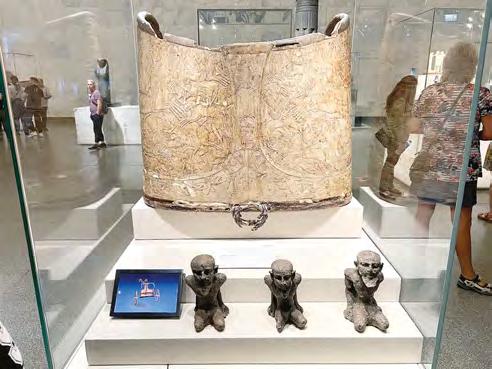

The National Museum of Egyptian Civilization (NMEC) similarly gathered its fair share of headlines when it first went public, serving as the final destination along The Pharaohs’ Golden Parade, a much-televised endeavour to transport mummies through the centre of the capital to their final resting place at NMEC. The museum houses the largest collection of mummies
viewable anywhere in the world and, while it might not garner quite the same attention as the GEM, it nevertheless welcomes scores of intrigued visitors through its doors daily. It’s also notable as the home of the Rosetta Stone, the world-famous granite block which offered historians their first insights into the meaning behind Egyptian hieroglyphs. Covering 490,000m2, NMEC displays a collection of roughly 50,000 artefacts, presenting Egyptian civilisation from prehistoric times through to the present day.
Of all the various environments that benefit from the judicious use of AV, museums arguably top the list. Exhibits can now almost be brought back to life through visual reinterpretations,
Upon exiting a long tunnel that sits behind the Rosetta Stone at the museum entrance, visitors are greeted by a bespoke interactive kiosk – one of many that help guide them around the galleries – designed by Quality and providing overviews of the exhibits. These were created by pairing 19-inch ELO 1990L touchscreens with BrightSign XT244 media players that host the content. Behind it, a mysterious walkway leads underground. Heading down, visitors are greeted by a massive 360° inthe-round display completely covering the walls and floor and displaying iconic ancient Egyptian imagery. A cut-out in the ceiling allows those upstairs to view the presentation from the main exhibition space above.
Measuring 36m wide, 2m high and with an 11.5m diameter, the LED wall is constructed from Leyard CLI3.9 3.9mm panels, with the floor panels mounted within a bespoke structure created by
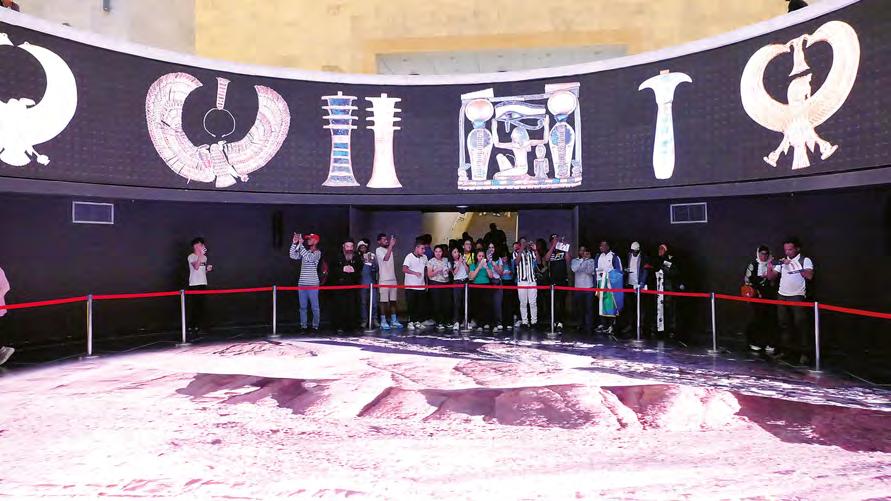
Quality and covered with protective glass to allow visitors to walk directly on top. Content is served from a Dataton Watchpax 4 Display Server which offers four built-in WatchOut DP outputs, while audio for the underground area comes from four JBL CBT70J-1 column speakers mounted to the walls at head height and driven by a Dynacord DSA 8405 4x500W amplifier with processing from a QSC Q-SYS Core 510i. A 2U rackmounted Medialon MAS PRO audio server feeds audio content into the system.






After soaking up the impressive presentations, visitors are directed towards the Royal Mummies exhibit via soundscapes conveyed by the JBL column speakers. With attention focused fully on the mummies, AV here has intentionally been left sparse. A solitary 6,000-lumen NEC PX602UL DLP professional installation laser projector provides a showcase of imagery above one of the main attractions.
Moving back upstairs, visitors enter the cavernous Core Gallery, which presented several audio challenges for the Quality team. To minimise reflections and direct audio energy solely to necessary areas, 16 Bosch LA3-VARI-BH steerable active column speakers equipped with DSP keep the space consistently covered with background music and soundscapes, powered by Dynacord DSA 8405 4x500W amplifiers in tandem with a QSC Q-SYS Core 510i processor. To further enhance the exhibits, the gallery is fitted with scores of 55-inch LCD screens from LG Professional which work in combination with the aforementioned interactive kiosks and other large visual displays. Content for all of these is again fed from BrightSign XT244 players.
Beyond the two main visitor exhibits currently open to the public, the museum also houses a separate auditorium, lecture halls and a 23-seat conferencing room on the basement level, each outfitted with AV gear. Sound reinforcement in the auditorium is delivered by a four cabinet per side Dynacord solution of Cobra tops and subs powered by CSR-LX2P and CSR-LX2S amps, with the lecture hall relying on RCF PL 8X ceiling speakers. The conferencing room is home to a Brähler ICS interpretation and discussion solution, an Epson EB-L610U projector and a portable JBL Eon 208P speaker solution to facilitate important meetings.
With phase one of the project now complete and already open for exploration by inquisitive visitors, preparations have recently commenced on phase two with the construction of an additional gallery on the level above. Here, Quality will provide a similar multimedia backbone as downstairs, but sitting pride of place will be a large-scale diorama of Cairo constructed with multiscreen holographic projections of the Nile and surrounding area, paired with overhead videowalls. The diorama will be powered by NEC PX602UL 6,000-lumen projectors and NEC X551S LCD panels.
Lastly, Quality has supplied a portable multimedia guidance system constructed from 300 Corada Opus+ handheld guides that features 180 audiovisual synchronisation points along its guide path. This system can be used by up to 1,200 handsets at any time, each of which provides professional-quality stereo audio and a 2.2-inch colour display. Between the interactive
kiosks, extensive guidance system and the wide variety of multimedia exhibits, all areas of NMEC have now had their audiovisual needs healthily met.
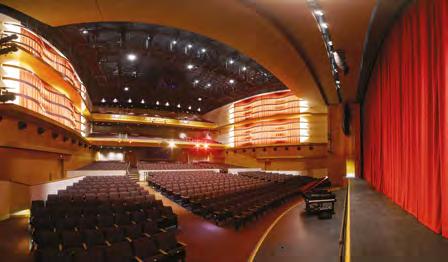

With Quality’s assistance, the Egyptian Authorities and Ministry of Culture have been able to jointly establish an institution that sheds light on the lesser explored cultural aspects of Egypt’s diverse and rich history. “The multimedia was designed to stimulate the visitor’s perception in an exciting and direct way, focused on ensuring they not only receive information to better understand aspects of history and the various topics, but also to undergo an emotional experience,” concludes the Quality MD. “We added value through technology by thoroughly understanding the architect’s vision and psychology and it’s been a great honour to work on such a project.”
www.qualityegypt.com




As

Welcome to the UBX Series.
renkus-heinz.com



THE CULMINATION OF MORE THAN FOUR YEARS OF efforts from multiple project partners has resulted in Morocco’s Mohammed VI Polytechnic University becoming home to the largest immersive videowall ever deployed in North Africa. The custom-curved dvLED solution, housed inside the future OCP headquarters – the SRO Administration Building occupying part of the Mohammed VI Polytechnic University in Benguerier, near Marrakech –spans a massive 87.84m x 2.7m and produced a raft of challenges for all involved in its implementation.
To help ensure the project’s success, Peerless-AV worked closely with Cegelec Maroc, a subsidiary of Vinci Energies, for the installation and full project management, Atrait Consulting for the sizing and sourcing of the audiovisual equipment and Samsung France on the supply of LED panels. The 313.46° concave construction is formed from 915 cabinets of Samsung IF025H-E LED displays, housed within Peerless-AV’s Seamless bespoke dvLED mounting system and installed on 200mm-thick cinder block.
Back in 2018, multi-technical design office Atrait Consulting was entrusted with the design of the auditorium’s AV component. “We started from a blank sheet of paper, with the only directive that we had to distinguish ourselves by highlighting the architectural elements and technological capabilities of the future public space,” explains Éric Jondot, Atrait’s managing director. Atrait’s first obstacle was taking into account irregularities of the wall to accommodate such a vast, curved screen. “Faced with the anticipated demands and complications, our selected partner wouldn’t simply have to provide support, they had to demonstrate expert LED engineering capabilities that would ensure the adaptability of the mounting structure in the field when the time came to make adjustments and ensure precision alignment of each module,” adds Jondot. “Peerless-AV was the obvious
choice. We had complete confidence in them because we had already collaborated in the past, but never on an undertaking of such magnitude.”
The design of the mounting structure required close cooperation between Peerless-AV’s dedicated Seamless Solutions team and Samsung. “Peerless-AV not only had the technical capability and capacity, but had already carried out many complex dvLED infrastructure deployments via its discrete design and manufacturing resource partner, which it has now acquired and brought in-house,” explains Thomas Kayat, key account manager display, Samsung Electronics. “In addition, they have developed specific, dedicated mounting systems for our LED ranges. There are few companies on the market that can carry out the design, manufacturing, training and installation assistance required.”
With the physical implementation kicking off in 2019, the challenge for Cegelec Maroc was managing the 350 workers and multiple cherry-pickers required onsite. Peerless-AV delivered 19 boxes, including all the equipment and tools necessary for fixing the mount structure. A team of 16 were able to take advantage of a three-week site stoppage in July, during which they worked 12 hours a day in temperatures up to 38°C.
“Because of the scale of this facility, we dispatched one of our LED engineers from Chicago to handle the execution,” comments Gwenaelle Villette, director of sales, France, Peerless-AV. “He trained the workers onsite and guided them on the installation of the mounting structure through to the installation of the LED panels and alignment tests.”
This onsite engineering support brought significant efficiencies and saved valuable time. At the start of each day, Peerless-AV and Cegelec Maroc led a meeting on works to be carried out, and again at the end of the day
to discuss problems encountered. “Bearing in mind that the wall is 313.46° curved, two groups worked together to construct from the centre to the end points,” notes Youness Hannache, project manager and business manager of Cegelec Maroc. “This approach, advised by Peerless-AV, made it possible to halve the installation time.”
There were also a host of technical constraints, one being the mounting of the lintels intended to hold the structure. Aligning the pixels on the LED panels was also a challenge owing to the auditorium’s architecture. “We really recognised the extent of Peerless-AV’s support during installation; the custom, precision components for tight tolerances and the micro adjustment functionality ensured a seamless flat plane was achieved,” adds Hannache.
“Otherwise, we would have had to carry out surveys at each stage and the installation would have taken much longer.” Special global mounting jigs and spacers also allowed the install team to scrutinise and align each of the 184 columns. This enabled each cabinet to be applied to the frame with no damage to any of the displays.
Now complete, everyone involved in the installation agrees that the auditorium’s audiovisual design is unique, marking a turning point in Africa, with Jondot already having received several consultations for similar projects.
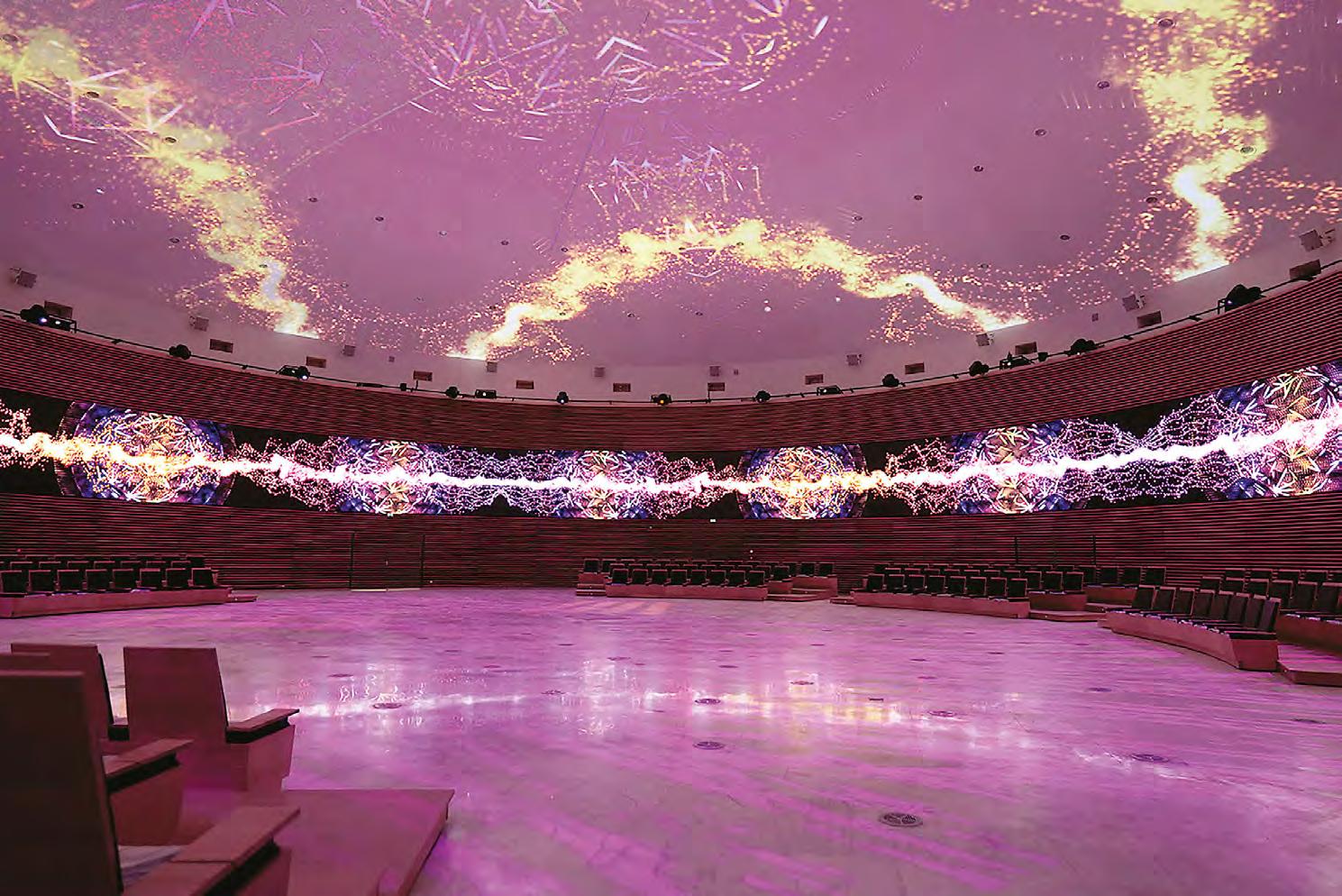
“At the touch of a button, and without the need for a technician, it’s possible to launch a complete audiovisual performance,” he concludes. “We have managed to create a completely event-driven infrastructure supporting four uses: conventions, showcases, banquets and immersive presentations.”
www.atrait-consulting.com www.peerless-av.com www.vinci-energies.ma
Peerless-AV’s involvement in the creation of North Africa’s largest videowall installation was essential to keeping progress on track


from parent company, Neumann&Müller, the pair discuss what this now means for their newly unveiled brand, BeWunder

FE: Those who have been following us in the Middle East over the last 3–4 years know that we’ve been expanding quickly here and also that we had a very successful role in the Expo 2020. Jens and myself took over management of the Middle East business around five years ago and, at the same time, established the permanent install business within Neumann&Müller. We were always responsible for these two arms and we both remain fully committed to those businesses. We really stand behind our teams and see a great opportunity here in the market. And after five years managing both lines of the business, we feel we have a solid understanding of what the market requires and how a company should be structured to be really successful in that.
JG: We want to continue to grow and expand our presence in the Middle East; branch into Saudi Arabia and several other countries in the region. Besides this, more of the projects we’re involved in are getting fast-tracked, requiring quicker responses that mean having more flexibility. We knew it would be better for our clients to have a business fully tailored to the market we operate in. That was the main idea behind the spinoff: to take these two companies that Felix and I have been managing – N&M Middle East here in Dubai and the systems integration company based in Germany –separate them from the group and make sure we have a really strong team for each that is fully focused and specialised on each market.
FE: Neumann&Müller was also affected by Covid over the last 2–3 years and they want to put all their energy into the European market and focus on their core business.
FE: To be honest, we have only received really good feedback, both from our clients and also our team. In some ways it was a bit of a surprise but, since we announced the formation, the majority of people have been coming back and saying: “actually this makes sense”. For us, it’s just the next step in the development of the business.
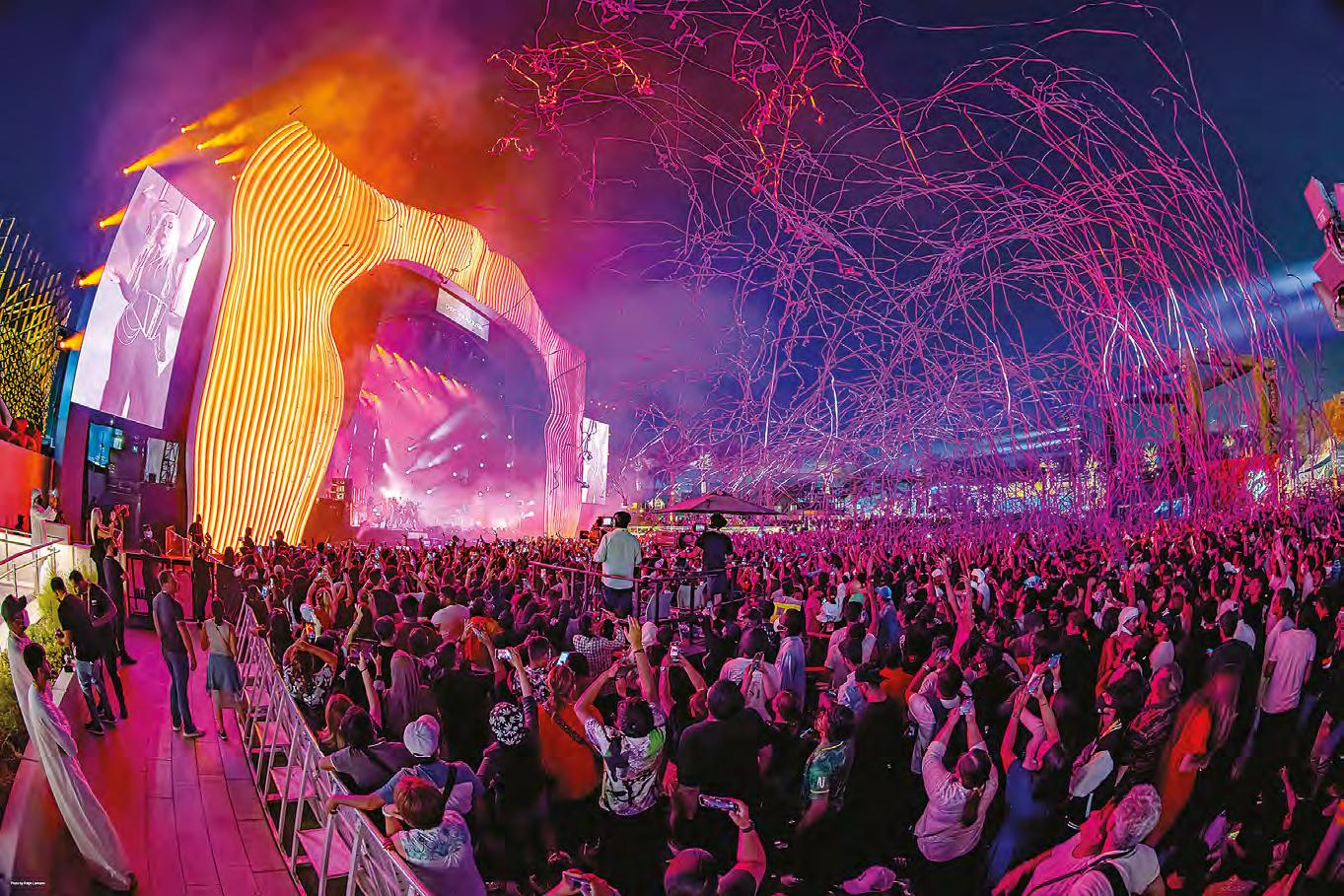
situation. We will still have access to the resources from Neumann&Müller, such as equipment and crew for live events. On the permanent project side, typically, we would collaborate with N&M Venue Services to install the technology into the venues and then the Venue Services division would operate and maintain it. This is how we’ll continue to work in the future.
What proportion of BeWunder’s operations are located in the Middle East?
FE: Quite a lot. In Germany, we have two teams totalling
Explain the motive behind the creation of BeWunder?
around 50 people – one based in Berlin and one in Munich. We have also delivered quite a few systems integration projects over the last couple of years within Europe, so it’s a substantial part of the business. In Dubai, we are around 150 people. Obviously, here we have more people because we have two divisions, both the event business and systems integration business. In Dubai, we also have our own warehouse operations and our own technicians.
JG: We are already somewhat split because of our locations. Felix is based in Dubai and I’m in Munich so our focuses are naturally more on those respective regions. But essentially our roles are the same, we are just in different places. Despite this, we work very closely together; I am frequently travelling to Dubai and vice versa for Felix.
FE: It’s been very organic, just a natural progression of the way the company was already heading. When the companies came under our management, it wasn’t as if we were thinking that at some point we would buy out the business. Things just developed. You can progress to a certain point but, after that, if you actually want to move to the next stage, it often requires something new. Now was the right time for us to make that move.
JG: We both firmly believe in our business. We really

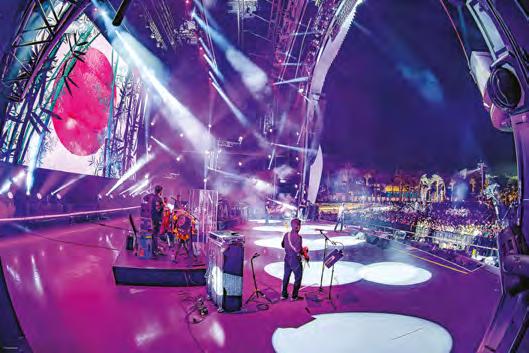












Absolutely nothing has changed within our teams or our strategy. However, now that we’ve changed the company name to BeWunder, we have also decided to rename the respective divisions to better reflect the services we expect them to provide.






Consolidated tradeshows are no cause for alarm, says Dan Daley

LIKE
to make the rent, trade organisations have been moving in together to ameliorate overheads, exacerbated by increases in drayage and other transportation costs. The trend precedes the pandemic: back in 2017 Germany’s Deutsche Messe announced the combining of the Industrial Automation event and the Motion, Drive & Automation show to form the Integrated Automation, Motion & Drives convention, while the Outdoor Retailer tradeshow announced it would cohabitate (and eventually acquire) the SnowSports Industries America Snow Show held in Denver. This year, Italy’s two largest food exhibitions – Cibus and Tuttofood – came together in Milan. In the US, that phenomenon’s been in full swing ever since pro audio’s preeminent expo the AES Show joined up with the NAMM Show nearly a decade ago. That melding came about in large part because the nature of the AES’s constituency had changed: musicians, engineers, mixers, producers and ambitious iPhone users were now one and the same, and NAMM had the better mass with which to achieve useful gravity among them. More recently, the AES and the National Association of Broadcasters (NAB) have been playing house together since 2018, at the Javits Centre in New York, as they did last October.


Since 2020, though, trade organisations have been feeling the economic pinch brought on by Covid and subsequent supply chain constrictions. While post-show press releases trumpet the increased attendance and larger number of exhibitors in the last year or so since shut-downs were lifted, increases are atop some pretty thin bases, but let’s face it: anything is better than no show at all. IBC was happy to have its first live show in three years in September in Amsterdam, even with attendance down over a third from the previous live event, in what’s become a common pattern. All relationships have their power dynamics, and the AES has been the poor relation in all its splices – both NAB and NAMM continue to have relatively robust standalone annual conventions in Las Vegas and Anaheim, respectively, when not being shut down by Covid – but it’s hard to say where the AES Show would be now without these couplings. But instead of being the star of its own show as it had been for decades, pro audio now shines as the support act for the broadcast and MI sectors’ expos, which attract larger audiences with significant interest in audio. It’s not a bad position to be in, enabling console and other big-ticket manufacturers to show off the battleship hardware to one set of eyes while touting the scaled-down or even virtual
versions of those to another cohort with large aspirations but smaller budgets.
Interestingly, while the delivery of esoteric scientific papers may be the AES Show programme’s historical raison d’être, it may be the event’s market-driven educational aspect that gives the expo its greatest lift. You almost didn’t need a microphone and PA as Jack Antonoff, the crown jewel of this year’s assembly of celebrity engineers and mixers, held several hundred listeners’ rapt attention on the Mix with the Masters stage in the back of the hall. The “lectures” even drew some of the broadcast attendees, recognisable by their shined shoes and lack of rucksacks. In fact, at a time when broadcasters are bemoaning younger audio professionals’ lack of interest in mixing for television, putting a few of that sector’s stars on a properly marketed podium and somehow working Taylor Swift’s name into it might help turn things around.
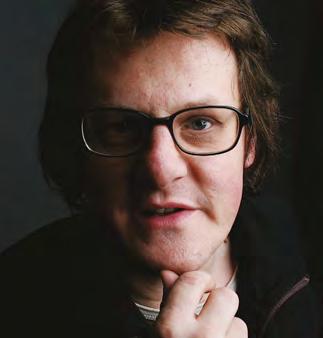
I would not in any manner mourn pro audio’s latest circumstances on the tradeshow circuit. It’s tough times for all, with recession looming. Rampant consolidation among companies is simply being mirrored by their trade conventions with the same hopeful expectations: less money spent setting a stage and more on what can be made of a show.
Phil Ward ponders the Eurovision Song Contest’s contribution to the climate crisis, and wonders whether it will survive Russia’s non-participation
ACCORDING TO THE WORLD
Organization, which works regularly alongside the European Union’s Copernicus Climate Change Service, Europe is global warming’s front runner. Its latest report reveals that temperatures rose on average 0.5°C (0.9°F) between 1991 and 2001, and the same again up to 2021, outwarming even Africa and Asia. For an area unused to climate extremes such as wildfires and typhoons, these are statistics to rock the cradle of civilisation. It’s twice the rate of anywhere else.
There is only one explanation for this. In the very year that the CIA – yes, the CIA – published a report entitled A Study for Climatological Research as it Pertains to Intelligence Problems, the Eurovision Song Contest was won by ABBA. There may seem no connection but, last year, executive supervisor for the Eurovision Song Contest, Martin Österdahl, launched a campaign called #voicefortheplanet that “hopes to gather as many voices as needed to give our planet a voice and have the call for urgent action for nature echo not just across our TV screens but around the world”. The report is clear: “The western world’s leading climatologists have confirmed recent reports of a
detrimental global climate change. A forecast by the University of Wisconsin projects that the earth’s climate is returning to that of the neo-boreal era (1600–1850) – an era of drought, famine and political unrest in the western world.” This was in 1974, Donald. Nineteen Seventy-Four. Ever since, the Eurovision Song Contest has been heating up the region on an annual basis like the inside of a hot-air balloon, with a similar molecular weight exhibited by the music. The net effect of its toxic emissions, which fill the air with unrelenting soot for six solid hours, has clearly been detrimental to Europe’s glaciers. Scientists now predict that glaciers in the Alps will contract 80% by 2100, unless the producers of songs like Save Your Kisses for Me and Zitti e Buoni can be persuaded to “shut up and behave”.
The outlook is not entirely bleak. As a consequence of Russia’s invasion of Ukraine, and despite the fact that this helped Ukraine to win the contest last year, some countries are having to pull out of next year’s event. This is because Russia has been banned, so depriving the contest of one of its largest registration fees. Each participating country has to pay this every year in proportion to its size and,
although considerably smaller, Macedonia, Montenegro and Bulgaria have declared that they cannot afford it. In the case of the former, state broadcaster RTCG issued the following statement: “In addition to the significant costs of registration fees, as well as the cost of staying in Great Britain, we also faced a lack of interest from sponsors, so we decided to direct existing resources to the financing of current and planned national projects.”
The “cost of staying in Great Britain”, it turns out, is the cost of staying in or near Liverpool, the city that won a brief shootout to fulfil an obligation that Ukraine could not possibly fulfil. As the second-placed nation last year, the UK gladly stepped into the breach, despite looming recession and the ultimate embarrassment of selecting a host city with such a heritage of song. It’s like using Wembley Stadium to host tiddlywinks.
Perhaps we’ll see a return of the Intervision Song Contest, the former Eastern Bloc’s alternative for the millions of viewers without access to Western television. Putin has already commented on the “moral decay” of Eurovision, while raining missiles on Kyiv. Is he now preparing the ground? Intervision was held in Poland.







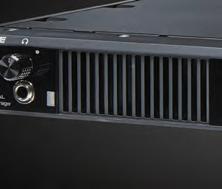

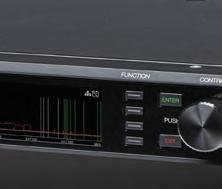





















































IT’S A SHORT STORY BUT, IN JUST OVER A DECADE, A Berlin-based pro audio company has succeeded in its mission to radically transform the ways in which society engages with sound. That company is Holoplot, and its dedication to the design and development of the extraordinary X1 Matrix Array series – consisting of the MD96 and MD80-S modules – marks a new chapter for professional sound systems.
Having set a goal to provide users with full control over sound propagation and localisation, the engineering behind the grille combines a rich mix of science-based, softwaredriven and hardware-enabled technologies that Holoplot claims can create tailored, consistent audio experiences inside even the most complex acoustic spaces. Led by CEO Roman Sick since 2016 and employing over 130 staff at its Berlin office and beyond, the brand’s rapid ascent has been credited to the combination of two core Holoplot technologies – 3D Audio-Beamforming and Wave Field Synthesis.
Impressive demonstrations have resulted in the technology initially being applied for live conferences and concerts in addition to fixed multipurpose venues, theme parks and immersive installations. But as X1’s star seemingly burns brighter with each demonstration, its applications become ever grander.
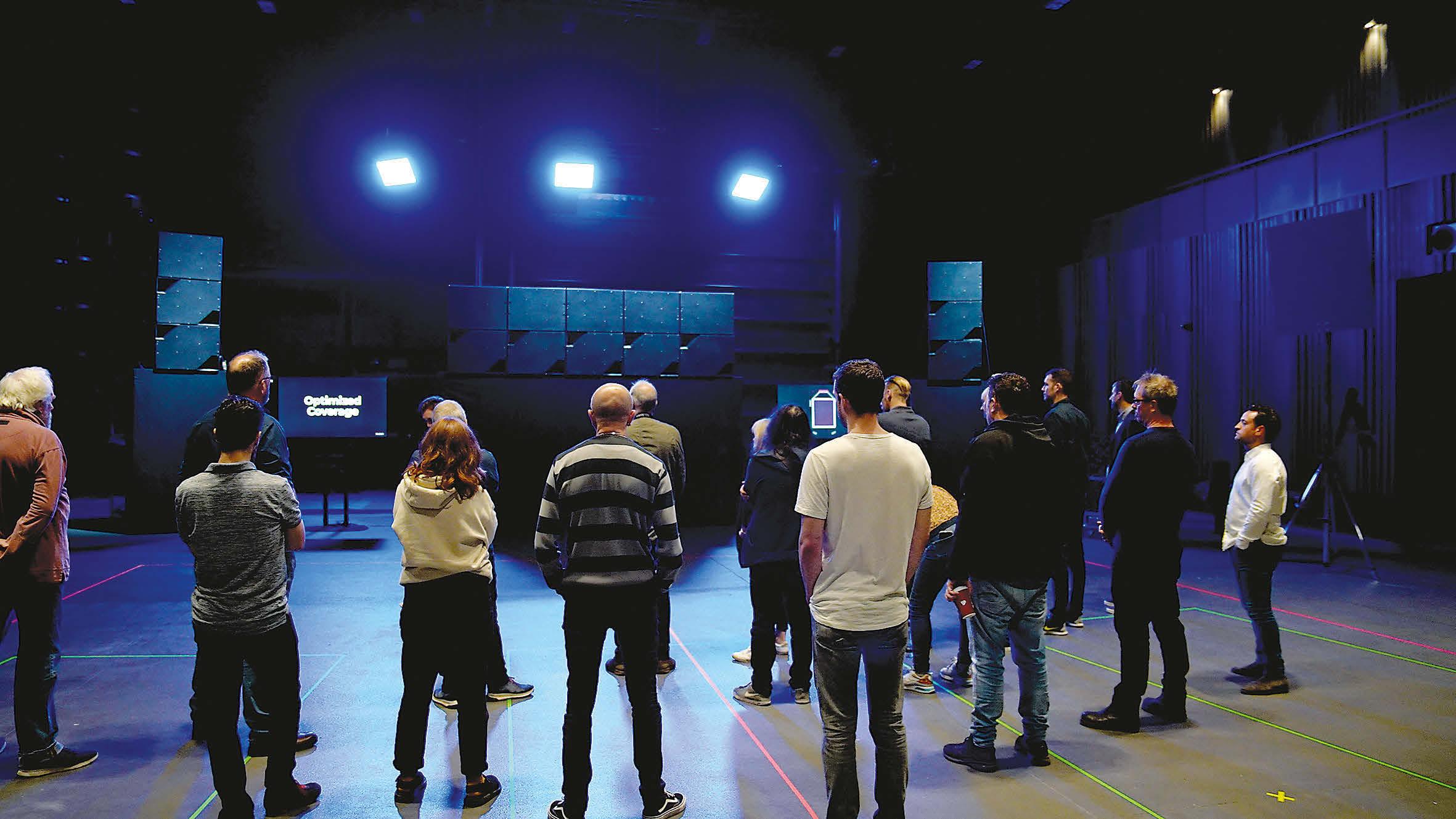
On first appearances at the Berlin Tempelhof headquarters, there is little evidence of the technological breakthroughs that Holoplot has delivered to date: the two-level open plan offices do not resemble a science fiction set. However, the characters acting out the roles betray the backdrop; the vast majority of Holoplotters are in their mid-30s or younger. A
hardware and loudspeaker experience, and more besides. Head of product Michael Kastner is a 29-year-old management and technology graduate from the Technical University of Munich (TUM). With a focus on electrical engineering and IT, his meteoric rise on the career ladder resonates with similar talent surrounding him. Like his colleagues he is fluent in English, the adopted language internally.
Following a four-year stint at wireless headphone producer Bragi, working on The Dash wireless smart headphones and leading the company’s B2B hearable solutions business, Kastner headed towards Berlin and the concept of Holoplot’s Matrix Array. “This turned out to be a very inspirational move for me as I could work with a team that wanted to challenge the status quo and create a unique product,” declares Kastner. “I was enticed by the fact that Holoplot had retained the research project spirit from its foundational years. Despite the seemingly insurmountable engineering challenges that lay ahead, I realised that we had the potential to play a role in transforming audio by challenging the underlying physics behind sound reproduction.”
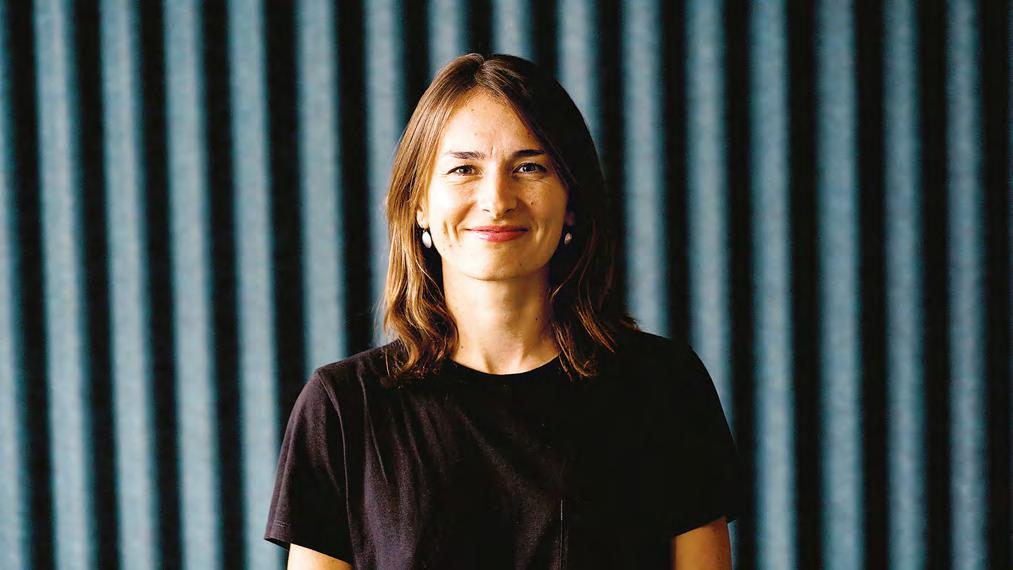
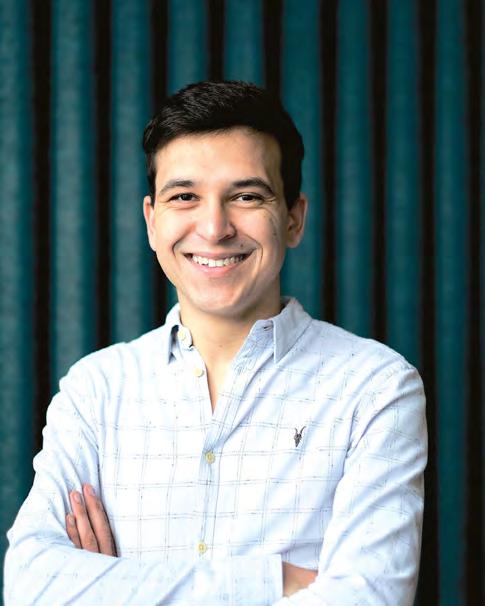
The creation of realistic and deeply immersive soundscapes as well as tailored sound fields is facilitated by audio beam shaping and Wave Field Synthesis – Holoplot’s 3D AudioBeamforming capabilities are based on the principles of these two theories. Kastner acknowledges that these core technologies are a continuation of Holoplot research fellow Evert Start’s field synthesis works that culminated in the creation of the first beam shaping algorithms commonly used in today’s column speakers. It enables the creation of authentic sound localisation with lifelike distance and directional perception of audio objects.
“I believe that the Matrix Array is a logical continuation of that movement but, in addition, we’re now able to control sound in both axes,” declares Kastner. “From 2017 onwards, we really embarked on the journey to make the existing Holoplot Matrix Array concept fit for concert-grade, highperformance applications. The traditional field synthesis approach usually combines point sources with signal
Richard Lawn visits Holoplot’s modest Berlin offices to discover more about a technology that’s anything butHoloplot’s head of product, Michael Kastner The demo makes the sale – a recent X1 demonstration at London’s UCL Pearl research lab



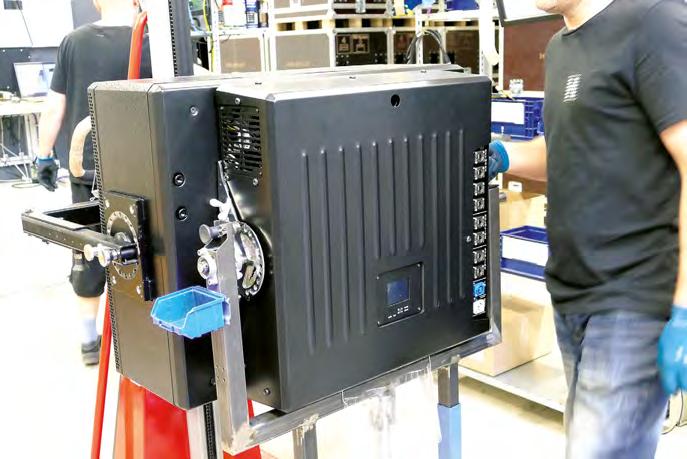
 All aspects of assembly are carried out on a bespoke trolleyboard
Natalia Szczepanczyk, Holoplot’s senior applications engineer
All aspects of assembly are carried out on a bespoke trolleyboard
Natalia Szczepanczyk, Holoplot’s senior applications engineer
Szczepanczyk’s responsibility is to better explain the virtues of the X1 technology to consultants, architects and experience designers.
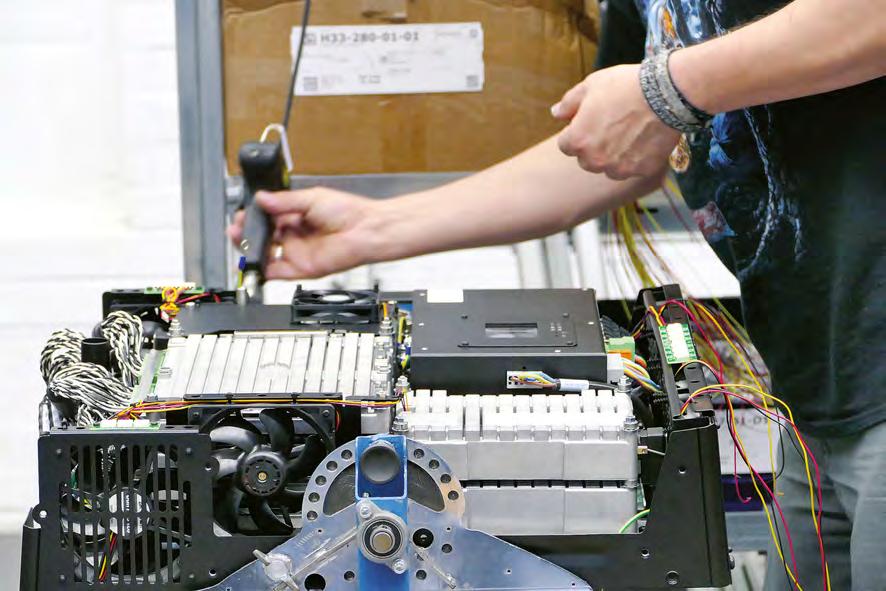

“As in most instances with audio, the demo makes the sale,” she says. “When I heard the demo for the first time, it really gave me goosebumps as it defies everything you’ve ever heard or think you know about sound, and it often has that same effect on our audience.”
Holoplot’s 2022 exhibitions and demos have provided invaluable customer feedback. “X1 becomes a creative tool in the hands of a content producer,” enthuses Szczepanczyk. Immersive technology can be regarded as a novelty, but she insists that it is here to stay. “Immersive is expanding from the world of entertainment to other applications such as education. I think we’re still at an early stage with a lot more to be explored. The future is in the way we integrate technology so it’s no longer visible or perceivable and you can really focus on what that technology is trying to convey to you.”
llluminarium in Atlanta and Las Vegas, two trailblazing cinematic experiences employing the unique audio capabilities of X1, actually combine entertainment and education as the creatives behind the project endeavour to convey real-life experiences to the masses. A 360° projection surface brings life-sized content such as the African wilderness to life, with X1 adding localised audio to enhance the sense of realism.
Holoplot has also been supplying hundreds of X1 modules to the MSG Sphere in Las Vegas as official audio supplier to this next-generation live entertainment venue due to open towards the end of 2023. Rumours abound that the Sphere’s high-performance sound system will be put to the test by global superstars U2 as the opening act. It will also house the world’s highest-resolution LED screens to date. “The Sphere is probably the most ambitious immersive audio project of our time, and we are very proud to be a part of this,” Kastner confesses, with Szczepanczyk adding that “the dimensions of the project are truly mindboggling. We have raised the bar for entertainment and, for once, audio is going to play a central role.”
It’s no surprise Szczepanczyk enjoys working on such new and different projects as Illumniarium and Sphere. A native of Łódz , Poland, she is clearly a good listener and works closely with R&D to convey real-world feedback leading to X1’s continued evolution. “The current focus is to make it easier for systems designers to adopt the combined hardware and software as a plug-and-play setup,” she explains. “We want our professional technology to be made accessible for all users in all applications.”
The wraps have already been removed from smaller-scale projects including a prominent mosque in Egypt. “The Masjid Misr project was an extremely challenging space,” she admits.
“It’s a beautiful 10,000m2 marble mosque with a 60m-high dome. No architect is going to allow loudspeakers to be fixed to the surfaces of such an ornate interior.”
Szczepanczyk emphasises that to evenly cover the mosque with audio and meet the specified intelligibility targets using steerable line array technology, approximately 30 loudspeaker positions would need to be fixed in various locations across the listening area. “My colleague, Emad El-Saghir, designed the system and managed to reduce this to just nine array positions that are seamlessly integrated with the interior which, as a result, only required minimal acoustic treatment. The intelligibility that X1 provides by focusing on the audience area is incredible when you consider the room dimensions and harsh surfaces.”
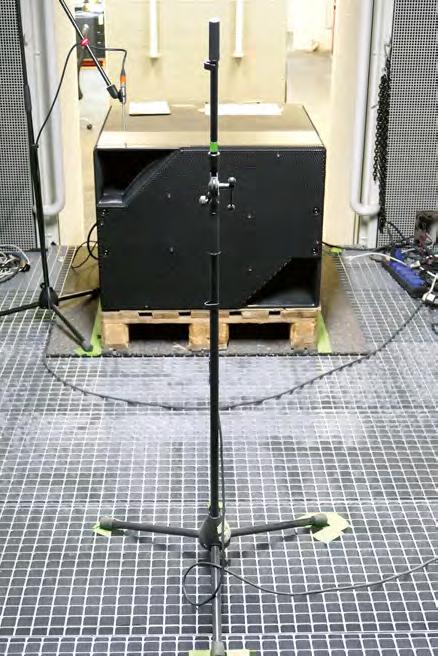
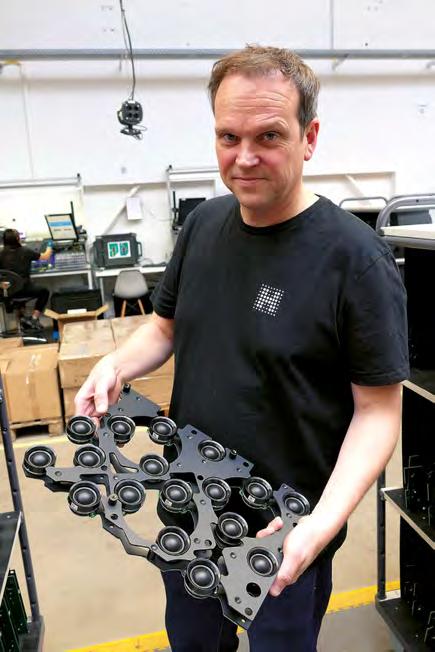
Having satisfied the architect’s aesthetic concerns, the Holoplot solution, crucially, passed the listening test. “Although the speakers are positioned up to 23m above the floor, the quality of sound has not been compromised,” says Szczepanczyk. “The worshipper is experiencing a higherthan-typical speech transmission index (STI) which ranges between 0.53 to 0.69 over about 90% of the prayer hall. In my experience as an acoustic consultant, I have never encountered such figures, especially in a space with up to a 6s reverberation time in the lower mid-frequency range.”
As the X1 demonstrations lead to increasing orders, Szczepanczyk and her colleagues are plying their expertise at a wider range of venues including, most recently, a New York theatre. “Performing at the Beacon Theatre was challenging for musicians as well as spoken word performers such as standup comedians,” she explains. “They were finding it hard because of the slapback returning from the first balcony, which contributed to general venue noise. Having installed an X1 system, our beams are programmed to avoid the balcony front to minimise distracting reverberations. By applying our 3D Audio-Beamforming – optimised beams projecting sound onto the audience area – each ticket-holder can be assured of having consistent, intelligible audio in a visually striking listed building. Engineers for some of the world’s best bands have loved their experience using our system and I’m excited to see who’ll play the Beacon next.”
Beyond the world of entertainment, other verticals are opening their ears to Holoplot’s revolutionary technology. “We are at the beginning, but we are starting to appreciate what else we can do and how we can improve on the basics we already know,” concludes Szczepanczyk. As the pages of the Holoplot narrative turn, the company’s deftly placed footprints are being revealed.
For over 15 years, GLM loudspeaker manager software has enabled sound engineers across the globe to utilise our Smart Active Monitors and dial in precise mixes that translate flawlessly to other rooms and playback systems. GLM automatically adjusts your monitor’s settings to counteract unwanted room-acoustic effects, ensuring that you hear the sonic truth, no matter where you choose to set up your system.
With the introduction of our powerful new GRADE report, GLM 4.2 offers you the unique possibility to completely understand and transform your entire listening environment – creating detailed readouts in a matter of minutes.
It’s time to mix faster and better.
Get to know GLM, visit www.genelec.com/glm
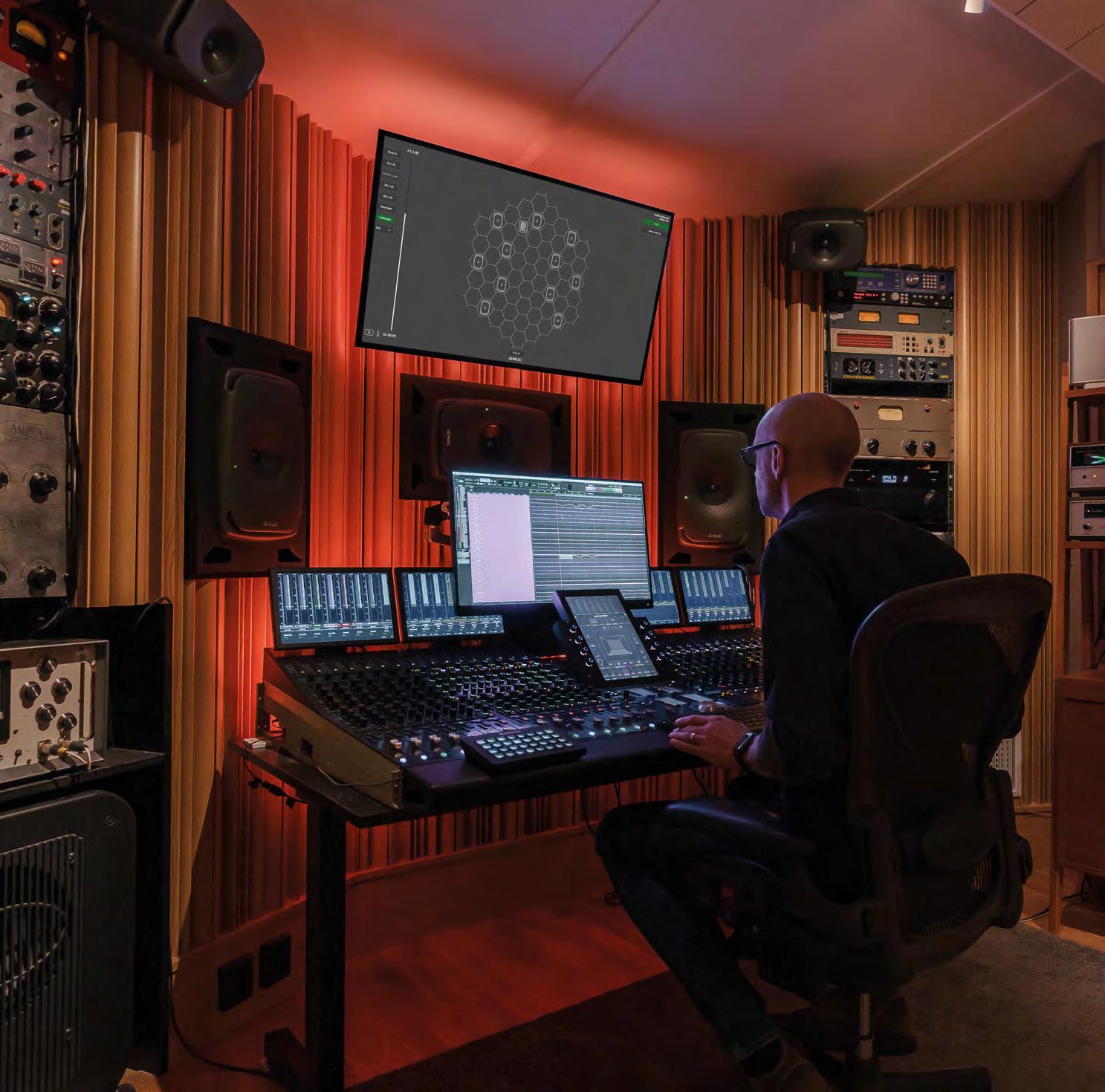
From humble beginnings, Coda Audio’s growth has been driven by relentless innovation and R&D. As the company enters its next phase of development with a dive into the immersive domain,

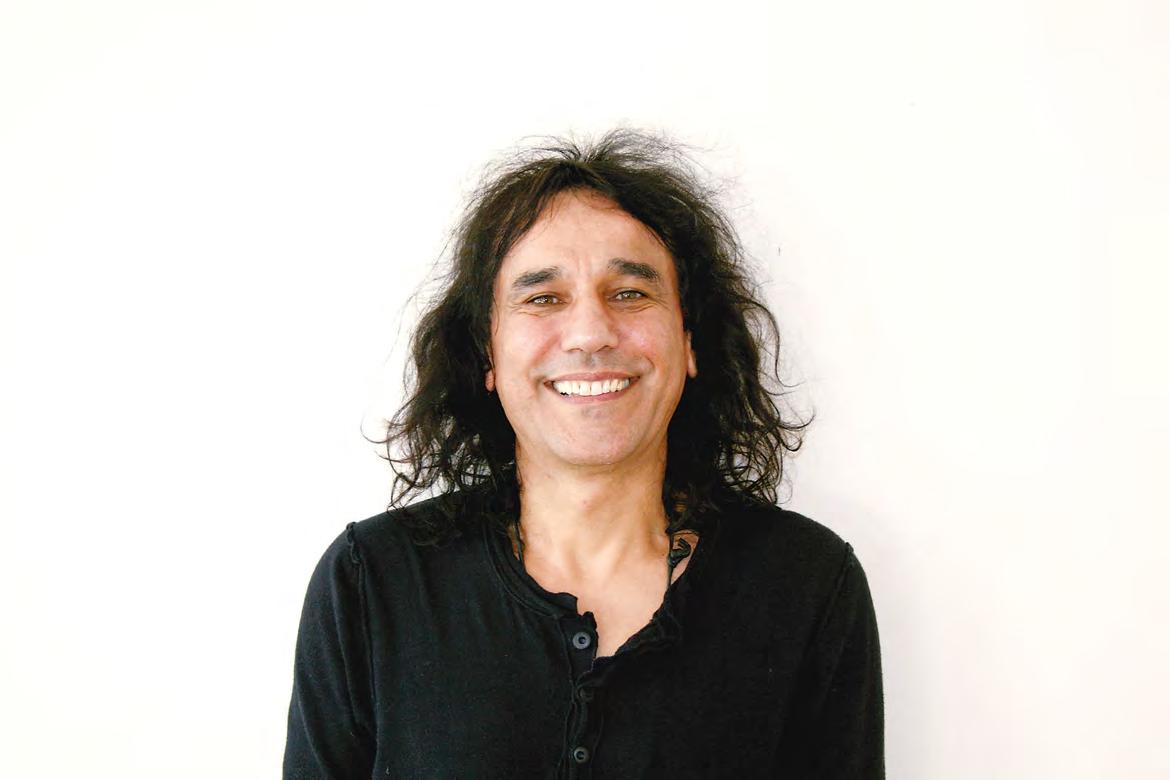
Alexandrov is rightfully proud of his workforce. “We employ almost 300 people in R&D, manufacturing, sales and marketing, with our R&D teams working in transducer design, loudspeaker system design, hardware, electronic and control software, prediction software, immersive software and processing,” he relates. “We cover the whole spectrum of pro audio design and manufacture.”
An ISO9001-2000-certified, purpose-built facility in Bulgaria handles the entire production process, from raw materials through to finished products by way of extensive metal and wood CNC manufacturing, plastic moulding, welding, transducer manufacturing and electronic production. “There is a lot of engineering and innovation in the manufacturing process involving a large team and a lot of know-how,” continues Alexandrov, adding that the company also designs and manufactures its own tools and machinery in-house, while production technologies are being created and improved upon continuously to keep the point source and line array systems for install and live performance rolling off the production line.
Coda has raised the bar higher still with the 2021 launch of the immersive Space Hub processor, which brings the manufacturer into a realm that goes way beyond 7.1. Currently capable of rendering up to 128 audio sources into 128 outputs, the 3U processor incorporates advanced spatial audio algorithms for positioning and moving audio in real time through a 3D soundstage.
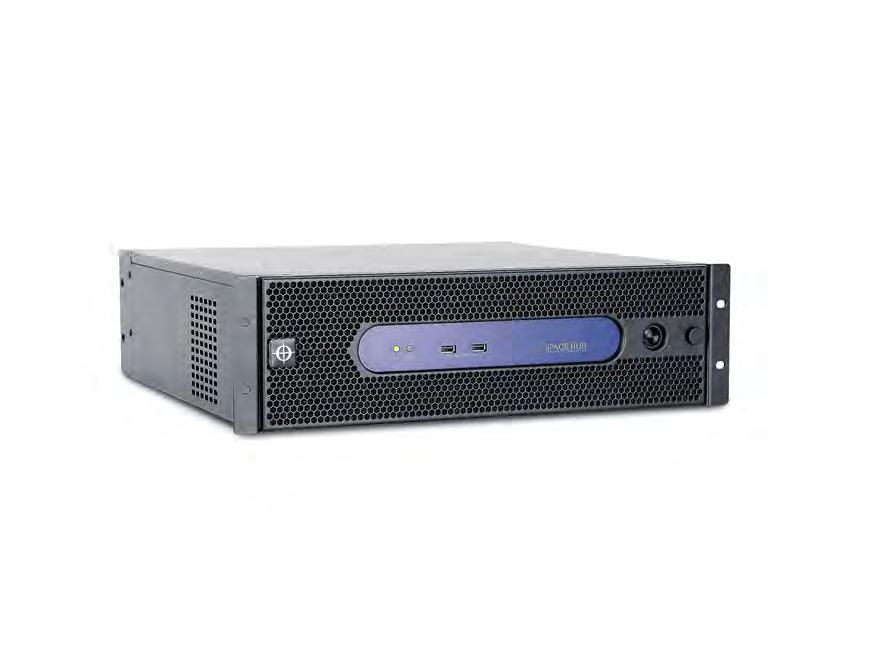
“Immersive technology opens new possibilities to artists, allowing them to express themselves in a very powerful way,” explains Alexandrov. “We decided to build our technology up from the fundamentals as this will allow us to reach greater heights in the longer term. You cannot simply create a processor and announce that you’re an immersive supplier. It won’t work very well, and it already exists.”
A select group of hardware, electronics and software engineers challenged to lead the project in 2017 started by analysing current problems that existed in conventional immersive systems. “Before
designing a processor, it’s important to design specialist drivers and engineer DSP processing with filters,” the MD continues.
“Fortunately, our team comprises the right balance of software, mechanical, electronics and hardware engineers. When you mobilise such talents, true innovation is sparked.”
That collective talent took a deep dive into algorithms, electronics and electroacoustics. “For the phase linearity of the system, it is vital to localise where the output comes from and how it moves,” explains Alexandrov. “Otherwise, you have an uncontrolled immersive situation whereby different speakers are performing at different frequencies on the time domain. The wavefront directed from multiple points will not be in phase, but it needs to be coherent. By creating linear phase response of all the input sources simultaneously – either at 100Hz or 10kHz and everything in between – you can deduce where it comes from. A true immersive performance demands precise positioning and
Space Hub differentiates itself from its rivals by claiming to “Basically,

The brand new Showcast 100 is an all-in-one studio by Datavideo. This studio contains a four channel switcher, streaming encoder, camera controller, audio mixer and SD card recorder.

The switcher has 4 inputs in HDMI and can control up to 3 UltraHD cameras, such as PTC-280 and PTC-300. The fourth HDMI input can be used for presentations, titles or a tracking camera such as PTC-285.

The 14” touch panel is intuitive and easy to control. The perfect switcher for small events!


For more information, check out www.datavideo.com
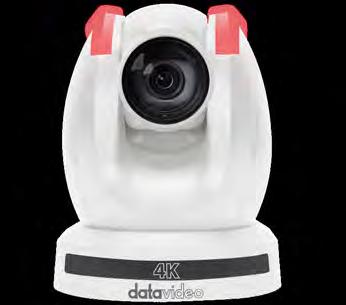
As an immersive experience, Space Hub goes beyond the processor. To ensure that the room acoustics are not excited easily, other aspects including resolution and reverb need to be considered. “The room cannot be heard when the distorted energy is higher than the reverb energy,” says Alexandrov. “You can hear the voice but may not hear the fine 3D details so, to include the detail, high resolution transducers must be designed at the outset. As an electronics designer and a manufacturer, Coda could easily implement the components into this technology. The progression to immersive became consequential, so we ceased to recognise problems as being in the electronics domain. With high resolution speakers and a coherent wavefront, it is possible to select and modify the algorithm within the space.”
As Alexandrov points out, the principal advantages of linear phase loudspeakers become more important in multichannel 3D audio. “Ensuring phase accuracy with no differences in
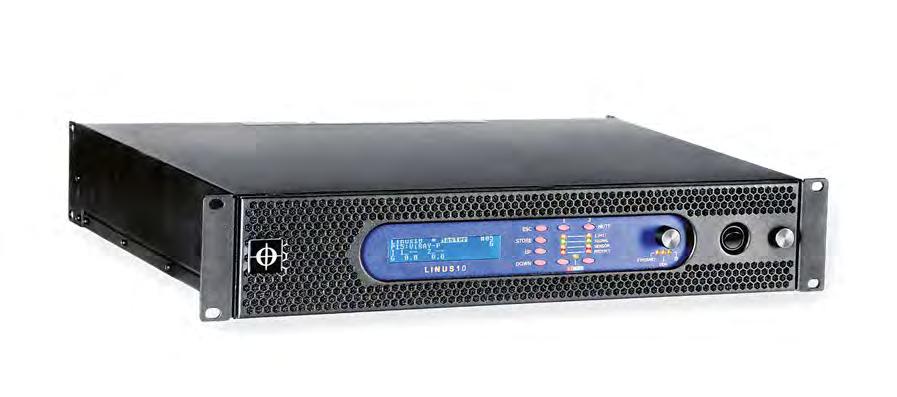
to only one algorithm, which could be too wide for some aspects of the mix.”
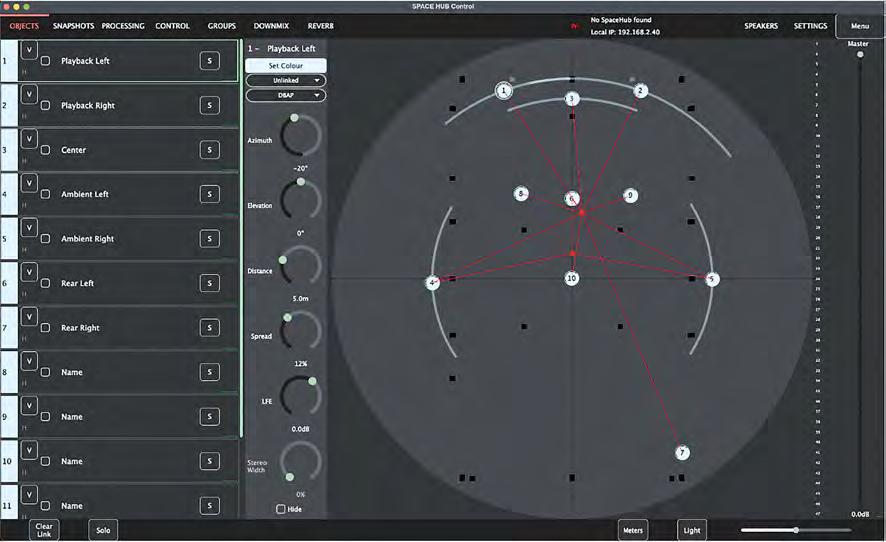
To date, Space Hub is proving to be a standout tool for live musical and theatre productions. “The next step will be to work with artists on their performances, and that will require a higher resolution format than the current version,” Alexandrov continues. “Immersive audio will evolve in more directions and inevitably become more compressed, with lower resolution streams. Consumer high resolution streaming is currently available in a stereo format but, for now, immersive remains a niche within the professional sphere. The future is immersive and, when
timing between the various loudspeakers, the essential timing information is transmitted to the listener with perfect phase coherency and transient accuracy. By incorporating linear phase response in our speakers, we differ from conventional immersive systems because 100Hz frequencies will arrive at the same time as 1kHz or 10kHz. Electronics are more precise on the time domain than the speakers and, with our DS FIR technology, we can linearise the phase response of the speakers from 50Hz up to 20kHz with less than 12ms group delay.”
The creation of a smooth workflow for immersive engineers has been credited to the successful marriage of electronics and software. Developed for the Linus amplification and DSP platform, System Optimiser software has been upgraded to control the electronics for Space Hub. Software engineer Lukas Klingebiel was one of several new recruits immediately drafted into the project at its inception in 2017. “By creating a flat phase response for all our speakers within the Linus amplification platform, Space Hub has the perfect base,” he explains. “By integrating this with System Optimiser, we can go a lot deeper and effortlessly from simulation to application and immersive mixing. All the various loudspeaker parameters such as dispersion, maximum SPL, coverage pattern and phase response need to be considered when integrating into the core.”
The Space Hub ecosystem remains a work in progress and the Hannover team is remaining tight-lipped with regards to its next, highly anticipated revelation in early 2023. Beyond the immersive technological workflow, however, Alexandrov is focused on training audio engineers from system setup to mixing, tuning and content creation. “Our current goal is to create greater transparency and extend ease-of-use features,” he says. “For example, by controlling the algorithms within each individual channel input, the engineer can focus on the lead vocal or any aspect of the mix, including the strings or acoustic guitar. Each source comes with its own dedicated processing. We don’t want to compromise ourselves like other systems by limiting ourselves
it becomes available to everyone, this will become the new standard, just as stereo replaced mono. For that to happen, more content will be required and, to produce more content, there will be a demand for higher resolution.”
Coda recently removed the wraps from two acoustically treated immersive audio demo rooms, the Auditorium and the White Room, at its Hannover HQ where invited visitors can experience the technology. Customer feedback is welcomed by the engineering team. “Coda is still learning, so we are inviting artists and producers to discuss their
requirements, so we can ultimately help them to achieve that,” says Klingebiel. “In parallel, we can continue to develop our immersive capabilities as we listen and learn from the artists, engineers and the audience.”
The rooms are equipped with 3D setups comprising HOPS8 dual 8-inch loudspeakers on several levels, SCV-F sensorcontrolled subwoofers and the pivotal Space Hub immersive processor. A second Space Hub serves as a backup unit to demonstrate redundant system configuration. In addition to content feeds from various DAW programmes, the native Space Hub control software, a mixing console with Space Hub remote control interface and an iPad with touch-optimised OSC control are available, together with a tracking system.
Sales and marketing director Dave Webster is keen to promote the virtues of Space Hub as he travels around the world meeting the brand’s numerous distributors and dedicated customers. “The interesting aspect of Space Hub is that the processor is just one part of the system,” he says. “Svetly and the team got the fundamentals right at the outset, starting with the loudspeaker components. It’s comparable to a live sound engineer placing the right microphone correctly, otherwise the input won’t ever be mixed correctly on the console, despite having a fantastic preamp. As an innovator, Coda does not accept a technology as it is and would prefer to change it. With our roots at the output end of the signal chain, it would have been far easier to take something off the shelf and re-engineer it but, ultimately, this doesn’t get you further than base camp. Space Hub is an exceptional solution and is a great example, because we are already two steps ahead and looking at adopting how the technology interfaces with our future roadmap.”
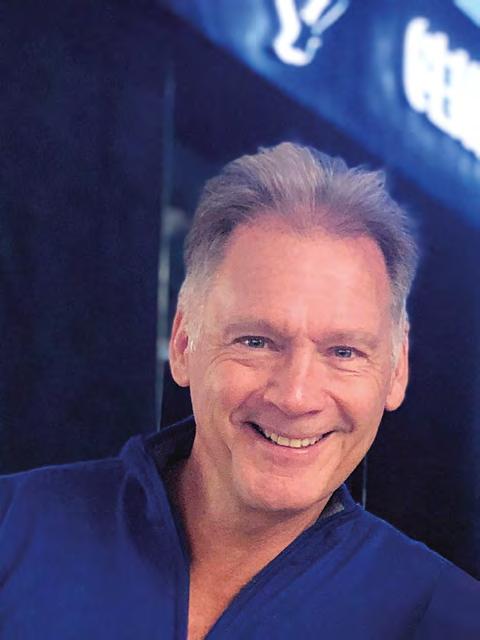
Like Webster, Alexandrov is also clearly enjoying working in the immersive world. “The only problem with having this much fun is that it makes you work even harder, but the results you get motivate you further,” he admits. “During this immersive evolution, I have witnessed key members of our team growing to become real family members. We can design in a manner that we want, not only in terms of audio quality but in terms of functionality and workflow.”
Having decided to create everything internally, Alexandrov admits that Coda initially made life very difficult for itself. However, with big reveals scheduled for early 2023 beginning with ISE, the German innovator can look forward to a chorus of market approval outside its traditional customer base.





THE NEUMANN KH 150 is a bi-amplified DSP-controlled loudspeaker that joins the manufacturer’s line of reference-class studio monitors. Featuring the same resolution as all other Neumann Studio monitors, the speaker integrates a newly developed 6.5-inch woofer with what the manufacturer describes as “ultra-low distortion and high SPL capability”. Despite the cabinet’s diminutive size, the KH 150 has a flat frequency response from 39Hz–21kHz (±3dB) and is recommended for all critical listening applications, from broadcast to music production, including styles that require a deep low end or elevated listening levels.
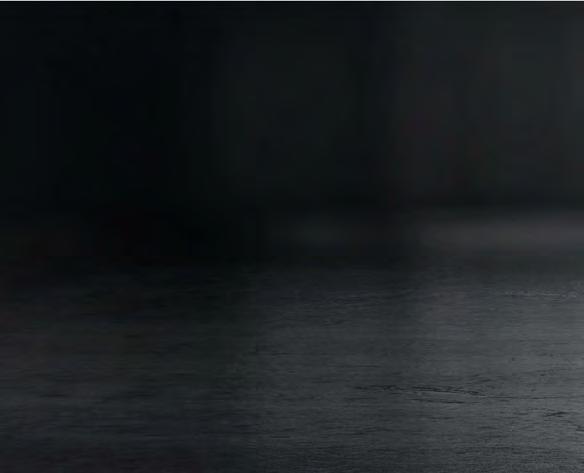
The digital electronics housed within the cabinet allows the KH 150 to be calibrated via Neumann’s MA 1 Automatic Monitor Alignment. In addition, the unit is said to be “extremely energy-efficient”, with Neumann engineers having developed patent-pending amplifier technology that combines superior audio performance with the energy efficiency of Class-D. Although the KH 150’s dual

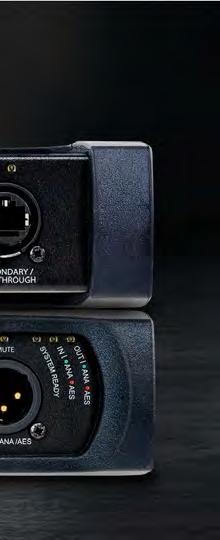
amplifiers deliver up to 145W to the 6.5-inch woofer and 100W to the 1-inch tweeter, they reportedly only consume 17W when idle. Auto-standby reduces power consumption to 0.3W when the KH 150 has not been used for a period of time.
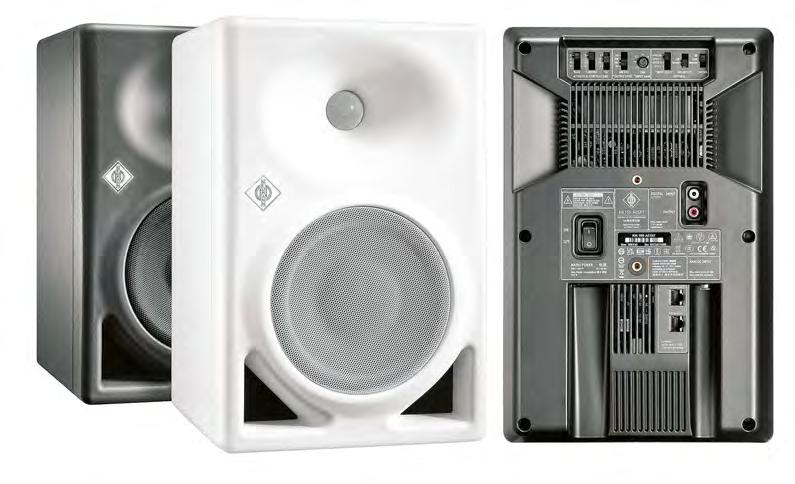
Connectivity on the cabinet comprises analogue and digital inputs (S/PDIF). The monitor will also be available in an AES67 variant with redundant AES67 audio network ports that are fully compliant with broadcast standards such as ST 2110, ST 2022-7 redundancy and Ravenna. At the same time, the variant will be compatible with Dantegenerated AES67 network streams.
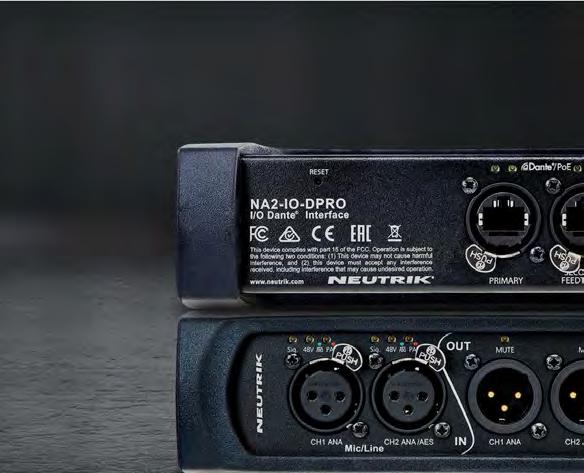
The manufacturer has also reissued the M 49 studio microphone. Characterised for its continuously remote-controlled polar pattern, the M 49 is in great demand both among collectors and as a vital recording tool.
Hand-made and hand-soldered in Germany, the M 49 V is a reissue according to original specifications and design documents from the Neumann archive. It uses the same circuitry as the most popular historical
revision, the M 49 c, but with a lower noise, hand-selected sub miniature tube. The pattern control unit automatically adapts to the mains voltage and is also compatible with old M 49 microphones. Replacing the old bayonet connector, the M 49 V uses the RF-tight connector of the historic M 249 broadcast version. In addition, the M 49 V can be configured via internal switches, either as a made-to-order option or postsales by Neumann Service.
Protecting its BV11 output transformer from unwanted distortion, the infrasonic filter can be lowered from 30Hz to 12Hz, resulting in the frequency response of the early M 49 up to 1957. Improving the signalto-noise ratio by approximately 3dB, the M 49 V can be set to a fixed cardioid pickup pattern when used exclusively for vocals and speech. The M 49 V comes as a set with remote pattern control unit, microphone cable and a classic “yoke” swivel mount in a handcrafted case.
A REIMAGINING of the popular AT2020USB+, the AT2020USB-X is the latest microphone from Audio-Technica and is a cardioid condenser USB model designed for musicians, streamers, podcasters and other content creators. The AT2020USB-X is said to offer the same sound as the earlier model but has been upgraded to feature 24-bit/96kHz sample rate and USB-C connectivity.
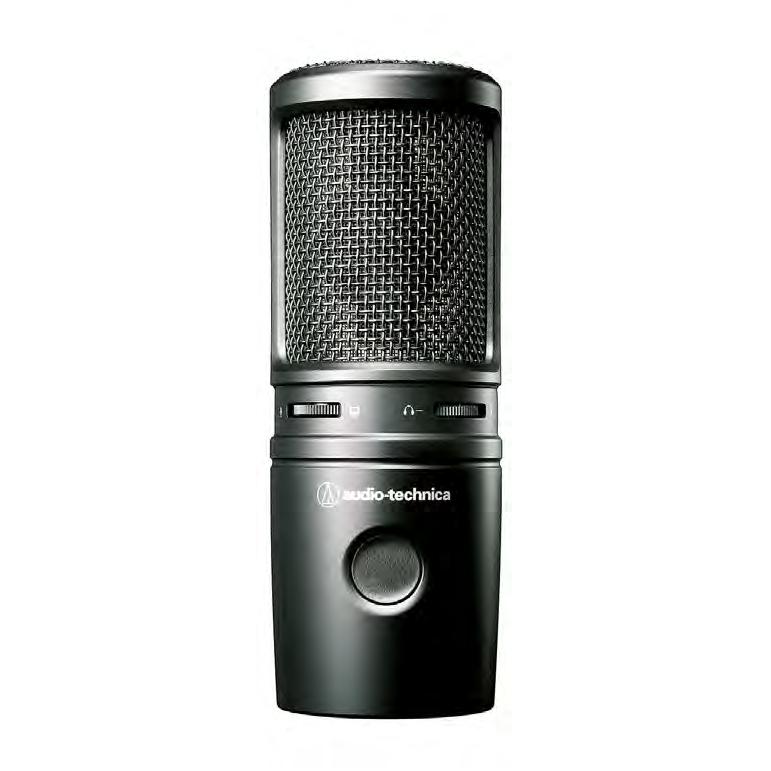
In addition, other improvements to the AT2020USB-X include a soft-touch capacitive mute button on the body to quickly mute audio at the microphone, two-state LED indicator ring lights for when the microphone
HAVING STARTED working for Pearl Microphones in Stockholm in 1954, Bernt Malmqvist has amassed 68 years of experience. In early 2020, Malmqvist was provided with the opportunity to develop his own signature microphone. Following two years working on the project, the Pearl ELM-T Bernt Malmqvist Signature Edition true tube microphone has been unveiled. The large condenser is made more distinctive by its Rolex Green Nextel finish and variable polar patterns. With power supplied by a custom-made PSU from Andreas Grosser in Berlin, the microphone is built around the unique Pearl ELM capsule with a 7:1 height-to-width ratio.
In combination with a true tube amplifier, the Signature Edition condenser reportedly provides a warm and detailed sound with a very smooth off-axis response. Very low for a true tube design, the large diaphragm maintains the self-noise at 15dBA, and the frequency response extends beyond 20kHz.
Built entirely by hand in Åstorp, southern Sweden, the ELM-T is packaged in an aluminium case with a PSU, cable, shock-mount and an individual frequency chart. Acquired by its former sister company Milab Microphones in 2017, Pearl Microphones remains one of the oldest, continuously operating microphone
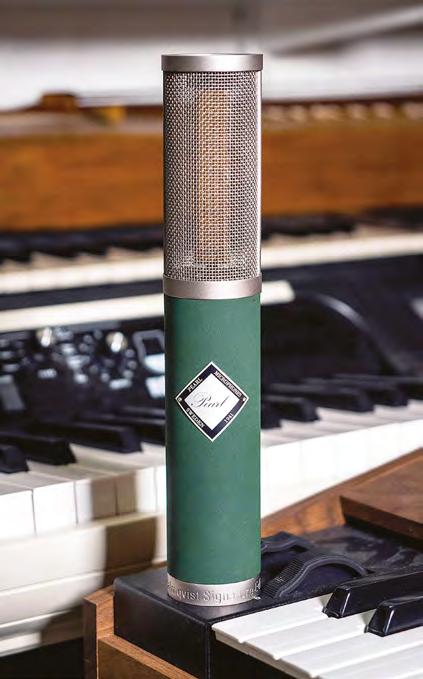
AMERICAN STUDIO equipment manufacturer Warm Audio has added two models to its portfolio of classic recording recreations. The WA-CX12 is described as a fait hful recreation of “the most natural and balanced tube mic of all time”, the AKG C12, while the WA-47F re-envisions the high SPL, low-noise classic ’47-style FET mic. The original AKG C12 was produced in Austria from 1953–1963 and is the definitive version of the 12-style mic, lauded for its organic tone and pleasing top end. Warm’s WA-CX12 sound profile and circuit design are inspired by that original production run of only 2,500 mics, which have become highly coveted for their ability to capture the natural beauty of vocal performances, room sounds and other far miking techniques. The WA-CX12 is a large-diaphragm tube microphone with premium components handinspected in Austin, Texas. Like the original, the WA-CX12 tone is mostly flat until a slight dip at 2kHz with a gradual boost between 5–10kHz. At the beginning of the chain, the WA-CX12 has an edge-terminated, all-brass
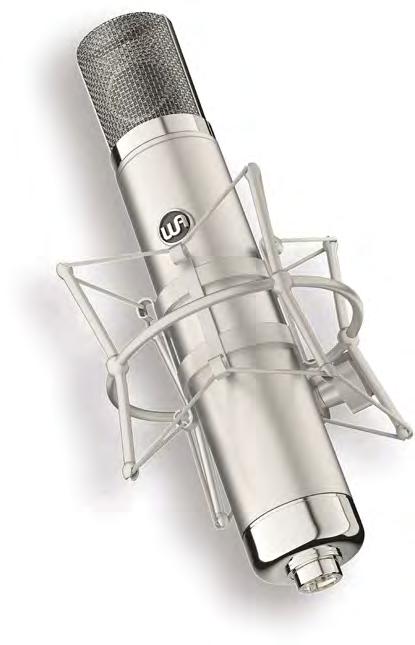
CK12-style capsule, which remains true to the frequency response of the original 12-style microphones. This capsule allows the WA-CX12 to have nine polar patterns, including the typical cardioid, omni and figure-of-eight, in addition to six intermediate patterns. Moving down from the capsule, the WA-CX12 uses a premium 12AY7 vacuum tube for added warmth. At the end of the circuit, it uses a custom TAB-Funkenwerk (AMI) USA Output Transformer, which reportedly gives the mic a very
manufacturers in the world, founded in 1941. www.milabmic.com
is powered on or muted and an improved custom desk stand to serve as a secure base. The AT2020USB-X also features a built-in headphone jack with volume and mix control to let users directly monitor the output with no delay, as well as blend the microphone signal with computer audio. The AT2020USB-X has a high-output internal headphone amplifier. Accessories include -inch-16 to 5 8 -inch-27 threaded adapter, the desk stand and a 2m USB-C to USB-A cable with a USB-A to USB-C adapter.
www.audio-technica.com
A NEW no-fuss lavalier microphone for presenters has been unveiled by German manufacturer Sennheiser. Described as a high-quality, miniature omnidirectional
full, wide and open sound, getting the most out of the capsule and additional circuit components.
The WA-47F is a recreation of ’47-style FET originally released in 1969, which gained massive popularity inside studios for its ability to handle fast transients with exceptional detail. The WA-47F shares the same sonic profile as that original microphone. It takes the sound of the WA-47 tube mic and swaps the valve for solidstate FETs, meaning there’s no compromise between capturing rich midrange, detailed bass and handling very loud sources. At its core, the WA-47F uses a reproduction of the vintage K47-style capsule found in the original microphone for ultra-wide frequency response and detail, and is driven by a custom TABFunkenwerk USA Output Transformer. The WA-47F pairs premium Fairchild FETs with polystyrene and Wima capacitors and the AMI output transformer. The –10dB pad gives extra headroom for loud sources that need to be kept loud. To eliminate unwanted bass frequencies on sources like lead vocals or electric guitar cabs, the included 140Hz low-cut filter can be engaged to save from unnecessary post-EQ.
and requests for a presenter mic that can be worn with any hairstyle and it is also unobstructive and easy to install, the MKE mini can be used when a hairstyle doesn’t allow for a head mic or when wearing an outfit that offers no possibility to clip a bodypack. All that is needed for setup is to connect the microphone to a bodypack and attach a lanyard.

Housed within the MKE Mini is the same KE 4 capsule derived from Sennheiser’s MKE 2 microphone, with improvements said to be made to provide a warm and distortion-free signal, even at high sound pressure levels.
www.sennheiser.com
FOCUSRITE HAS made its Vocaster DM14v dynamic microphone available in two additional packages. Previously part of the Vocaster Two Studio interface bundle, the DM14v can now be bought as a standalone unit and as part of the company’s recently launched Vocaster Broadcast Kit.
Geared towards podcasters, streamers, vloggers and voiceover artists, the Vocaster Broadcast Kit pairs the DM14v with the Vocaster HP60v closed-back headphones and comes bundled with a 3m XLR cable.
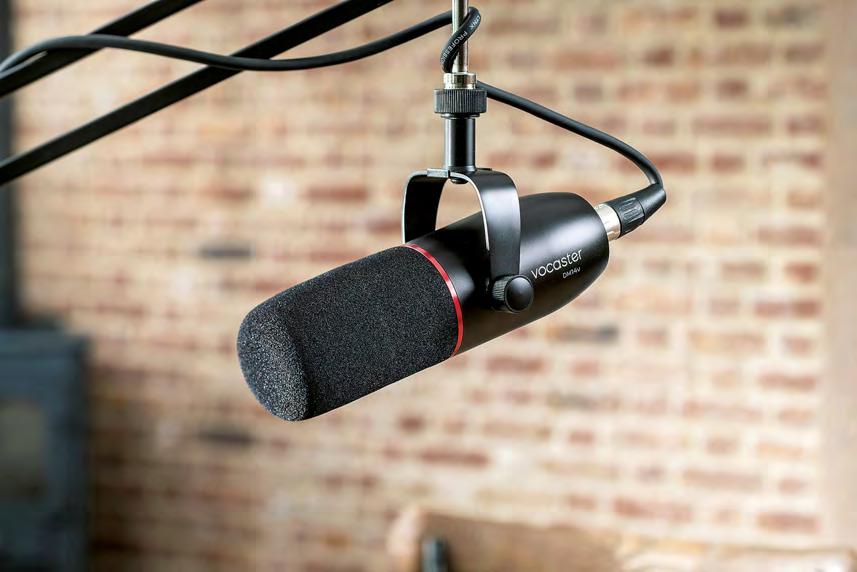

The DM14v is a low-sensitivity cardioid polar microphone designed for focused
NEW IP-BASED Studer products have been unveiled by Evertz that include several additions and upgrades to the range as Evertz focuses on integrating Studer technology into its own live production workflows. Studer Vista digital consoles and Infinity Core audio mixing and processing are now part of Evertz Software Defined Video Networking (SDVN) solutions, resulting in the release of the Vista 1 Carbon and Infinity-ST server core.
The Vista 1 Carbon is a 22-fader, all-in-one compact console designed for live events, broadcasting, remote and OB productions that boasts a digital signal processing engine offering over 1,000 channels and busses, and more than 6,000 physical I/Os. The console uses the same application soft ware across the entire range, providing a painless transition from one console to another, whether working on the Vista 1 Carbon or the 72-fader flagship Vista X. In addition to the Vista 1 Carbon, the new Studer Infinity-ST server core, which features a new CoreLink card audio interface that provides both IP-based ST 2110-30 and Studer proprietary A-link native connectivity, has been introduced. With more than 6,000 inputs and outputs, the Infinity
ST1100’s CPU technology also boasts 1,100 simultaneous DSP channels and busses to mix, resulting in a cost-effective alternative for those not needing high-level horsepower. The Infinity-ST series maintains Studer’s sample-locked 100% redundancy option, providing extra protection for highstake productions.
Completing Evertz’s new Studer line-up is the Micro Series, a digital audio mixing system in a compact package that is said to give users all of the tools needed in a single box. Consisting of the core unit, a graphical
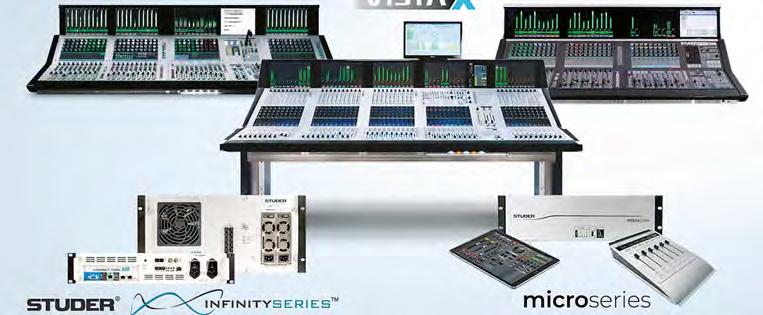
user interface and an optional fader control surface, the Micro Series is intended for use in radio and TV broadcast, production studios, ENG/DSNG and more. Its HTML5based user interface means that the unit can be fully controlled from the web browser on virtually any tablet or computer. Evertz has also launched new solutions to assist transition to IP. NEXX is described as a compact and robust 12G-SDI product that is fully passive and has a modular-based frame and main interface/backplane that offers redundant control and ease-of-swapping
I/O modules. With native full audio shuffling and ability to tap into additional licenceenabled features, the platform also offers an integrated, software-enabled multiviewer.
The ev670-X30-HW-V2 Virtualized Media Processing Platform has been designed to make the management of high-quality video signals easier and more efficient. Supporting both 12G/3G/HD-SDI and IP interfaces, the device also features new applications (APPS) that can be configured on the platform’s FPGA-based processing cores to provide multiviewers, gateway and video, audio and ancillary data processing functionality for both SDI and IP.
Finally, the MAGNUM-OS orchestration, control and analytics system is most suited to OB trucks, remote and largescale broadcast facilities and facilities with multiple locations. The system’s bandwidth management ensures that large volumes of SMPTE ST 2110 signals, including critical PTP signals, can be moved and managed to and from devices spread across facilities, or multiple facilities, using 25/50/100/400GbE network connections.
www.evertz.com
DIGICO HAS unveiled a theatre-specific variant of its Quantum3 38 mixing console. Building on the audio performance offered by the standard model, the Quantum3 38T provides theatre sound designers and mixers a programming and operating workflow that enhances the cue system with the manufacturer’s Auto Update and cue data management tools.
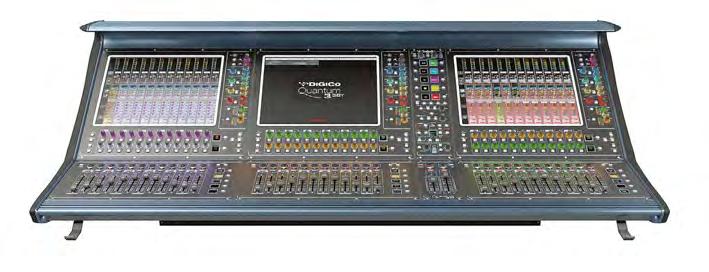
Auto Update allows designers to establish intricate inter-cue relationships, with changes made to channel settings automatically propagating to other related cues. Character variations, often a result of costume and prop changes, are handled with the Alias function, and cast changes
are managed through the Players function. The desk’s channel processing and mixing functions are identical to its live focused counterpart, but the crosspoint matrix gains individual nodal delays and matrix aliases. This enhanced matrixing system plays an important role within complex theatre output processing and has reportedly been achieved without compromising any of the unit’s general processing capabilities. The manufacturer’s theatre-specific software extension can be added to any Quantum3 38 with a simple unlock code to enable the features.
www.digico.biz
FUNKTION-ONE HAS launched the Evo X. Utilising the manufacturer’s waveguide technology, it provides 90° horizontal dispersion and high SPL. The Evo X is suited to live venues, small clubs and theatres, due to its ability to be deployed to a one-per-side or four-point system. Its 15° vertical dispersion is said to ensure the sound is concentrated on the audience, minimising reflections and room excitement. Featuring the same isophase diffraction high-frequency waveguide technology as the Vero VX, the Evo X’s optimal audience area is around 10m x 10m.
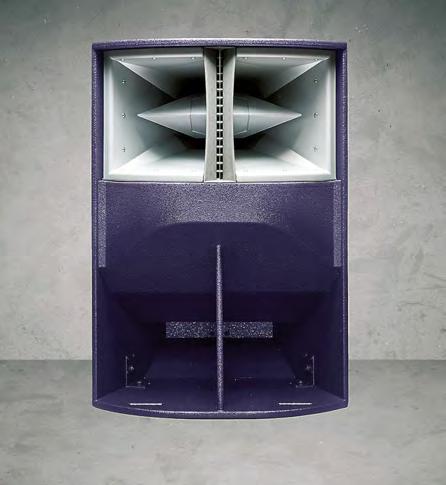
Operating across a 50Hz–18kHz band width, the speaker reportedly works well alongside the manufacturer’s F Series and BR Range bass speakers for low-frequency energy. The wide bandwidth 8-inch midrange extends to 5kHz, minimising stress on the 1-inch high-frequency driver, while the 15-inch mid-bass handles 50–280Hz.
The Evo X weighs 47kg, measures 604mm x 859mm x 540mm (WxHxD) and is available with a custom wheel board
which cradles the loudspeaker’s curved front. It is available in a range of colours.
www.funktion-one.com
HAVING BUILT up its L-series of pro-ribbon line array modules into a comprehensive range to bring hi-fi sound quality to any size venue, Alcons Audio has released the LR24/120 mid-size array, intended to be an important extra tool for medium and larger applications. The LR24/120 is designed to complement the narrower dispersion, longer throw of the LR24/90.
The three-way, bi-amped LR24/120 features the bespoke RBN1202rs 12-inch pro-ribbon transducer with acoustically and electronically symmetrical component configuration, delivering a natural cylindrical wavefront with pattern control in both the vertical and horizontal plane. Thanks to the RBN1202’s power handling of 2,500W, enabled by its 12-inch voice coil and an RMSto-peak ratio of 1:15 from 1kHz–20kHz, high intelligibility is complemented by dynamic headroom reserve.
The pro-ribbon driver is complemented by a mid-frequency section comprising two 6.5-inch midrange transducers with a neod y mium motor structure. The lowfrequency section features new-generation 12-inch transducers, fitted with a large, dual
3.5-inch voice coil neodymium motor. As with all L-series systems, this is assisted by Signal Integrity Sensing (SIS) pre-wiring. This circuit ensures dynamic cable/connector compensation between the LR24/120 and the Sentinel amplified loudspeaker controller which powers it, providing undistorted, natural sound reproduction regardless of cable length and amplifier impedance load. The flying system facilitates both compressed and non-compressed suspension, while enabling angle-setting on the cabinets without lifting the array. It has a WLL of 24 cabinets under 10:1 safety.
B&C SPEAKERS’ DCX354 coaxial ring radiator is a more compact version of the company’s DCX464 and features a patent-pending diaphragm shape which provides extended low-frequency bandwidth by progressively decoupling the outer diameter as the frequency rises. The company says that following field experience and customer testing, it wrote new mathematic modelling techniques from scratch to evaluate dozens of potential diaphragm shapes in a day.
The 3-inch midrange voice coil handles 180W, while the 2-inch voice coil highfrequency diaphragm covers 5–20kHz with 111.6dB sensitivity and handles 100W. Its midrange diaphragm can cover 400Hz–6kHz with 112.7dB sensitivity. A redesigned, patented midrange integrator allows both diaphragms to work in harmony over a wide bandwidth for greater combined output and crossover flexibility.
Alcons has also introduced its LFE18sl subwoofer, a slim-sized reference subwoofer system for demanding listening applications, delivering an accurate bass and sub response for “a maximum quality aural and sensory performance”. As part of the Cinema Reference Monitor System, the manufacturer has focused on obtaining a linear response in the operating bandwidth, while handling ultra-low-frequency transients with maximum control.
The 18-inch custom-designed woofer features a large motor structure with dual 3-inch voice coils offering a 30mm excursion, reportedly resulting in 10dB more excursion than a traditional (pro) 18-inch woofer. The direct-radiating transducer mounted in the sealed cabinet enables an in-room response below 10Hz. The driver is pre-wired for the Signal Integrity Sensing (SIS) compensating circuit which claims to deliver an accurate reproduction for even the lowest octaves.
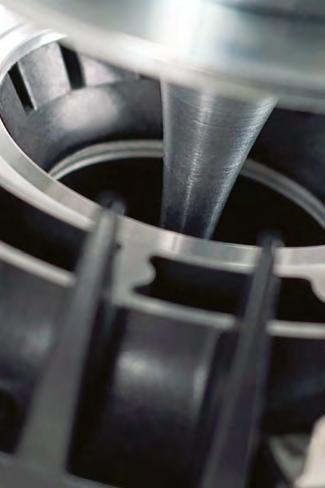

In brief, Alcons’ proprietary ALC software program, ALControl, has been upgraded to v1.72. The update includes support for the different device startup modes (standby, on, previous) and for displaying the AES/EBU sample rate input of the Sentinel.

MEYER SOUND has added three loudspeakers and a subwoofer as standalone endpoints for direct connection to any AVB network compliant with the Milan interoperability protocol. The Milan input versions of the Ultra-X20, Ultra-X22 and Ultra-X23 full-range loudspeakers and the USW112P compact subwoofer accept audio signals from any Milan-certified source via a certified switch. A single RJ45 connector carries highresolution digital audio in addition to telemetry data for remote monitoring.
The availability of Milancertified speaker systems enables complete network AV solutions that offer simplified management and
JBL HAS introduced the PRX900 Series, comprising three powered two-way loudspeakers and two powered subwoofers, built from the ground up to leverage its latest acoustic innovations. A new proprietary driver system, powered by Class-D amplifiers, is combined with improved dispersion and beam width as well as complete Bluetooth Low Energy (BLE) control via the JBL Pro Connect app.
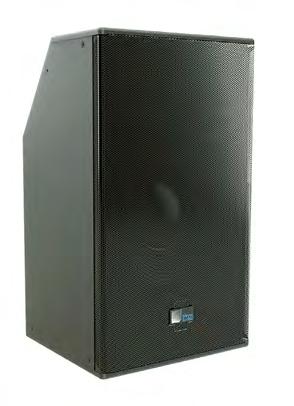
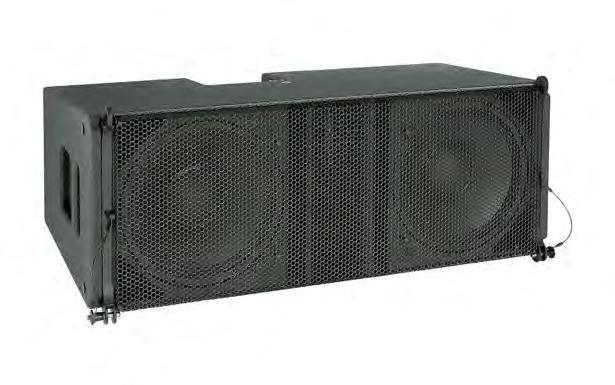
The series integrates JBL’s patented 2408H-2 1.5-inch compression drivers with poly-annular diaphragms and neodymium magnets which are paired with updated JBL Image Control Waveguides to deliver consistent beamwidth and frequency dispersion. An FEA flared port design
for the woofers reportedly reduces air noise and distortion. Producing up to 134dB down to 30Hz, the series can support large performance spaces with high power and performance requirements.
Accessible via onboard LCDs and the Pro Connect app, the PRX900 Series’ integrated DSP includes 12-band parametric EQ for system tuning and tonal control, as well as integrated dbx Drive Rack technology featuring live and
control in addition to a more cost-effective installation using IT industry infrastructures. Network solutions also maintain a fully digital workflow to the endpoint, eliminating conversion stages that add latency and degrade performance. All four models incorporate Milan-certified input modules together with a Neutrik etherCON TOP network connector and a powerCON TOP AC line connector for weather-resistant connections. Remote monitoring capability is also included and utilises the common network connection rather than separate wiring.
www.avnu.org www.meyersound.com
fixed Automatic Feedback Suppression with Soundcraft’s Overeasy option and speaker delay settings and presets.
Designed to withstand the rigours of the road, the rigid composite loudspeaker cabinets feature computer-modelled ribbing for optimal acoustic performance and durability, while the subwoofers are housed in 18mm birch cabinets with optimised bracing for accurate lowfrequency response.
The JBL Pro Connect app can be used to control up to 10 speakers as well as integrate the PRX900 with JBL EON ONE MK2, PRX ONE and EON700 systems to access app-only functions such as speaker snapshots and grouping.
OPTIMAL AUDIO has announced new additions to its Cuboid line-up of loudspeakers, with four models unveiled available in either black or white. The new cabinets comprise of the Cuboid 3, Cuboid 3TX, Cuboid 5 and Cuboid 5TX.
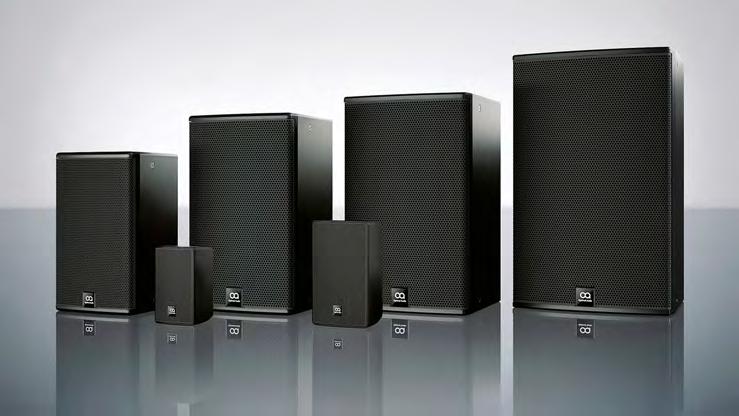
The Cuboid 3 is a full-range, two-way, passive 3-inch loudspeaker designed to give exceptional sound quality in a very small form factor for distributed applications with high-quality background music and speech reproduction. Included mounting hardware allows for fixing in either portrait or landscape orientation for installation flexibility. A weatherproof terminal cover is available as an
aftermarket accessory for outdoor use, giving the cabinet an IP54 rating. It features a 3.5-inch low-frequency driver and a 0.5-inch PEI dome high-frequency driver mated to a shallow waveguide for consistent HF distribution.
The Cuboid 3TX variant adds a transformer that enables the speakers to run on a series of 70V or 100V taps or at low impedance. Tap selection is via a rotary switch on the rear of the cabinet. The Cuboid 5 and Cuboid 5TX follow in similar fashion but instead feature a 5.25-inch low-frequency driver and a 0.75-inch HF driver.
www.optimal-audio.co.uk

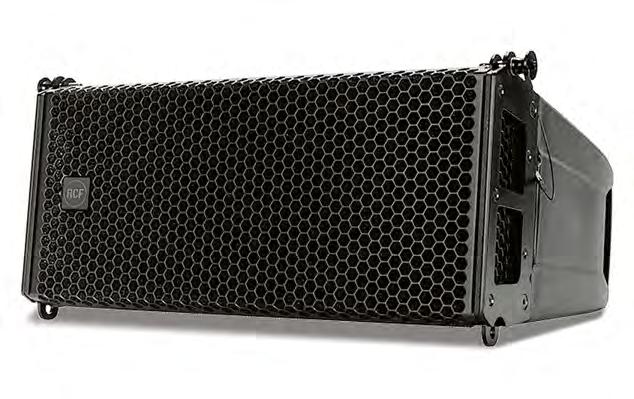
THE HL 6 from RCF is a two-way, fullrange system, most suited for when line array performance and a fast and easy setup are needed. The concept of this speaker derives from the touring industry, resulting in a compact cabinet with all the experience of RCF professional sound. The HL 6 features RCF transducers, two 6-inch woofers for a solid bass reproduction,
frequency range of 45Hz–20kHz (–10dB), the biamp module registers a 1,500W AES power rating that can produce a maximum output of 138dB SPL. Three variations of the Q 15 are available, offering varying vertical directivity in the form of the Q 15-P (40°), Q 15 (60°) or Q 15-L (90°) models.
In brief, the NXW 44-A is an active two-
DESIGNED FOR live music, vocal reinforcement and audio playback in a wide variety of applications, Electro-Voice has released the EVERSE 8 battery-powered loudspeaker. The portable, wireless enclosure can be remotely controlled via the QuickSmart Mobile app and Bluetooth.
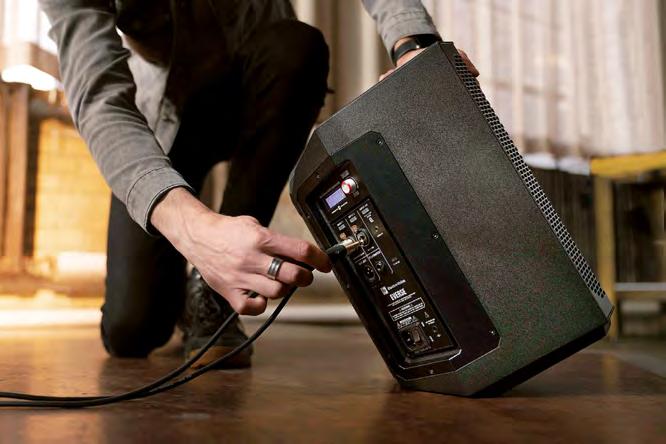
Combining a maximum SPL rating of 121dB with even 100° x 100° coverage, EVERSE 8 comprises an 8-inch woofer mounted using EV’s Signal Synchronized Transducers (SST) port design, and a titanium tweeter mounted onto a constant-directivity waveguide. Housed
it can no longer be recharged, including long periods in storage. Tool-free screws ease the removal of the battery pack.
EVERSE 8’s flexible features encourage an input to output self-contained setup. Wireless control and monitoring performed from the EV QuickSmart Mobile app includes adjustments to the audio, effects and mix functions via phone or tablet. An integrated 12V DC port connecting the EVERSE 8 battery promotes its use with RE3 or R300 wireless microphone receivers
compression driver mounted on a precise 100° x 10° waveguide to deliver vocal clarity with high definition and dynamic.
The HL 35-S is the flyable bass complement for the HL 6 array system. It features a Baltic birch plywood cabinet housing one 4-inch voice coil, a 15-inch neodymium woofer to handle frequencies from 40–140Hz with the maximum linearity and lowest distortion. The hardware is designed for an easy and fast setup, compatible with the HL 6 rigging. The heavy-duty front grille is powder coated. A special transparent-to-sound foam backing inside helps to further protect the transducers from dust.
in a weatherised black or white polypropylene enclosure, the 8-inch model is driven by a Class-D amplifier and DSP module developed by Dynacord. A built-in four-channel digital mixer with studio-quality effects, feedback suppression and audio ducking are included.
Fully optimised to provide 12 hours of continuous audio operation, EVERSE 8 is powered by a high-capacity Li-ion battery pack. Protection circuitry reduces the risk of the battery discharging to such a low voltage that
Bluetooth True Wireless Stereo streaming is available for stereo setups and a charging port is included for mobile devices when streaming. Integrating an IP43-rated weatherised input cover, rubber feet and a soft-touch handle, the ergonomically polypropylene enclosure can be mounted on a tripod, deployed as a stage wedge using the 55° monitor angle or positioned upright with the 30° kick-back angle.
The SUB 8008-AS is a double 18-inch high-power active subwoofer for live bands, DJs, nightclubs and rental companies. It employs an RCF-designed transducer featuring a high-power ceramic magnetic circuit with a 4-inch voice coil. The power amplifier manages high currents for up to 4,400W, delivering sound pressure levels up to 137dB. Rear panel controls include 12 presets, crossover frequency, polarity switch, deep/punch selection, cardioid and output delay settings. The subwoofer is produced in a tour-ready, rugged, all-wood cabinet with a scratch-resistant polyurea coating.
Primarily designed for mid- to longthrow applications demanding accurate speech and music reproduction, RCF has launched a compact, point source loudspeaker. The two-way Q 15 combines an RCF precision 15-inch neodymium woofer with an ND940 4-inch voice coil and a 4-inch titanium-neodymium compression driver. Operating within a
for a range of users, from bands to DJs, clubs and rental companies. Its combination of RCF transducers and a 2,100W two-channel Class-D amp produces coherent 100° x 50° coverage for the listening area up to 135dB SPL.
Finally, the BT Board DMA can be paired with a DMA amplifier to provide Bluetooth connectivity on a mobile device. This makes is possible not only to send audio from a mobile device to the amplifier, but also control levels and EQ via an Android or iOS app.
www.rcf.it
NEXT Audiogroup has launched its Pro Series, consisting of both active and passive point source speakers, suitable for installed and portable setups. The series has been designed to deliver high output and dynamics, extreme linearity and fidelity and is aimed at hotels, restaurants, bars, lounges, conference rooms, DJs and musicians. The speakers work equally well as floor monitors (Pro12 and Pro15 only), on tripod stands or as a flying system with a wide range of rigging points. The cabinets are constructed using premiumquality 15mm plywood with a polyurethane coating and a powder-coated steel grille with acoustical foam.
The Pro12A and Pro15A have a two-channel mixer with Bluetooth included and five presets. Users can connect any instrument, microphone, CD player or audio mixer to the active Pro Series input. The Pro speakers can be connected to each other using the Mix Out connector. An active external subwoofer can also be added to extend the system frequency response.
The Pro12 and Pro15 speakers are equipped with two NL4 speaker connectors located on the back plate to reportedly provide reliable connections with an easy link-through to the cabinets. An optional U-Bracket allows mounting both horizontally and vertically with a total angle adjustment
span of 115°. Depending on the adjustment bolt used, the final speaker’s angle may vary (100° to –15°, 10° to –105° or –80° to –195°). A two-axis wall bracket can be used on the Pro12 passive speaker. The
adjustment angle span will vary according to the selected pan and tilt angles (to a maximum of 30°).
www.nextaudiogroup.com

in the coverage area. The pickup pattern has also been readjusted to better match customer selection for Narrow, Medium and
resulting in improved onsite interaction during meetings.
The woofer and tweeter levels of Stem Speaker, as well as crossover frequency, have been calibrated, resulting in improvements to playback sound quality. Device output level has been balanced with the rest of the ecosystem for even coverage in rooms with multiple Stem audio components. Lastly, Stem Table has gained a finetuned playback and microphone pickup, creating improved double-talk performance and a better experience for meeting participants.
The series’ Ceiling array now boasts improved performance, sensitivity and sound quality to yield better pickup of voices and better rejection of room noise and reverberation. The result is reportedly clear voice reproduction for all participants
tone for high-quality reproduction of both speech and other programme material, resulting in increased intelligibility during calls and more pleasant use of the system. The microphone array has also been tuned for better tonality and voice pickup,
The series as a whole enjoys additional improvements, including echo cancellation and system sounds, such as push-button chime level. Because Stem devices have auto-updates enabled by default, all Stem Ecosystem products connected to a network with internet access and on default settings will update automatically overnight. Elsewhere, Shure’s podcasting and hybrid working MV7 microphone is now Zoom certified, becoming one of the first to be certified under the ProMic
category of Zoom’s Personal Workspace Certified Hardware. The company has also announced that its Microflex Advance MXA920 ceiling array microphone together with the IntelliMix room audio processing software have received Zoom Rooms Hardware Certification when paired with the Microflex MXN5W-C networked loudspeaker.
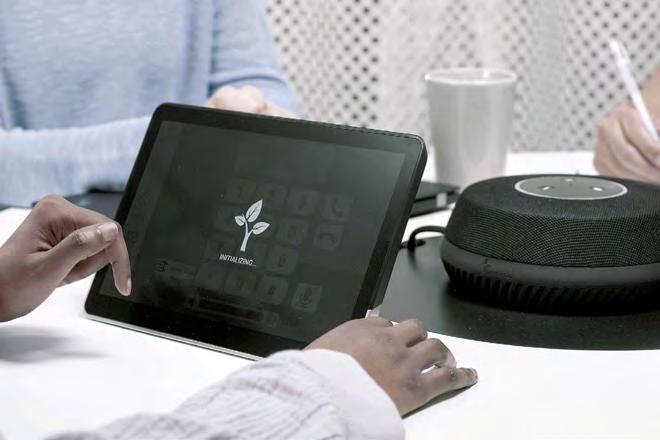
www.shure.com
THE STUDIOMASTER CORE is a selfpowered, hi-mid top and sub stack, suitable for portable sound reinforcement applications, including in large and medium-sized venues where wider constant frequency coverage is required. To achieve this coverage, CORE employs a curve array hi-mid cabinet, together with a self-powered, active sub.


The precision curvature of the CORE hi-mid cabinet emulates a three-element fixed curvature array, producing a 100° horizontal signal and 70° vertical coverage, extending to the outer reaches of an auditorium, right down to the front of the stage.
CORE has two variants – the CORE 121 and CORE 151 – with 5- and 8-inch MF drivers respectively, rather than the 2-inch or smaller drivers more usually deployed in this product class. In the CORE 121, these are matched with nine 1-inch dome HF drivers and 12 1-inch dome tweeters in the CORE 151. This gives the two CORE curvature arrays an accurate response across the full mid- and high-frequency spectrum.
The mixer module and connector panel are mounted at a convenient angle for ease of use and provide two mic/line, a Hi-z
instrument and stereo line level inputs, Bluetooth audio connectivity, selectable link outputs and an independent sub level. DSP processing includes presets for DJ, music or vocal applications and provides access to three-band EQ, limiter, output delay, master volume and channel metering. Power and audio signals are transmitted from the sub to the curve array via the adjustable air-suspension speaker pole and a top hat connector, eliminating external cabling.
V2.5 FIRMWARE for the Shure Stem Audio ecosystem is said to have brought significant improvements in clarity, more

PAN ACOUSTICS has extended its Pan Accessories series with the VESA Speaker Mount. The mount allows an “uncomplicated and quick installation” of Pan Acoustics line source speakers on all common displays. The VESA Speaker Mount is mounted as an adapter between the display and the existing VESA mount. The smaller VSM model is suitable for use on displays
measuring 55–65 inches, while the larger VSM XL variant can be used on 75- to 98-inch displays. The mount consists of just a few parts and is designed so that the speakers can be mounted and aligned precisely with the frame of the display and flush-mount with the display front.
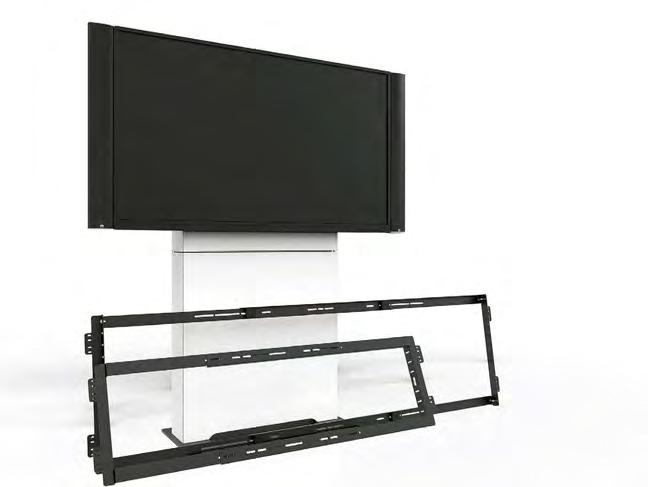
www.pan-acoustics.de
DESIGNED FOR any sound reinforcement application requiring a high-fidelity compact loudspeaker, Quest Engineering has added a 4-inch two-way ceiling speaker to its current catalogue. The MX4C comprises a die-cast aluminium woofer with a titanium dome tweeter housed in an ABS fire-rated baffle with an aluminium back can. It also features 70V/100V/16Ω operation together with HF attenuation, located on the front baffle and hidden behind a fast-fit magnetic grille. Available
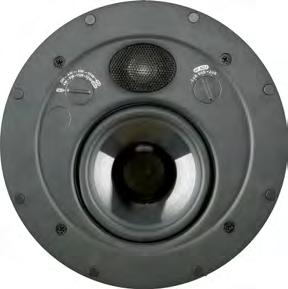
in black or white, the MX4C can produce a maximum SPL of 104dB (–10dB) across a 160° x 130° directivity plain.
Measuring 1⁄3U wide and 1U high, the QX-300 series commercial amplifiers combine a small form factor with Class-D technology. Wall and table mount options
STAKING ITS claim as the flagship subwoofer in the Trinity family, PK Sound has created the T218 to supplement the low frequencies of its robotically controlled line array elements.
Measuring 1,395mm x 518mm x 780mm (WxHxD) and weighing 105kg, the low-profile enclosure operates within a 25–100Hz frequency range (–3dB) and has an inbuilt crossover set at 80Hz.
Featuring dual front-loaded, long-excursion 18-inch transducers in a bass-reflex design, an unrestricted vent has been inserted to
In other news, fourth-generation DSP presets for Trinity have been released. Developed in collaboration with Paul Bauman, PK Sound CEO Jeremy Bridge and top designers and FOH engineers, the V4 presets deliver increased max SPLs, smoother coverage across all variable symmetric, asymmetric and tapered horizontal configurations, and additional tools to mitigate noise pollution.
Available to all current owners and users, the revamped presets have extended the max SPL levels to 151.4dB for Trinity Black large-format
offer flexibility, although 10 units can be mounted in a 3U rack space. When in standby mode, the dual 150W amplifier draws under 0.5W of power, making the QX-300A series both Green Energy Star and ErP 1275/2008/ EC compliant. Lo-Z (4Ω–16Ω) operation

and Hi-Z (70V/100V) loudspeaker configurations are catered for and adjusted using the auto load sensing technology. A custom die-cast base coupled with protection circuits (short-circuit, DC, under voltage, overload and temperature) and temperature-controlled fan cooling enhance reliability. Furthermore, Dante/ AES67 networking connectivity is available with the QX-300D model.
www.questaudio.net
Integrated rigging hardware can cater for up to 16 T218 modules to be flown in a column, or ground-stacked securely. Housed in high-grade Baltic birch and finished in an EXL polyurea coating, the T218 can produce a maximum output of 144dB SPL.
source elements. Furthermore, there is improved cardioid performance and new crossover options for T218 subwoofers and a low-latency mode for T10 and T218 modules.
DRAWMER HAS released the 1972 dual mic/line and instrument mic preamplifier, said to be a unit dedicated to flexibility with “a unique feature set and simple operation”. Created for use both at home and in professional studio and live sound applications, the 1972 is handcrafted with an all-steel chassis. It sports two identical channels of analogue pre-amplification in a 1U rack chassis. Key to the 1972’s versatility is the Select input source switch. It has six switch positions to cover the ¼-inch front panel instrument input jack for guitars, basses or electronic keyboards and five more positions covering separate rear panel XLR input jacks for microphones with/without 48V phantom powering or line level input sources. Other switch positions are provided to match microphones with 200Ω, 600Ω or 2,400Ω impedances.
Up to 66dB of clean gain in 6dB steps is provided by THAT Corp Technology using a 12-position rotary Gain switch. The switch’s detents aim to make it easy to recall settings from previous sessions. Input levels are monitored on a five LED colour-coded metre directly above the Input Gain control and a compact VU meter monitors the final Output level.
Front panel controls continue with a Phase reverse button and the switchable semiparametric Lo and HiCut filter section, also working as a very smooth bandpass filter. The LoCut section is switchable in/out and is a 12dB/octave filter with the ability to sweep any frequency between 15–350Hz. The HiCut or low-pass half of this filter ranges from 1.5–20kHz and is also a 12dB/octave design.
Unique to the 1972 is Lift, a low-level, upward expander. When switched in, Lift adds gain to input signals below a level of –30dB and continues adding gain until a level of 0dB is reached. Furthermore, starting at –30dB, the amount of added gain is gradually reduced as the average level approaches 0dB.
Another feature of 1972 is Shape, designed to be used as an instant sonic fixer. It consists of two separate fixedfrequency tilt or seesaw equalisers centred at 500Hz. Low Shape will provide up to a 2.5dB boost at 40Hz and, at the same time, attenuates –2.5dB at 10kHz. Conversely, Hi Shape reduces by 2.5dB at 40Hz and, at the same time, boosts up to 2.5dB at 10kHz. With both Low and High Shape buttons engaged, a useful “scoop” centred at 500Hz is generated.
www.drawmer.com
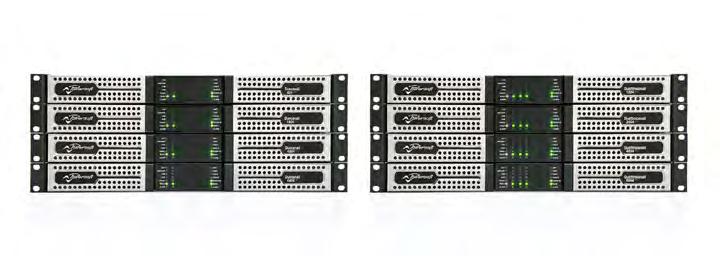
in various applications, while miniature rear-mounted switches provide the ability to daisy-chain inputs from one channel to
Input connections are performed with three-pin terminal block connectors, with output connections via a four-pin terminal block connector. The CEP408 offers four channels and has an output power of 80W, while the CEP803 offers eight channels and has an output power of 30W. Both are Energy Star-compliant, which can be enabled or disabled with a standby
POWERSOFT HAS further enhanced its fixed-install product range by introducing AES67-compatible versions of its Duecanali and Quattrocanali amplifier platforms. The new models, called Duecanali DSP+ and Quattrocanali DSP+, are able to receive audio-over-IP (AoIP) streams compliant with the AES67 standard, allowing for high-performance streaming AoIP interoperability across different networking systems.
2404 DSP+, 4804 DSP+ and 8804 DSP+) can receive AES67 streams natively by connecting the dedicated AoIP networking port to an AES67 network. The new DSP+ amplifiers are supported by a new version of ArmoníaPlus, the Italian manufacturer’s system design, control and monitoring software. All Powersoft amplifiers featuring a Dante card can also be configured to work with AES67 audio streams by enabling AES67 mode in ArmoníaPlus or
Connect series of multi-zone installation amplifiers with the addition of four 2U rackmountable models. Designed for commercial installation projects such as shopping centres and large-scale paging and distribution systems, the DSP amplifiers deliver flexible, reliable power output with total system power offerings of 1,000W, 1,500W, 2,000W and 3,000W. Incorporating Pascal UMAC L-PRO amp modules, the PowerZone Connect 1002, 1502, 2004 and 3004 amplifiers can output full system power with a maximum channel count in Lo-Z (4Ω) or employ half the channel count with double the channel power for Hi-Z operation. The two four-channel models allow for the creation of hybrid output setups (Lo-Z + Hi-Z) with a single amplifier. A full matrix DSP design offering system configuration and control via the Danish manufacturer’s PowerZone Control browserbased web app is available. The application can be used to configure and manage audio zones, inputs/outputs, firmware updates and the importation of loudspeaker presets with access to EQ settings from a smartphone, tablet or PC when connected through the amplifier’s built-in Wi-Fi or RJ45 network port. In addition to the Lo-Z or Hi-Z outputs, rear connectivity includes four unbalanced RCA

input source and volume and can be configured for any room or location. Designed for commercial use in bars, restaurants, cafés and retail stores, as well as locations like meeting rooms, auditoriums and schools, any Blaze PowerZone Connect amplifier can be controlled remotely with
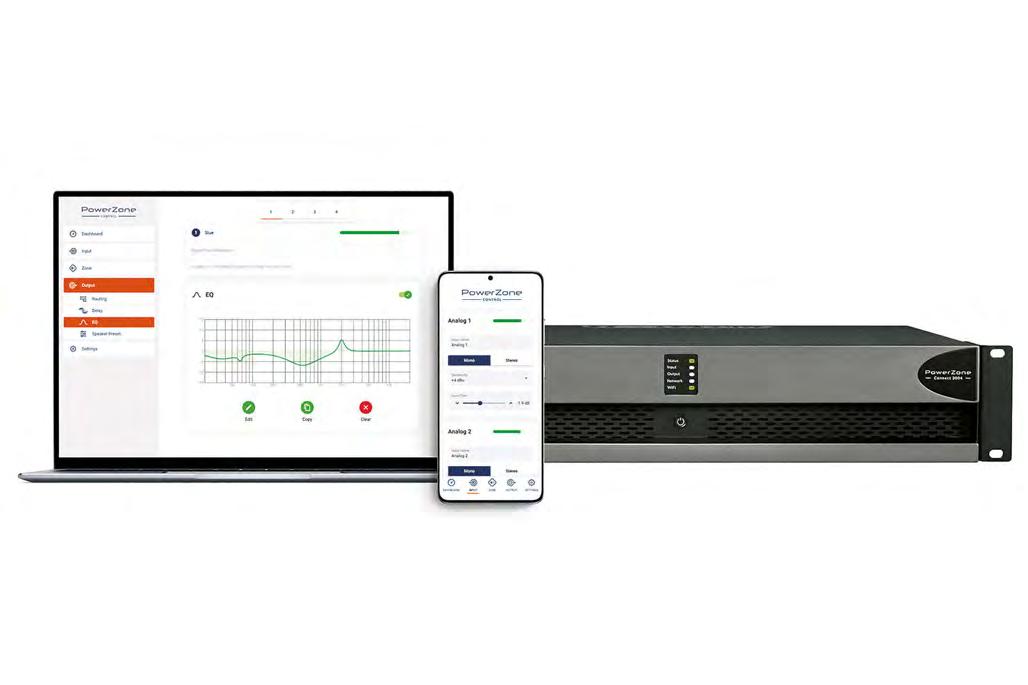
WITH THE launch of the B170S networked streaming stereo amplifier, Bluesound Professional has added an all-in-one streaming via Ethernet solution for commercial music installation. Continuing the brand’s multizone commercial music solutions, streaming services including SoundMachine and Custom Channels are integrated within the BluOSenabled network music player in the B170S for control with the BluOS Controller App. Combining a stereo low impedance and constant voltage amplifier with a BluOS-enabled network music player, the B170S’s amplifier section provides 2x80W of power into 4/8Ω, or 2x100W at 70V
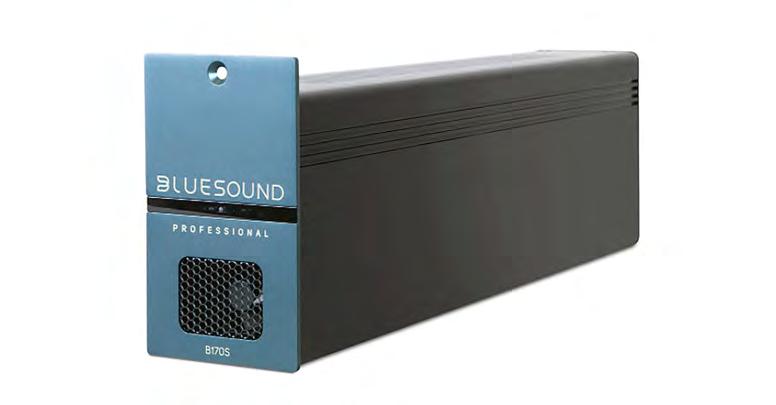
for each separate sound zone. It provides access to different tuning options, such as speaker EQ which can be imported from an approved library or created for a specific location.
For security, the unit has PIN code protection for access and the whole system
colour schemes, four screen brightness settings and four settings for the button light. The user interface and built-in colour schemes can also be modified to meet the needs of a specific location.
www.blaze-audio.com
installation of long chains of small speakers to be powered with
The low impedance factor serves applications requiring high intelligibility, whereas bulk speaker installations can be catered for with a constant voltage option incorporating daisy-chained speakers. With keyhole slots promoting flexible mounting options, the 3U height amplifier can be discreetly positioned under shelves, tables and walls. In addition to a thermostatic fan and a USB input, the B170S incorporates security preventing unauthorised control and offers unlimited grouping of zones within the BluOS system.
www.bluesoundprofessional.com

DATAPATH HAS released a new dedicated SDVoE capture card for real-
DESIGNED FOR both fixed installation and live music applications that require high-fidelity audio and high power specifications, HH Electronics has launched the M-Series of 2U rack amplifiers. Designed and engineered in the UK, the M-750D, M-1500D and M-2600D models comprise a Class-H toroidal power supply, linear power stage and comprehensive protection system.
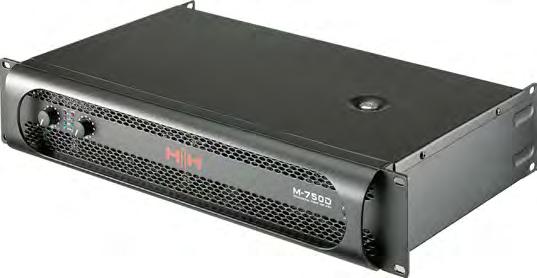
Featuring balanced XLR inputs, user-selectable input sensitivity, speakON connectors, binding post outputs, status indicators and comprehensive protection circuits, the three
amplifiers vary in weight between 12.5kg and 24.2kg. Incorporating power, input sensitivity and bridge/routing mode switches, the twochannel models also feature volume controls on both channels. Equipped with soft start, VHF, RF, short circuit, overload, clip limit and overheat protections, the M-750D, M-1500D and M-2600D amplifiers output 2x750W, 2x1,500W and 2x2,600W, respectively, in 4Ω stereo mode operation.
www.hhelectronics.com
FEATURING A slot-loading CD drive, Tascam has added the CD-RW900SX to its long line of CD recorders and players. In addition to offering analogue input gain controls for the left and right analogue inputs, the latest unit features independent trim control for the digital input for setting the optimal recording levels from a digital source. A variety of track division functions are included to make recording easier. Automatic Track Division creates a track marker based on the input level by effectively adding a new track when the input falls below a specified level, defined within a range from –24dB to –72dB. Furthermore, a rec-mute function can insert silence between tracks. Ideal for conference recording or applications when there is no gap between segments, the
Time Track Division function enables timebased track creation to be set every 1–10 minutes. By pressing the record key while the unit is in record mode, the Manual Track Division manually allows a new track to be written.
For playback, the 2U rack-mountable unit offers auto-cue, auto-ready, pitch control, repeat, playback and power-on playback capabilities. Power-on playback allows the CD-RW900SX to be cued up and automatically played the moment the power is enabled. Designed to minimise errors while writing to the disc, the CD/CDRW drive provides a stable platter. Ideal for seam l ess, continuous live recordings, track markers can be embedded without a gap. Should a disc become locked in the drive, an included emergency hole in the slot allows a pin or paperclip to be

the highest standards. With 4K/60 capability, the VisionSC-S2 card delivers an important part of the networked video mix. The SDVoE Alliance provides
a flexible way to route signals in high-end installations, but not all streams end up directly on a screen. They often need to be ingested into PC-based video controllers for manipulation, analysis or encoding. With Datapath’s dedicated SDVoE capture hardware, enough PCIe bandwidth is provided to transfer the full quality available in the SDVoE feed into an application, and with minimum added latency to ensure the end-to-end solution is fit for real-time applications. Furthermore, SDVoE technology is ideal for routing to media servers for long-distance, real-time signal processing where minimum latency is crucial.
www.datapath.co.uk
Triggers can be from different sources, such as parameter or status changes in the device itself, a MIDI or OSC command from an external device, a cron job (periodically recurring trigger) or can be created based on time. Device actions such as gains, mutes, snapshot recalls, input manager switches and EARS source selection or GPOs can also be triggered, and it is possible to send custom-defined messages via OSC and MIDI, or to hosts via HTTP, UDP or TCP commands.
In addition to this, the manufacturer’s Disaster Recovery solution – a component of its EARS feature which was used for the first time on the 2022 Eurovision Song Contest – has been made more secure.
memory to ensure smooth playback, even if shock or vibration lasts for upwards of 4s. Accommodating a wide range of sound sources, the rear panels include unbalanced analogue together with S/PDIF coaxial and optical connections provi d ed for connection flexibility.
that automatically starts/stops recording at a preset level spanning a range of –24dB to –72dB in 6dB increments, digital level adjustment and a key control playback function.
www.tascam.com
For the Prodigy series, a solution with a third multichannel audio source has been implemented, which is automatically selected in case the main and backup multichannel input (MADI or audio network) fail.
Further features have been added to the series as a whole, such as configurable crossfades for groups, as well as the automatic four-wire patch function for the Routing tab. For the Prodigy.MP specifically, a new IIR filter has been implemented – the First Order All Pass for Live Sound – which allows for phase rotation of 90° at selected frequencies. A newly added Solo Bus function makes it possible to route soloed channels to the Prodigy.MP’s summing busses 31/32. There are three modes of the feature: summing all soloed channels; replacing, where one soloed channel replaces the previously selected one; and a PA tuning mode, where the processed and clean signal is routed to the solo bus outputs automatically.
 time applications that meets the SDVoE
AN UPGRADE to DirectOut’s Prodigy series has introduced the availability of an Automater License for Prodigy.MC convertors and Prodigy.MP audio p roc e ssors. Automator allows for the ability to program triggers in order to run tasks in an automated fashion.
time applications that meets the SDVoE
AN UPGRADE to DirectOut’s Prodigy series has introduced the availability of an Automater License for Prodigy.MC convertors and Prodigy.MP audio p roc e ssors. Automator allows for the ability to program triggers in order to run tasks in an automated fashion.
DESIGNED FOR transportation, healthcare, commercial and industrial applications, AtlasIED has broadened the appeal of the GLOBALCOM product ecosystem with the release of the IP200 Series for announcement control and the IPSVR on-premise server model. At the heart of the GLOBALCOM enterprisewide mass communication, three models of AtlasIED IP200 Series controllers support varying VoIP requirements. The IP200 Announcement Control Server (ACS) supports VoIP and IEDNet+, the IP216-D ACS supports audio-overEthernet (AoE) functionality using Dante and the IP-216C ACS supports
CobraNet digital audio transport. All three ACS controllers integrate a preinstalled GCK Advanced Notification
T-CAS, GLOBALCOM.Flight, LookHear, DIRECTOR , plus a GCK or GDS-4WTM hardware upgrade. Suited for rack
compatibility with AtlasIED’s Atmosphere audio processing and control system. The companies collaborated to create
Application software which is configured via a Microsoft Windows application.
The IPSVR on-premise server incorporates ample processing power and hard drive storage to operate multiple AtlasIED solutions, including
environments requiring peak two-socket performance in a 1U chassis, the IPSVR features an Intel Xeon Quad core processor and solid-state drive storage. In brief, the manufacturer has announced RTI control platform
a control module specifically to enable RTI customers to manage Atmosphere directly through the RTI control and automation system.
www.atlasied.com
RIEDEL COMMUNICATIONS has unveiled Bolero 2.4 GHz. Instead of Bolero’s standard DECT band, the new iteration operates on the 2.4 GHz band, allowing customers in regions where DECT carrier frequencies are either limited or unavailable – such as China, India and South Korea – to navigate difficult RF environments.
Bolero 2.4 GHz uses a practically identical feature set and offers the same three network modes as the DECT version: Integrated, Standalone Link and Standalone 2110 (AES67). The 2.4 GHz band limits use to eight beltpacks per antenna instead of 10, but allows for connectivity anywhere, with just one “Global” region for 2.4 GHz antennas. The 2.4 GHz iteration also comes with Bolero’s high-clarity voice codec and its multipath tolerant receiver (ADR) technology adapted to 2.4 GHz, allowing the system to continuously adapt to changing RF reflection
environments. Other features include nearfield communication touch-and-go beltpack registration, an ergonomic, robust beltpack design and three modes: beltpack, desktop key panel or walkie-talkie.
While Bolero 2.4 GHz was developed primarily for Riedel’s international customers, regions in the US where the number of DECT carrier frequencies are limited can benefit from a hybrid 2.4 GHz and DECT system, enabling the creation of larger installations with a higher number of users in a limited space.
The manufacturer has also launched the Audio Monitoring App (AMA) for its 1200 Series SmartPanels. With the AMA –combined with Riedel’s Intercom App and Control Panel App – the RSP-1216HL and RSP-1232HL SmartPanels offer users audio streaming monitoring, intercom and control capabilities in a single keypanel, saving valuable rack space.
CREATED TO complement the DNS 2 and the DNS 8D, CEDAR Audio has produced its most portable model to date with the DNS 4 dialogue noise suppressor. Commanding a similar footprint to the DNS 2 with double the available channels, a Hirose HR-10 power input and mini-XLRs create multiple c onnec t ions. When switched on to the Learn function, the DNS algorithm identifies and adapts to the background noise, before adjusting the amount of noise attenuation required. Near-zero latency ensures no loss of lip-sync.

Measuring 185mm x 130mm x 45mm and weighing 750g, the DNS 4 is equipped with analogue line and ultra-low-noise microphone inputs with optional 48V phantom powering, AES3/AES11 digital


DESIGNED FROM the ground up over several years, Altair has introduced an IPbased intercom system. With a long history in the intercom industry, the Spanish audio manufacturer has increasingly migrated into the broadcast sector.
For the monitoring of audio streams, the AMA allows for a direct connection to any SMPTE ST 2110-30 (AES67) stream available on the network – either dynamically managed via NMOS or in a static IP/SDP-based configuration, mixing the audio directly inside the SmartPanel. The app can be configured via a dedicated configuration tool or a broadcast controller using the built-in API. In addition, the selection and management of monitored audio sources is described as simple and flexible. Users can monitor up to 16 stereo/mono SMPTE ST 2110-30 (AES67) streams in parallel. A total of 256 audio sources can be preconfigured and managed directly on the RSP-1216HL and RSP-1232HL SmartPanels via their high-resolution touch displays and intuitive interfaces.
www.riedel.net
inputs and both analogue and digital outputs. Enhancing its portability and flexibility, the DNS 4 can also operate on 12V power. Retaining the near-zero latency of its predecessors, the DNS 4 is suitable for use in location recording, live-to-air broadcasting and live sound applications.
www.cedaraudio.com
Equipped with an internal switch and LAN, the IPCom system bypasses the requirement for a physical intercom matrix. Supporting up to 128 groups and users, IPCom allows private calls, priority assignment for varying levels of team responsibility, the management of GPIO-based actions via its IPF-316 panel and the generation of cue light signals received by beltpacks and panels.
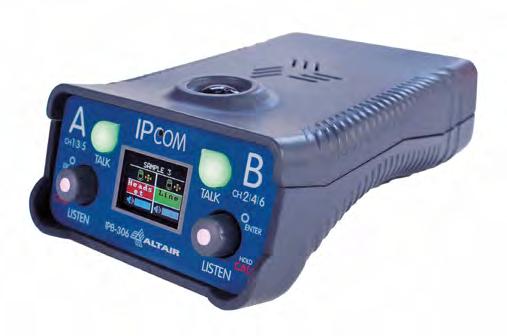
The IPF-316 can control 32 channels (16 keys, two pages) and the IPB-306 beltpack provides six channels, while the built-in mic and speaker allow it to operate as a remote station. Equipped with an IPX-301 4W/2W
interface, IPCom is compatible with all of
TV studios in mind, one wireless partyline system can be injected into an IPCom network.
www.altairaudio.com
THE DMXV TrussLink Stagebox series by KLOTZ has been designed for when audio signals and DMX signals have to be combined via a stagebox in professional use. The DMXV’s lightweight but robust aluminium housing is powder-coated black and features abrasion-resistant laser engraving.
a dense copper braiding with a coverage of 85%. The PVC jacket has an outer diameter of 6.7mm and can withstand a temperature range of –20° to +70°.
Despite the level of conductor cross-section and double shielding, cable flexibility provides
THE NEUTRIK Group recently completed two new Fibrefox production lines, now in operation, at the group’s Connex Oldenburg plant in Germany. As a result, the supply of Fibrefox products has been improved, with a one-third reduction in standard delivery times. The innovative hermaphroditic coupling (between the connector capable of both front and rear mounting) eliminates the need for adaptors and female and male mating halves. Available in two- and fourchannel variants, with either configuration compatible with the other, and other MIL-DTL-83526 specified systems, mating ability is improved. These are available as both preassembled network cables and as the Fibrefox briDge chassis connector, which fits into the classic Neutrik D-shape cutout.
It accommodates eight or 12 channels with RMP multipin connectors to the MIL-C-5015 standard. The paired Neutrik XLR 5p chassis jacks with hard gold-plated contacts can be used as either inputs or outputs. Flexibility is offered by the 12-channel DMXV-04FM version, which provides eight channels with XLR 5p and four channels with XLR 3p sockets. In addition to the eight DMX channels via XLR 5p, four channels can also be used for DMX via XLR 3p, AES/EBU or analogue microphone and line audio signals.
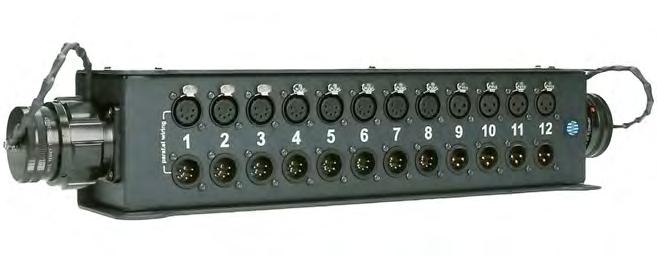
TrussLink stageboxes in the DMXV series can be used both on the floor and in the rig. For this purpose, the housing is equipped with non-slip rubber feet, an M10 thread on the bottom and four eyelets for safety ropes.
The manufacturer has also introduced two digital cable drums using Neutrik XLR 3p and 5p connectors and protective caps which both use KLOTZ’s OT234YS low-loss data cable. With a conductor cross-section of 0.34mm² (AWG 22/7), the company reports the cable has a particularly low signal attenuation which makes it suitable for long distances and is capable of transmitting both digital and analogue signals. Two shields protect against noise: one is Al-PET foil and the second is
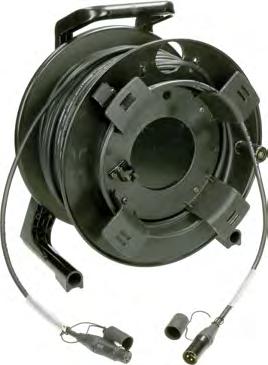

makes the OT234YS suitable for cable drums. The AES3N4YSD and DMX5N4YSD cable drums are made of break-resistant plastic and are equipped with a locking brake. At the outer reel core, the cable end is available in a length of 2m. Both cable ends are also provided with transparent shrink tubes for labelling. The cable drums are available in lengths from 50–200m.
www.klotz-ais.com
Following on, the Liechtenstein-based brand has made two new additions to its Fibrefox connector series, with the availability of the foxBRID and Fibrefox Rotary Joint. Suited to more industrial applications, the foxBRID is an expanded beam multimode hermaphroditic connector module. Available in two- and four-channel variants, the design ensures its ability for deployment where constant performance and total reliability are critical. The Fibrefox Rotary Joint is an expanded beam multimode solution which fits to standard optical ST connections. Offering IP56 protection, with two hermetically dust-tight chambers sealed by shaft seals, it is suitable for a wide range of engineering applications where rotation is a challenge.

Designed for use in rugged outdoor applications, Neutrik brand REAN’s weatherresistant Power X power connectors are moulded from V0 raw materials, rated to UL 94V-0 and are IP65-certified. Fully compatible with Neutrik powerCON True1 products, Power X connectors are compatible with a wide range of audio, lighting, video, film and TV broadcast applications.
The lockable power connectors are also designed with breaking capacity, which means they can be connected or disconnected under load or live. Power X Series components are certified according to EN/UL 60320-1 and accepted as a component for cord sets according to IEC 60799 to guarantee mains breaking capability.
www.neutrik.com
ITALIAN CABLE manufacturer Tasker has expanded its range of speaker cables for live events. The C282 super is an extrastrong 8x4mm² speaker cable realised with a crown-shaped grouping around a central PE filler that gives the cable a solid but also very flexible structure. It has been designed for mobile and rental installations where the cable needs to be continuously wound and unwound.
The C862 is a double 110Ω DMX light cable with aramidic fibre fillers and a PUR outer sheath, a special material that is flame-retardant, halogen-free and UV-, water-, chemical- and oil-resistant, and is most suited for outdoor and heavy-duty applications. The C862’s single-pair brother is the TSK1038 PUR, a 2x0.35mm² 110Ω DMX AES/EBU with high coverage shielding and the same sheath
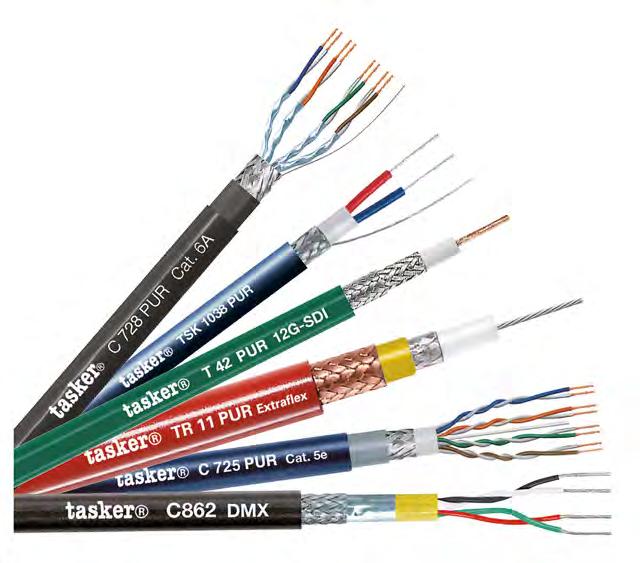
For users that need
to transmit digital audio and video as well as a classic data signal, the C725 PUR is a Cat5e cable suitable for digital audio applications using the Dante protocol. The C728 PUR has a larger section of 4x2x0.22mm² (24/7 AWG) and is designed for HDBaseT transmissions, while the C726 PUR is a Cat7 with a diameter of only 6mm.
For broadcasting, the T42 PUR is an extra flexible coaxial cable with multifilament formation and double braided shield in a tinned copper OFC which allows 12G-SDI video transmissions up to 70m. It may be necessary to use a triaxial cable that needs to be as flexible as possible to allow professional cameras to move freely. Finally, the TR11 PUR Extra Flex is a triaxial cable with a silver-plated conductor and shield.




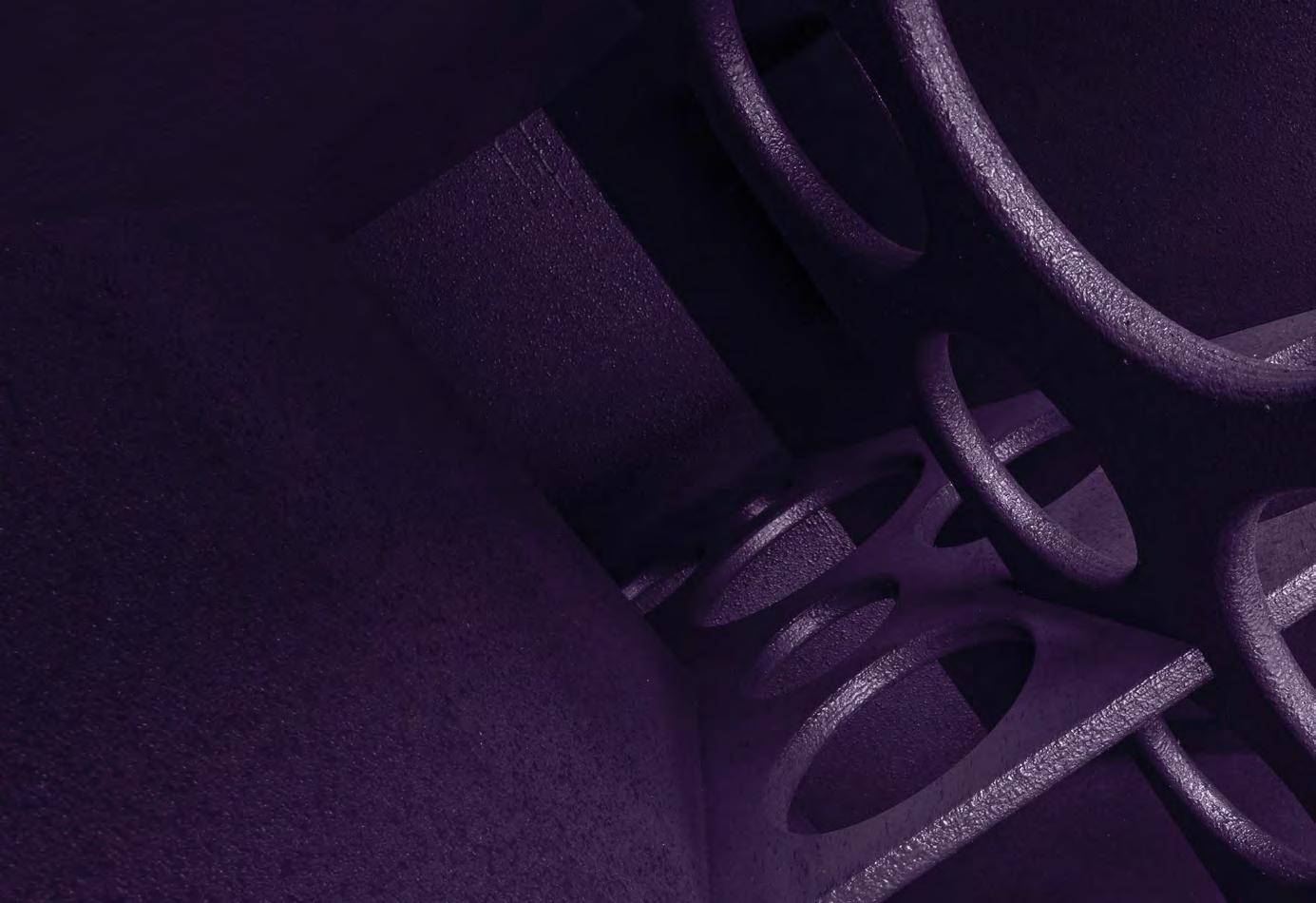
DESIGNED TO cater for current requirements in the IT, work, education and conference sectors, Sommer Cable has created a well-conceived product line around the latest USB-C connection. Under its own Cardinal DVM brand, a 10G USB 3.2 hub has been conceived as a clip-in module for the SYSWALL-45 switch frame series that fits within SYSFRAME45 desk installation frames and SYSTRUNK duct profiles in addition to other common 45mm connection units.
Available in matt white, high-gloss white, charcoal grey and silver finishes, the four connections with 10G bandwidth are available as dual USB Type-A and dual USB Type-C ports on the front side which also deliver 30W of charging power for connected terminal equipment. A USB Type-C upstream port is located on the rear with an additional power supply connector.

The DVM-194-PS5 USB-C power supply relies on GaN technology for fast, simultaneous charging of multiple USB-C and USB-A devices through a single power
outlet. The 85W system distributes power smartly across dual USB-A and dual USB-C connections for various charging standards
characterised by a nylon/cotton fabric textile cover firmly glued to the cable jacket. The fully extruded USB connectors
which can be optionally used with a clip-in Keystone housing in white or black for permanent installation.
Supporting 10Gbit/s USB 3.2 signals and combined with 4K60 video signals with 60W of charging power, the 6mm-diameter HI-UAOC series provides reliable transmission for USB -C cable lengths over 2m.
The manufacturer has also added the 580-0802FC to its expanding range of Cat8.1 network cables. With an overall diameter of 8.2mm and an AWG22/1 cross-section (0.62mm), the halogen-free LSZH jacket meets IEC 60332-1-2, IEC 60754-1/2 and IEC 61034-1/2 s tan d ards and is flame retardant with a B2ca high fire protection classification.
and power supplies. The compact design and the detachable AC cable promotes the unit to be integrated discreetly into furniture and behind connection panels.
Offering a maximum charging power of 100W and a data transfer rate of 20Gbit/s, the HI-U3CC USB 3.2x2 cable series is
are built into the aluminium housing and E-marker chips within the USB-C connector communicate with the connected devices to avoid overloads. The series includes 10Gbit/s USB-A – USB-C (HI-U3AC) and USB-A – USB-A versions (HI-U3AA) together with matching extension cables (HI-U3CF)
Supporting a transmission frequency of up to 2,000MHz in addition to a data rate of up to 40Gbit/s, the cable is suitable for high-speed Ethernet network connections between routers and switches in building infrastructure.
www.sommercable.com
AUDINATE, BOLIN forces to offer a single system that couples Yamaha’s ADECIA Conferencing systems with Bolin’s high-performing 4K and Full HD Dante AVnative PTZ cameras. The result provides systems integrators and end users with a system to create collaboration spaces with perfectly timed audio and video on one network switch.

Yamaha ADECIA is a family of audio products designed to be installed and integrated to provide communications solutions for meeting spaces or classroom audio. The ADECIA solutions are intended to help overcome challenges with implementation, configuration and room acoustics by providing all the components
required for a successful installation and automatic technologies that reduce setup time and complexities. The system offers three microphone options: ceiling, wired tabletop and wireless.
Bolin’s D Series Dante AV PTZ cameras – the D412 4K60 and D220 Full HD –provide high-quality video with extremely low latency and AV synchronisation. The D Series Dante AV cameras also offer quiet and smooth pan, tilt, and zoom capability and are fully compatible with all existing Dante audio and video www.audinate.com
SPECIFICALLY ENGINEERED to complement its classic line of mic pres, Automated Processes Inc (API) has expanded the API Select product range with the launch of the SV12 compressor and SV14 four-band EQ 500 Series modules.


The API Select SV12 features the original compressor circuit designed for the ATI Paragon live analogue mixing consoles. Re-engineered for the 500 Series format, the SV12 provides comprehensive compression with full LED metering of both output and gain reduction. Designed to protect sensitive, high-frequency content of the audio signal, the SV12 includes API’s patented Thrust circuitry. Two channels can be linked for use as a stereo compressor with true RMS power summing of the left and right signals.
Providing parametric EQ, the API Select SV14 EQ circuit design is re-engineered from the APSI 562 EQs of the 1970s. The SV14 also features an EQ in/out switch, transformer balanced output and dual
WITH THE Digiface Ravenna, RME and DirectOut have jointly created a mobile audio interface based on the Digiface Dante but featuring a Ravenna module. The device allows the transmission of 128 audio channels coming from Ravenna and MADI as an option via a single USB 3.0 connection for USB and standalone operation.
The fusion of RME’s drivers (Mac/Windows) and DirectOut’s Ravenna implementation are said to combine to produce a reliable and
concentric knobs for variable control of boost/cut and frequency selection.
www.apiaudio.com
flexible networked computer audio interface. DSP-based TotalMix FX can be used to control the routing and monitoring options, including the built-in headphone output. For networking, the interface features a Ravenna stack with AES67 and ST 2110-30/31 support and redundant audio-over-IP streaming as
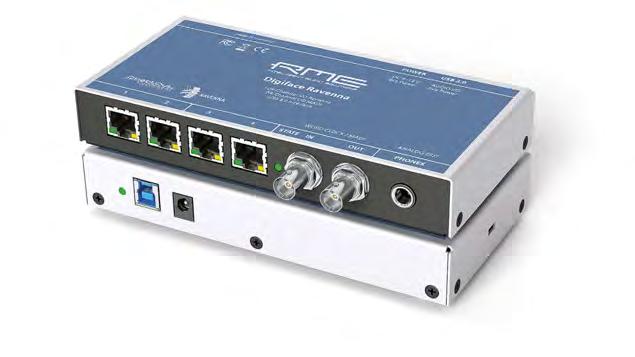
per ST 2022-7. In addition, the interface can be used as a mobile 64-channel Ravenna/ MADI converter without a USB connection to a computer. The coaxial MADI I/O connectors may also be configured to work as word clock sync I/O. Either an external power supply connector or USB bus power can be used for operation.
www.directout.eu www.rme-usa.com







DESIGNED TO keep pace with the changes broadcasters are experiencing in their production workflows, Calrec Audio has unveiled the Argo audio mixing system. Defined by the UK manufacturer as a new approach to audio mixing, Argo boasts a flexible control philosophy that breaks the traditional geographic tie lines between processing and control.
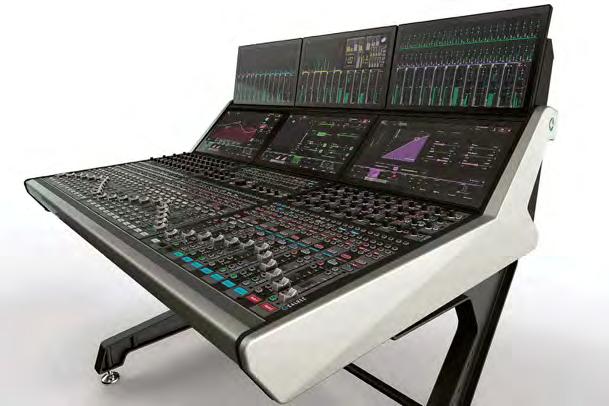
Integrating Calrec’s Assist UI at its core, Argo is fully modular with interchangeable hardware panels. Operations from a physical hardware panel or a remote GUI are indistinguishable as the familiar user interface is intuitive to use. With two mid-level rows of interchangeable panels on the larger Argo Q model and one mid-level row on the compact Argo S model, the modular panel system encourages an adaption to surface hardware by meeting unique requirements that can change the user interface.
Argo is built around an expanded version of Calrec’s ImPulse IP core. With ImPulse, the location of the control surface does not need to be tied to the processing core. It can power up to four independent mix environments, including headless mixers accessed on the public internet. Providing enough power to deal with the biggest immersive and NGA mixing demands, each mixer can access up to 2,496 processing channels on a single console.
The streamlined physical control surface uses optically bonded touchscreens for enhanced visual feedback and speed of access. The hardware panels build definable functions that can be applied as templates. Flexibility is enhanced with interchangeable panels that allow the desk to be split for sub mixing or mixing in other locations.
In terms of redundancy, all control elements can be duplicated so any panel can be used to access inputs and controls, while fader scrolling functionality adds more protection. Additionally, SMTPE’s hitless packet merging alongside a second layer of hardware redundancy guarantees broadcast uptime. www.calrec.com
WITH THE introduction of the networked WPN1 controller and version 1.2.4 of Sonicue sound system software, Dynacord aims to simplify audio system setup and control. Featuring a 45mm colour TFT display and a single-knob encoder, the WPN1 is a compact wall panel controller that allows personnel to adjust the volume, select the source and mute, in addition to other system functions. Shipping with interchangeable white and black front covers, the PoEpowered device is available for both EU and US standard wall-mount boxes. Networked and connected to Dynacord’s MXE5 matrix mix engine, a 24x24 performance audio matrix is created offering control, routing and mixing functionalities. Serving as a control server, the MXE5’s system logic enables the WPN1 to control one or multiple audio zones, as well as other peripherals such as lights, projectors or blinds. Unicode character support allows the systems designer to label controls on the display in local languages. Multi-PIN protection and screensaver options can be configured via the panel designer within the Sonicue sound system software.
In addition to supporting the WPN1 wall panel controller, the v1.2.4 Sonicue software update enhances the system logic of the MXE5 by adding an active HTTP Application Programming Interface (API) to actively control third-party devices. Furthermore, a scheduler function for recurring events turns the MXE5 from an audio processor into a
system control centre. Bypassing the need for an MXE5 control panel, support has been implemented to monitor and control the TGX and IPX amplifiers on PC and iOS devices or via a TPC-1 touch panel controller.
Parameters including level, mute, preset and recall, as well as status flags and VU metering, can now be used to create custom control panels.
www.dynacord.com
SOUND DEVICES has released the A20-RX, a two-channel, true diversity receiver with SpectraBand technology, for which the receiver and A20-Mini transmitter offer a tuning range of 470–1,525MHz. The A20-RX also features high-discrimination front-end filtering for better performance in noisy RF environments and Frequency AutoAssign for faster setup. The receiver is compatible with both the A20-Mini and A10-TX transmitters.

The A20-RX is the second product in Sound Devices’ inaugural wireless product line. The first product, the A20-Mini transmitter, is receiving a free firmware upgrade to enable SpectraBand when used with the A20-RX. The A20-RX is also compatible with all tuning
GATESAIR HAS extended the Flexiva low-power FM transmitter series with the Flexiva GX. Optimised for analogue FM, it aims to provide radio customers with the strongest power-to-size ratio for levels up to 10kW. Incorporating LDMOS technology within the 5U chassis, the Flexiva GX can deliver an overall efficiency rating up to 76%.
GatesAir continues to support HD Radio and DRM+ digital radio within its Flexiva FM transmitter range, but the Flexiva GX Series is built for applications requiring high-efficiency, solid-state technology. The
ranges of the full-size A10-TX and is SuperSlotcompatible with an SL-2 SuperSlot Wireless Module and 8-Series mixer-recorder. are its front-end filtering and Frequency AutoAssign.
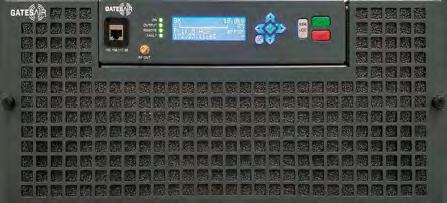
in wireless receivers, the A20-RX uses superior low-loss, brick-wall SAW filters to deliver clear audio in noisy RF environments. These built-in filters also provide immunity from nearby IFB or camera hop transmitters, without the need for external filters or extra cabling. The AutoAssign feature scans a user-designated tuning band and selects available frequencies for the A20-RX’s two channels. This feature is designed to make frequency selection and setting quick and easy.
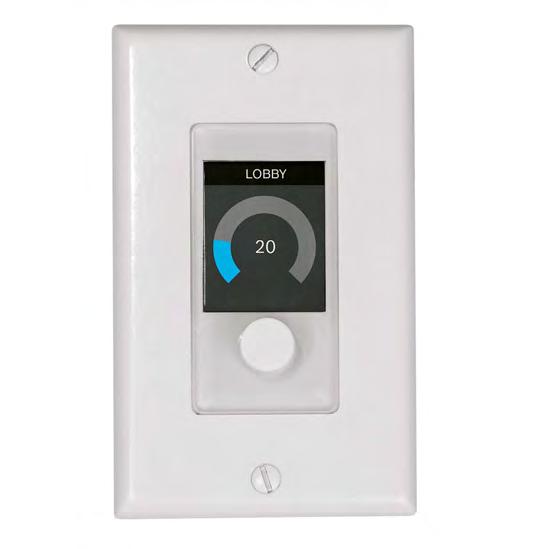
The release of the A20-RX coincides with supporting firmware for the A20-Mini, A10-TX, 8-Series, SD-Utility and A20-Remote.
advances in power density, efficiency and footprint within Flexiva GX’s design has been assisted by GatesAir’s thirdgeneration PowerSmart transmitter architecture.
Supporting N+1 configurations, Flexiva GX transmitters enable large network operators to build very flexible and consolidated transmission sites. The Flexiva GX series also carries traditional GatesAir solid-state design benefits forward, including modular, redundant transmitter designs with hot-swappable power supplies. The transmitters provide
functionality and GatesAir’s latest Intraplex IP Link 100e module.
www.gatesair.com
While tracking filters are common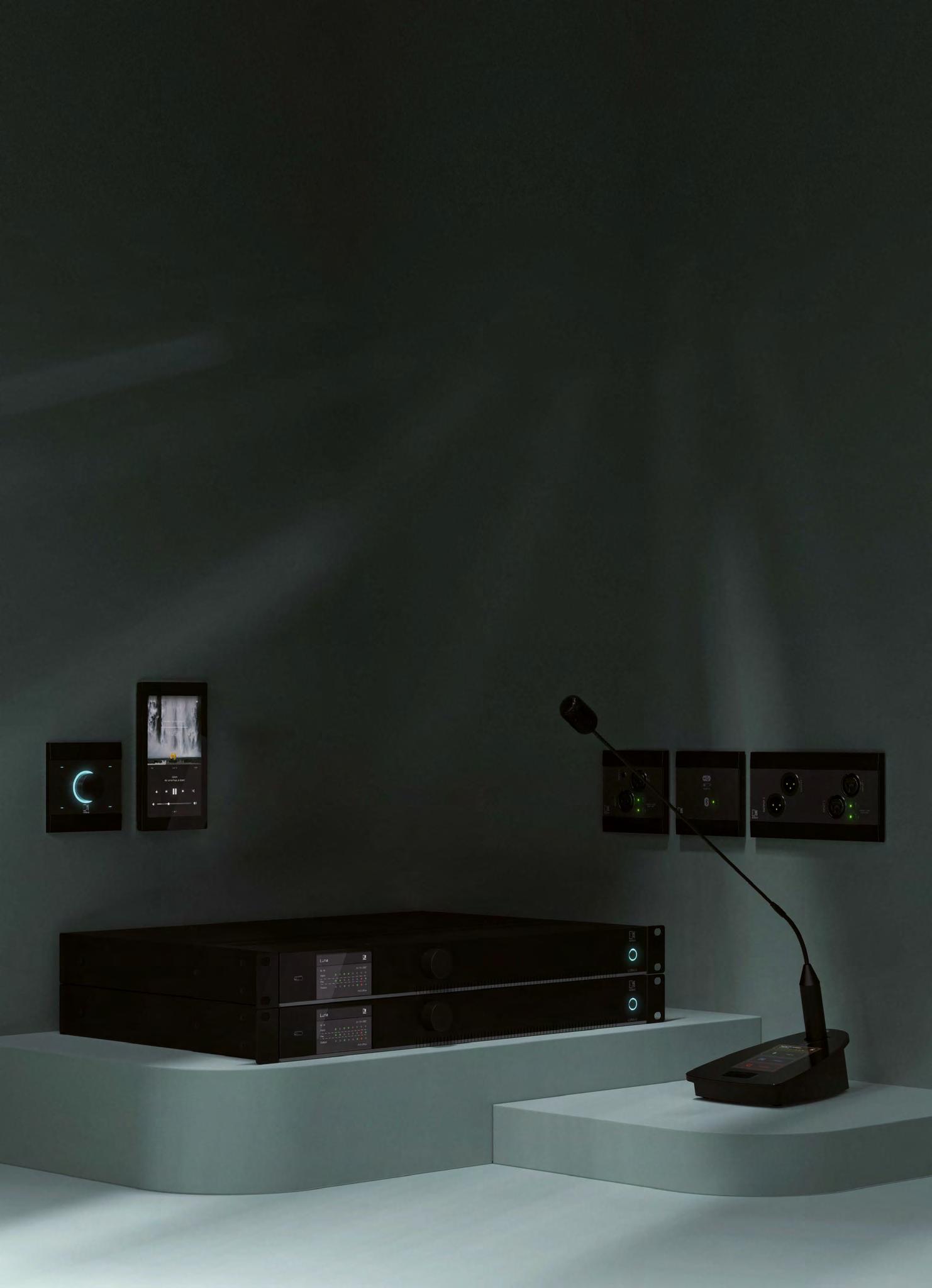


KV2 AUDIO has launched the 500 Series range of audio processors, a series of “ultra-high-quality” processors consisting of three models. The TCL is described as a unique analogue thermo audio compressor featuring a superior natural RMS detector and dynamic voice bass enhancement control. According to the manufacturer, its patented design offers an exceptionally musical and natural compression that is a component part of its real-time input, as opposed to a typical side-fed gain reduction circuit that attempts to either follow or anticipate compression demands. Its additional Bass balance control circuit allows the user to smooth out and minimise proximity effects from a changing microphone position.
The QD8 is a George Krampera-developed eight-band stereo equaliser specifically designed to highlight a desired EQ band without adversely affecting the overall sonic landscape. While not intended for tuning out room modes, the frequency bands and filter types have been chosen after extensive research, to perfectly align with the science of human hearing and our perception of achieving the ultimate spectral balance. In a live scenario, faced with a number of different sources, programme types or performance genres at a festival or concert, the equaliser is described as being very musical and intuitive, and provides a quick way to shape any mixed content to the sound users want to hear. In the studio, it can be used for either the simple enhancement of an instrument/vocal track or the final mastering polish.
Lastly, the MPA is a high-definition microphone and musical instrument preamplifier with Class-A circuitry and a high-quality transformer balanced output. A stepped input gain selector is provided for repeatability of settings. The preamplifier features adjustable high- and low-pass filters, with an adjustable limiter to control clip level and a transformer-isolated, high-impedance line input. It also has a further auxiliary transformer-balanced isolated output, meaning a number of these units can be used together to create a multichannel stage preamp for splitting FOH and monitoring outputs, or for broadcast and recording duties, delivering them all through line drivers.
virtualised processor presents a subset of scalable Q-SYS functionalities in a software-based format via a PC/server hypervisor. When paired with the Q-SYS Control feature licence, vCore can be enlisted to personal devices for enhanced system control, automation, UX capabilities, remote monitoring and helpdesk
KV2 has also announced an expansion to the SL Series with the addition of the SL6.10 subwoofer, a replacement for the SL2.15. Measuring 350mm deep and designed to integrate aesthetically with the manufacturer’s SL412, the SL6.10 is described as producing “powerful, accurate bass” from its slim cabinet design and is suitable for full-range music playback in fixed installations, nightclubs and multi-use venues.
Bass response is further enhanced by doubling, or even tripling the cabinets, particularly when the SL6.10 is used against or within a wall. It also combines acoustically with the ultra-low-frequency

an active five-way system if required. The six 10-inch front-loaded bass drivers, with a twoinch voice coil assembly and a ferrite magnetic
THE ACOUSTICDESIGN Series of loudspeakers has been extended with the development of two 6.5-inch two-way ceiling-mount models. The AD-C6T-HC has been designed to offer higher-power handling in challenging environments such as high ceilings or reverberant spaces, while the AD-C6T-HP offers higher SPL at standard ceiling heights such as high-energy restaurants or retail spaces. Distinguished by a slim, aesthetic design, both models provide consistent tonal

quality within the AcousticDesign portfolio. In addition to the blind mounting, SIs can adopt Q-SYS Intrinsic Correction when tuning with custom Q-SYS loudspeaker voicings via the Q-SYS platform As the first virtualised processor for Q-SYS, Q-SYS vCore and the accompanying Q-SYS Control vCore feature licence bring Q-SYS Control capabilities to computer devices. Designed for less complex systems that do not require dedicated Q-SYS functionality, the
Using the same standardsbased IT architecture as other Q-SYS processing, vCore also Q-SYS Designer Software to build, design and deploy systems, for easily porting Q-SYS control programming. IT staff can standardise system control with access to the Q-SYS Open toolkit of industry-standard protocols and open developer tools. Additionally, the Q-SYS vCore plus Q-SYS Control feature licence create a bridge for less complex rooms to enable cloud-based remote monitoring and management capabilities with Q-SYS Reflect Enterprise Manager
Suited for collaboration applications in addition to larger hospitality, entertainment or transportation venues, the Q-SYS Core 610 network processor combines the Q-SYS OS
represents considerable which required an amp channel to power two
with an enterprise-grade Dell server.
For those applications requiring greater processing capacity, the Q-SYS Core 610 Scaling licence scales key feature sets by 50%. Combining the Q-SYS OS with an enterprise-grade Dell commercial off-theshelf (COTS) server, the Core 610 provides a flexible and scalable audio, video and control solution in mid-tier applications requiring high-density channel counts. The fully networked solution promotes centralised processing for multiple zones while distributing network I/O closer to the endpoints to create a more streamlined system design.
The latest Q-SYS AV Bridging feature licence enables plug-and-play USB connectivity on the Q-SYS TSC Series Gen 3 touchscreen controllers. The licence expands the functionality of the TSC Series Gen 3 network touchscreens by offering a PC connection via USB directly to the touchscreen controller to integrate Q-SYS audio and camera feeds for BYOD/ BYOM conferencing connectivity. Saving time in configuration and installation costs, Q-SYS OS enables UC platform connectivity without the need for any additional hardware or specialty drivers.
TO SUPPORT a range of broadcast control applications and workflows, TSL’s standalone Universal Control Panels (UCPs) can be tailored to the user or the unique application. With several form factors available, from controlling a single device to more complex operations, each panel works independently with extended features to suit a range of applications.
As a compact control system, the panels can support standards such as SNMP in addition to having commands programmed directly into TCP/Serial message strings. Each button depicts status information or custom text and can trigger events ranging from a single device parameter or several commands, including dimming the lights, closing the blinds or turning on the projectors. UCPs can be used as part of a full control solution in conjunction with the TSL Control portfolio.
Reported to be adaptable, easy to set up and maintain, the control panels come in various shapes and sizes to suit any installation, from the compact TSL IP Control Buddy to the 30-key Shotbox. Each panel includes Ethernet, serial and GPIO connectivity, while configuration is performed via the dedicated web interface.
As the use of COTS equipment to route IP media continues to gain momentum as a standard in the broadcast market, TSL has also launched X-Connect. X-Connect is a cost-efficient IP routing software and hardware solution that combines a control layer, a user interface and a control processor to make IP routing more accessible. To showcase the technology, TSL has set up X-Connect with hardware devices from several leading industry manufacturers.
X-Connect marries the manufacturer’s virtual control processor, the GTP-V1, which creates a virtual router and enables it to be connected to a control layer such as TSL’s TallyMan. It can then be managed by the user through TSL Virtual Panels or a range of hardware control panels, for a simplified solution for IP media routing. From an operator and engineering point of view, X-Connect resembles the workflow of the more common baseband router, but instead uses IP technology. This provides a benefit to those that have not yet been fully trained using IP routing or are in the early stages of deploying a full IP workflow.
www.tslproducts.com
WHEATSTONE LAYERS introduces the entirely virtual broadcast operation, from multitouch “glass” consoles to backend mixing, audio processing and streaming into the transmitter or CDN provider. Running on enterprise IP servers and computers, Wheatstone Layers software suite aims to replace hardware, including standalone audio processors, mix engines and streaming appliances. One server can host multiple mix, FM processing with full MPX out to the transmitter or stream instances for several studios and locations connected by WheatNet-IP audio networking. Instances can be added as needed for backend mixing, FM processing and stream provisioning, processing and metadata management.
The complimentary Wheatstone Layers Glass software for the laptop, tablet or other glass surfaces includes full-function
radio and television virtual consoles with familiar buttons, knobs and multitouch navigation and menus. The user interfaces are also available for controlling, provisioning and setting audio processing and streaming parameters.

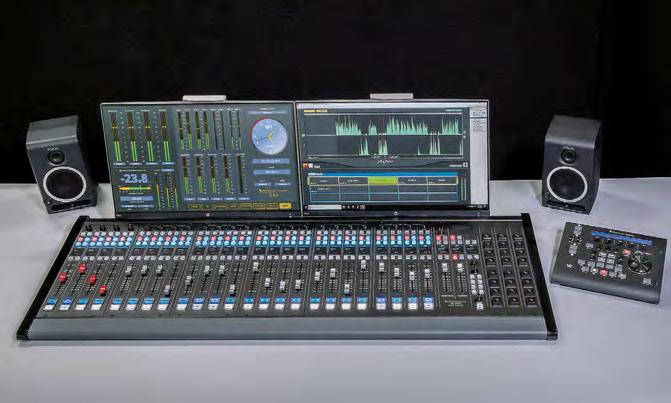

Operating on Hewlett Packard and Dell servers, the software combines the scalability of enterprise servers with the reliability of WheatNet-IP AoIP, mixing, processing and streaming software. Resources can be accessed from the laptop, tablet or other glass devices, as well as hardware controllers and interfaces wherever needed. Backup of the entire WheatNet-IP studios can be completed in a redundant server onsite, along with settings, crossovers and network configurations.
www.wheatstone.com
WISYCOM HAS announced that its Symphony Series wireless microphone system can now be monitored and controlled with the newly available Wisycom App for iOS and Android. Accompanying the release are firmware enhancements including the MCR54 four-channel and MCR54-Dual two-channel true-diversity portable receivers, and the MTP60 bodypack transmitter.
Similar in its conception to the Wisycom Manager PC software, the latest app provides monitoring, control and management of Wisycom devices through a Bluetooth 5 long-range connection. Device frequencies can be changed remotely, audio levels can be monitored and adjusted, and channel/group assignments can be selected. Advanced features include selection of the transmitter and receiver bandwidth and adjustment of the transmitter’s RF output power, in addition to toggling the recording status. In conjunction with the app, new device firmware is also now available for all Symphony Series products. In addition, Wisycom Manager PC software has also been updated and released to match the firmware enhancements.
With the advent of the BFL1 RF-over-fibre interface, Wisycom can better support RF coverage and distribution requirements
without concern for cable loss. Expanding on the Italian brand’s existing RF-over-fibre solutions, the BFL1 features selectable filters, expanded dynamic range and a longrange Bluetooth 5 programming link.
The compact, single-unit BFL1 is configured and controlled via the module’s OLED display with navigation buttons or the Wisycom App. Improving the signal quality and providing a low noise floor for wireless mic and IEM/IFB systems, the module incorporates a custom-designed laser that provides over 90dB of dynamic range.

Like the Wisycom BFA, the BFL1 interface comes with 16 filter banks that can protect against unwanted signals and maximise performance of the connected wireless systems. Optimisation of the BFL1 while adhering to the local RF regulations for productions is promoted with the inclusion of a 40MHz tuneable filter.
The BFL1 can be configured to work with other BFL1 interfaces for point-to-point and point-to-multi-point applications, in addition to the Wisycom MFL RF-over-fibre system. Replacing a requirement for coaxial
cables and allowing the distant placement of antennas, the BFL1 will interface with Wisycom’s MRK980 dual receiver, the MRK16 receiver and the MTK952 wireless IEM/IFB systems.
In brief, the MTP61 is the latest addition to the manufacturer’s Symphony product line, operating across the widest tuning range (470–1,260MHz) currently available. The Wisycom App controlling the device
through the module’s high-contrast
display with front-panel navigation buttons for access to menus and shortcuts.
DEVELOPED TO save time on manual processes including media distribution or spatial calibration, the disguise r22 software release adds features that enhance content resolution, production setups and media file management. Intelligent Media Distribution synchronises and distributes those media files within the video layers that are needed across each disguise server. Single Large Canvas (SLC) combines multiple video fragments into a single view output when used alongside multiple projectors. The result is a single canvas that can be used for everything from live event projections to immersive installations, without limitations to the overall resolution of the video. In addition, spatial calibration can be completed in less than half the time of previous releases, helping users save hours setting up their extended reality stages.
With the acquisition of Polygon Labs, disguise has launched its first integrated hardware and software solution for cloud-native broadcast graphics production. Comprising the Porta 2.0 cloud app and px hardware, broadcasters can create, control and collaborate on real-time graphics directly from a web browser. Porta 2.0 and px will automatically match studio lighting conditions to graphics, manage tracking and control LEDs all in one place. With Porta 2.0 and px’s template features, templates can be built of Unreal Engine graphics, including text, images, 3D objects and trigger commands without blueprints or coding. Creative and operational teams can collaborate on virtual sets and 3D graphics production remotely with a web-based interface accessible on a phone, tablet, laptop or desktop.
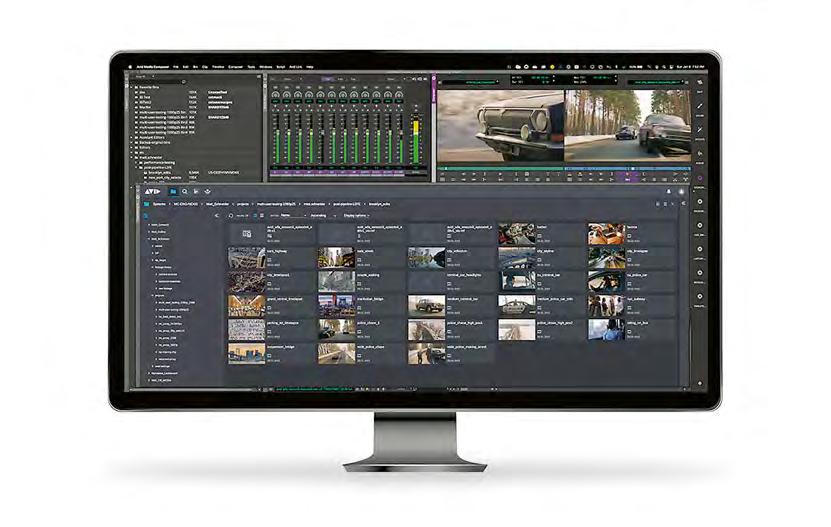
www.disguise.one
ANALOG WAY has announced software release 3.5 for its Picturall media servers.
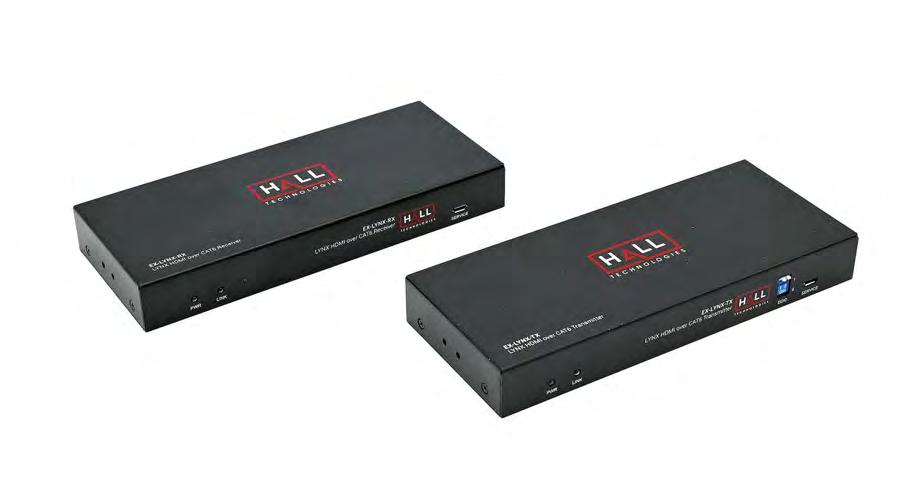
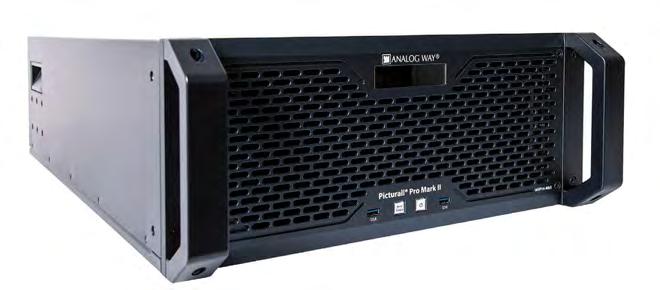
The update integrates Softpix’s SPX realtime graphics solution and supports VIOSO camera-based projector calibration to enable new applications, including panoramic cylinder projections or projection domes.
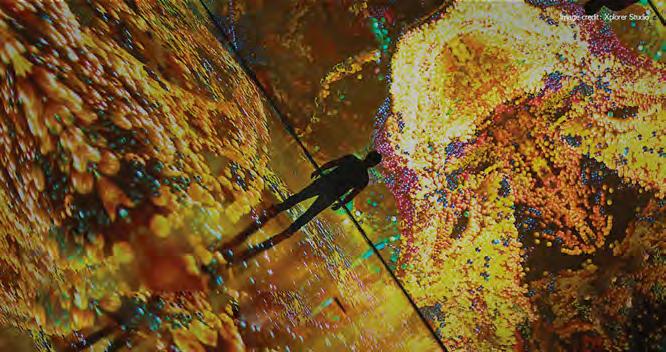
The release follows the partnership agreements recently signed with Softpix, provider of graphics software and creative services, as well as with VIOSO. The integration of Softpix’s SPX real-time graphics solution into Analog Way’s Picturall series allows customers to show and edit graphics and text on both live shows and fixed installations.
SPX integration comes with a special template pack consisting of 10 templates, including name straps, news tickers, countdown clocks, sponsor carousels and other essential graphics. The templates’
THE NEXIS | EDGE solution for postproduction teams permits collaboration from any location with secure, remote access to media and metadata and therefore provides editors with the same media access, workflow and user experience they have come to depend on from in-facility environments. With its proxy workflow, users can select between high-res or proxy media right in the Media Composer | Enterprise timeline, making it easy to go from working at the facility to working remotely, without
Also making their debut are the NEXIS VFS and NEXIS F-series shared media storage solutions. NEXIS VFS allows customers to deploy NEXIS workflows on premises or in the cloud so that they can evolve their operations over time with a flexible, subscription model. Integrated with NEXIS F-series storage engines, or as a cloud or hybrid deployment, Avid NEXIS enables teams of all sizes to work from anywhere, delivering secure access to media and metadata across all tiers of storage. NEXIS | VFS intelligent
optimising bandwidth to delivering protection with automatic drive rebuild, it is said to provide the agile environment and reliability required for 24x7 operation.
Avid has unveiled Pro Tools | Carbon Pre, a multi-mic pre interface delivering 32-bit AD/DA conversion to maximise dynamic range. ing the audio performance of Avid’s Pro Tools | Carbon interface, the new pre enables users to expand their system with 24 channels of mic/line preamps and line outputs, allowing for the capture of large tracking sessions and multi-mic live recordings. Existing Pro Tools | HD systems needing more mic preamps can leverage Pro Tools | Carbon Pre as an eightchannel ADAT preamp expansion unit to scale up I/O. Users can control up to nine Pro Tools | Carbon Pre units in a Pro Tools | HD system,
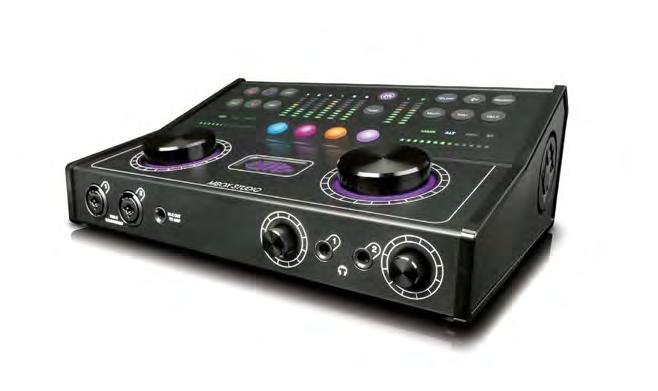
colours and fonts can be themed with CSS style sheets, so they can act as a resource for any production.
Customisation is possible for specific projects and complex interactions with thirdparty systems ranging from a customer’s intranet and dynamic statistical graphs, all the way to traffic control systems. The integration of VIOSO calibration tools allows for support of complex multi-projector installations and automatic recalibration of projector alignment using one or more remotely controlled cameras.
Combined with the power of the Picturall media servers and their ability to reliably play back video content, it will be possible to drive 360° projection domes or complex panoramic cylinder projections from a single media server.
www.analogway.com
while also tapping into the Pro Tools Hybrid Engine for low-latency input processing. To help capture sound quality across the entire system, Pro Tools | Carbon Pre also uses stacked AD converters on each input, while providing double-precision clocking.
In addition to the Pro Tools | Carbon Pre, Avid has unveiled the MBOX Studio desktop interface, a fully featured USB interface that operates on both Mac and Windows operating systems running not only the bundled Pro Tools Studio subscription, but also any third-party digital audio workstations. Users can connect mics, instruments, studio monitors, Bluetooth devices and other analogue, digital and MIDI gear with 21 inputs and 22 outputs. For optimal sound quality, MBOX Studio relies on the same mic preamps found in Avid’s S6L and Pro Tools Carbon system. The interface excels when used for podcasting, livestreaming, social video and sound design for picture, as users can assign buttons to their favourite functions to inject sound effects and bring in other sources and content such as intro music and voice overs.
In brief, Avid’s Pro Tools Flex subscription offering for audio post and music facilities has been renamed as Pro Tools Ultimate.
WITH THE release of the LYNX 4K Extender Set, Hall Technologies has enhanced the feature set with Ultra HD resolution and 4K 60Hz video signal with audio for control up to 60m over a single Cat6 cable. Designed for the educational sector, meeting spaces and hospitality venues with US and EU wall plates, up to eight digital signage display receivers can be cascaded to distances exceeding 400m. Featuring 4K graphics, smooth video playback and audio de-embedding, both

a local loop output for monitoring and playback status of the local source.
Designed to stimulate meeting collaborations, Hall Technologies has also developed the Atlas all-in-one conferencing solution. The conference speakerphone includes an in-built microphone, speaker and a presentation switch that provides an enhanced audio and video experience.
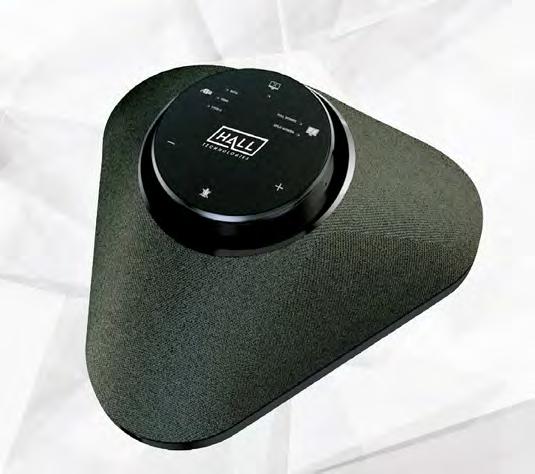
Atlas operates with all soft-codec conferencing solutions and is compatible for Windows, macOS, Android as well as
array with echo cancellation and noise reduction together with an advanced 10W conference speaker. Presentation options include a USB-hub offering resolution up to 1080p@60Hz, an HDMI output up to 4K@30Hz,
USB workflow solutions. Ranger is a 4K multiview presentation switcher
collaboration for the corporate and education sectors by enabling meeting attendees to share videos, or music from their own devices. Compatible with both Apple and Android devices for wireless content casting, Ranger also pairs

screen sources to Hall Technologies’ AV equipment.
Promoting plug-andplay deployment, it transmits up to 1080p video signal with audio and supports a back-post feature when the synch display is a

Hall Technologies is aiming to make meetings more interactive with the addition of Ranger to its portfolio of
Voyager, to allow communications from a laptop. Ranger has three video inputs with HDMI and USB-C both having a maximum input timing of 4K@30Hz 4:4:4. The third input handles Wi-Fi casting for Airplay Mirroring and Miracast, so that it can work as a BYOD receiver. The device offers two simultaneous video processing channels and outputs can be combined into one video signal for sharing a multiview layout on the display.
www.halltechav.com

DESIGNED FOR a wide range of contribution or point-to-point streaming applications over IP within production studios, broadcast facilities or corporate server rooms, VITEC has unveiled the MGW Diamond+ OG encoder. The 4K/multichannel HEVC, H.264 and MPEG-2 encoder comes in an openGear (OG) card format. Promoting easy integration and robust streaming, typical applications for the MGW Diamond+ OG include site-to-site primary distribution, remote production over unconstrained networks and remote/ at-home production over the internet/REMI in addition to standard IPTV distribution. Featuring Ultra High Definition and High Dynamic Range (HDR) support, Diamond+ OG can capture and stream 4K60p from either of its four 3G-SDI or 12G-SDI inputs or a soon-tobe-released SMPTE 2110 input (over 25Gbit SFP interface). The card supports 4:2:2 10-bit encoding, multichannel audio encoding as well as Zixi, SRT, RIST and Pro-MPEG transport protection technology for reliable video and audio transmission. With an increasing number of video feeds being streamed live over various
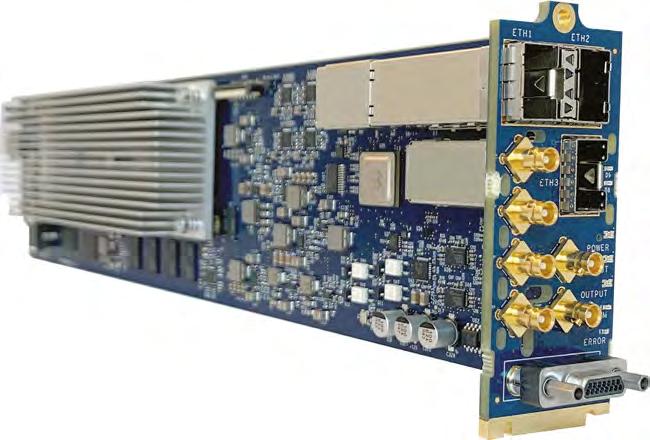
IP transmission links, ChannelLink enables delivery of IP content anywhere, at any time, using legacy baseband video matrices. ChannelLink acts as a central hub where IP channels from the field can be reliably received and retransmitted live, acting as an efficient gateway across any IP network. Suited towards stream management, routing,
and better resolution with the V-Series Iris’s lower latency and increased port capacity, the V-Series IrisX IP panel expands the capabilities of the original V-Series Iris Panel. The IrisX fits into IP-based productions with AES67 connectivity and dual NIC connections. Eclipse HX software features include rolebased workflows and several redundancy measures including N+1 card and network redundancy. Additional benefits of the IrisX include capacity for three concurrent full-duplex uncompressed audio streams and backwards compatibility with MVX-A16 and IVC-32 cards.
Whether the application is in a dark theatre or in direct sunlight at an outdoor event, the upgraded TFT displays in
clearer label information and data display. In addition, the displays are more resistant to burn-in or fading, ensuring a significantly longer overall lifespan.
The IrisX is available in 12, 24 or 32 keys in Rotary, Lever and Pushbutton varieties, as well as expansion panels, and can provide up to 64 ports when combined with just a single E-IPA card, and less than 10ms audio latency from the IrisX panel to frame via an AES67 connection. Ideal for public internet applications, three different connection options are supported with a direct fourwire, AES67 or the Clear-Com’s IV-Core protocol.
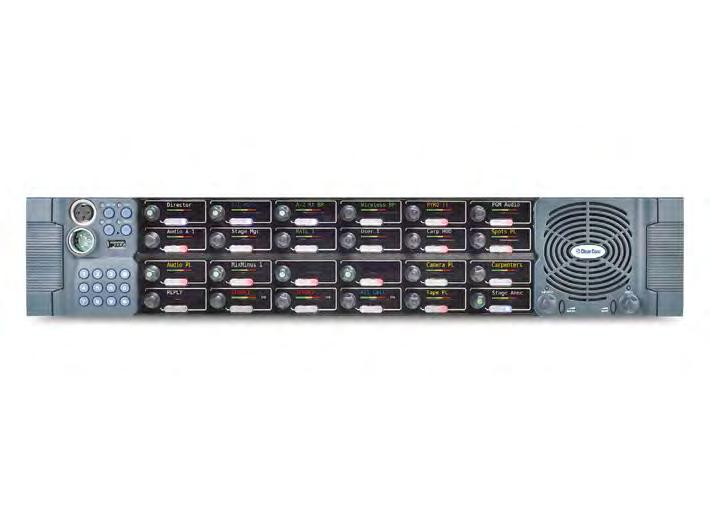
www.clearcom.com
rebroadcasting or IPTV stream reflection over WAN/internet, ChannelLink also simplifies content delivery of live channels from news agencies as well as sports or entertainment venues.
www.vitec.com
DESIGNED PRIMARILY broadcast and pro AV applications including sporting events, reality television, broadcast trucks and a range of AV installations requiring a high-quality networkable video source, Marshall has developed the CV420e ePTZ camera. Having removed the robotic movement of a traditional PTZ, the CV420e boasts ePTZ functionality that simulates digital pan, tilt and zoom operations within a larger 4K resolution pixel space. Operators can maintain access to wide angles in addition to useable digital zoom and lateral manoeuvres within the sensor.

Featuring a high performance 9.5 Megapixel 4K sensor capable of 4K (UHD) resolution up to 60fps with ultra-clean HD resolutions, the camera’s 4.5mm lens features a wide angle, over a 100° field of view. The CV420e includes
compatible soft codecs and devices. Measuring 114mm in length, the ePTZ model includes rear protection wings to avoid cable disconnect drops. The panel includes a 3.5mm audio input for embedding on all available outputs and can be controlled remotely via Ethernet (IP) and USB. The CV420e is also equipped with a front-facing Tally Light for LIVE.
www.marshall-usa.com
transforms and LUT processing capabilities for delivering accurate colour space conversions for live broadcast, live events, on-set production and postproduction. ColorBox enables a range of HDR and SDR conversions and allows DITs to load, modify and save looks, in addition to creating reference images for dailies to ensure colour accuracy across all production and creative personnel.
Designed to support a wide range of tasks on-set and in live production environments, ColorBox incorporates high-density 4K/ UltraHD processing together with 12G-SDI and HDMI 2.0 outputs for local monitoring up to 4K/UHD video and 30p 12-bit RGB 4:4:4 signal support. ColorBox includes AJA Color Pipeline (ACP) Mode with a 33-point 3D LUT processor with tetrahedral LUT interpolation, four built-in user-configurable 1D LUTs and two 3x3 user-configurable matrices.

A USB OTG port and third-party Wi-Fi adapter provides wireless access to the
include a built-in RGB colour corrector and ProcAmp, LUT, matrices and image libraries, capture and recall capabilities together with ancillary (ANC) metadata management. In addition to ACP, ColorBox offers Colorfront, BBC HLG LUT, NBCU LUT and Orion-Convert Modes, and any one can be active at any given time. Ultra-low latency ensures sources remain within the timing window of the downstream switcher in live production workflows. Frame capturing features include pre-processed image capture or post-processed output capture for reference stills with overlaid metadata, such as video payload IDs, pipeline configuration and customisable user text. The frame captures can be saved locally and exported to the configuration PC running the web browser-based ColorBox user interface. A built-in test pattern generator promotes ease of setup and signal path validation. www.aja.com
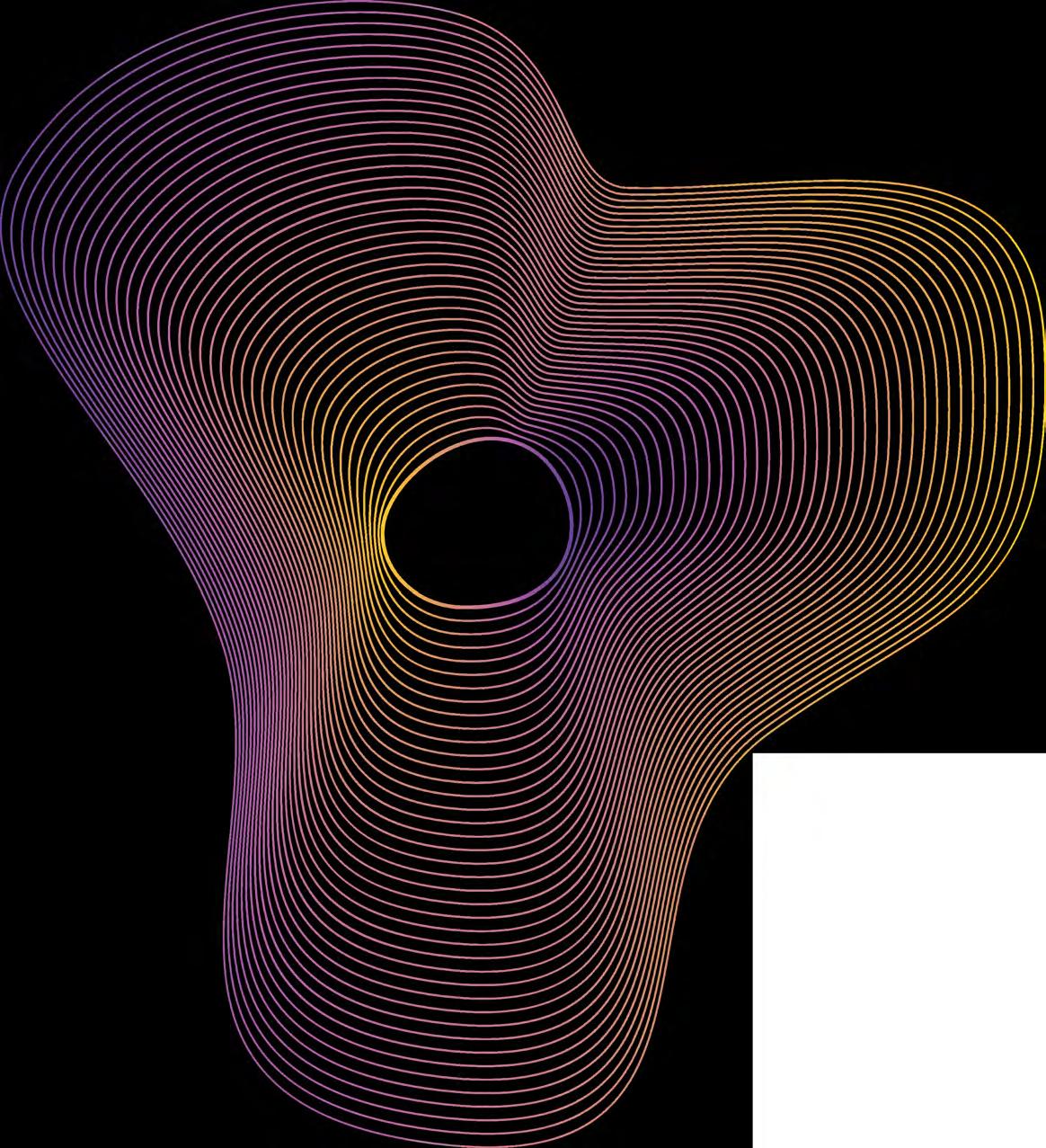
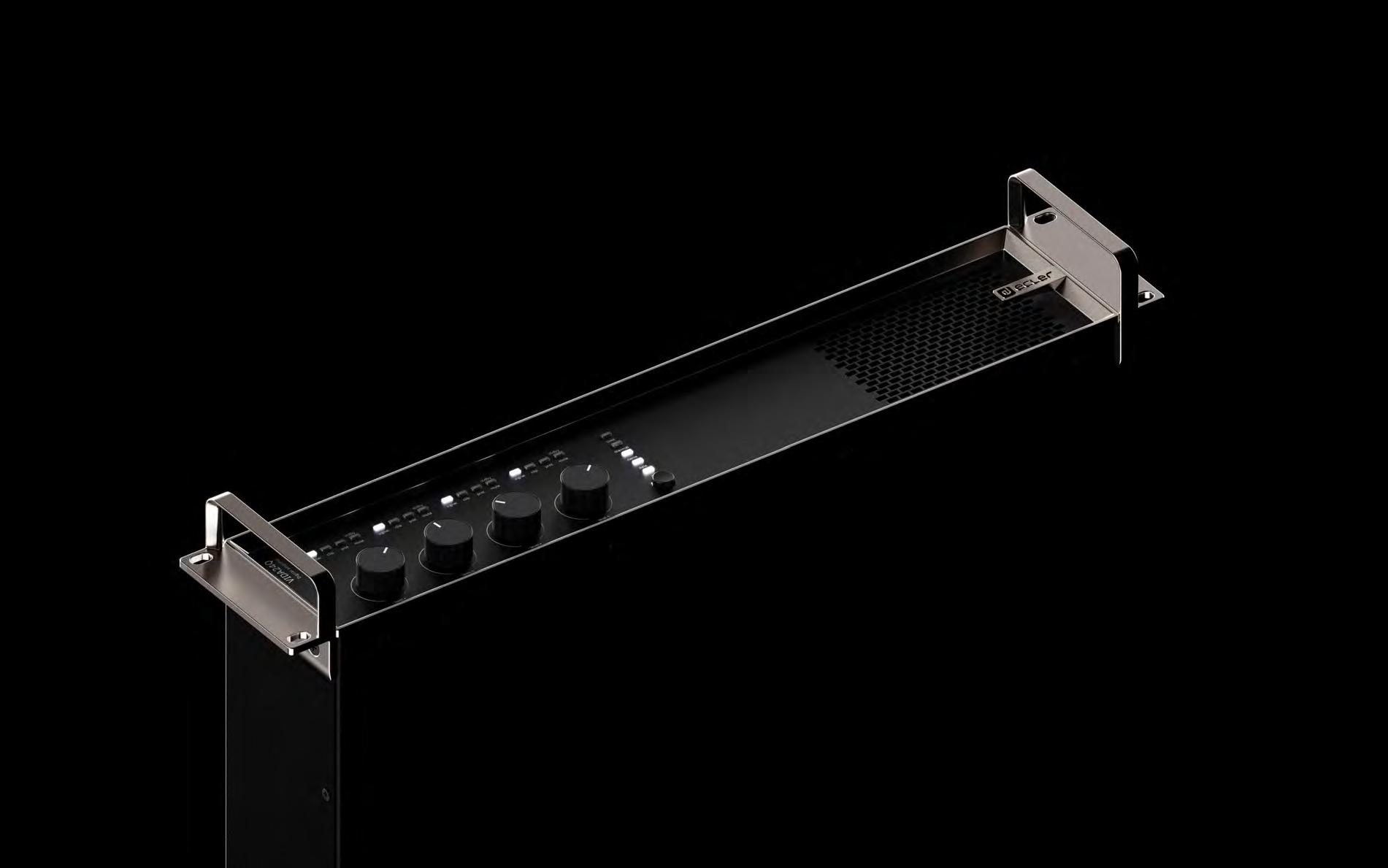





WITH THE addition of four Ultimatte 12 real-time compositing processors, Blackmagic Design claims to have created the next generation of broadcast graphics. The lower-cost Ultimatte 12 HD, Ultimatte 12 4K and Ultimatte 12
all four models produce identical quality compositions. Sub pixel processing automatically generates internal mattes, ensuring different parts of the image are processed separately based on the colours in each area. Particularly
television standard they are using. The Ultimatte 12 HD Mini model with HDMI
connections allows ATEM Mini users to benefit from broadcast-quality keying when building innovative fixed-camera virtual sets. Eliminating the cost of external equipment, all Ultimatte 12 models incorporate built-in frame stores for keying using stills for backgrounds. Retaining the same image processing algorithms and internal colour space,
parameters. The improved flare algorithms remove green tinting and spill to reportedly create true, realistic-looking virtual environments. With the elimination of shadows or transparent objects with reflections, the Ultimatte 12 units automatically sample the colours and create seamless mattes for walls, floors and other parts of the image, before applying the necessary corrections.
The Ultimatte 12 4K and Ultimatte 12 8K models feature advanced 12G-SDI connections for operation with current HD video formats, in addition to future Ultra HD and 8K video formats. The Ultimatte 12 HD Mini model allows conversion of SDI camera control to HDMI, ensuring an ATEM SDI switcher can control an HDMI-connected Blackmagic Pocket Cinema Camera. The Ultimatte 12 HD can translate SDI to HDMI for the cameras as all ATEM switchers transmit camera control over SDI. All Ultimatte 12 units include free Ultimatte Software Control for Mac and Windows.

An update to Blackmagic Design’s DaVinci Resolve software has been announced, featuring support for editing in vertical
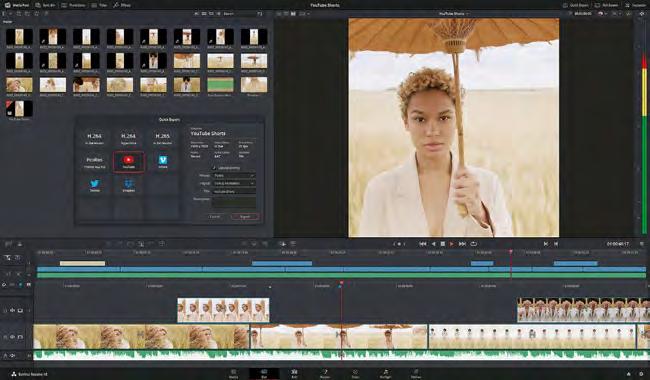
resolutions such as TikTok, Snapchat and Instagram TV, as well as automatic locking of individual timelines within bins for multi-user collaboration. DaVinci Resolve 18.1 also makes projects imported from ATEM Mini ISO projects easier to edit for customers, with audio now attaching to the video clips. DaVinci Resolve for iPad has also been unveiled, designed for creators “to extend video workflows in new ways and new places”. Optimised for MultiTouch technology and Apple Pencil, DaVinci Resolve for iPad features support for cut and colour pages, providing access to DaVinci’s image technology, colourfinishing tools and latest HDR workflows.
www.blackmagicdesign.com
ENGINEERED TO deliver bright, true-tolife images ranging from 6,000–10,000 lumens within corporate, education and digital signage applications, Epson has launched a new suite of high brightness laser projectors.
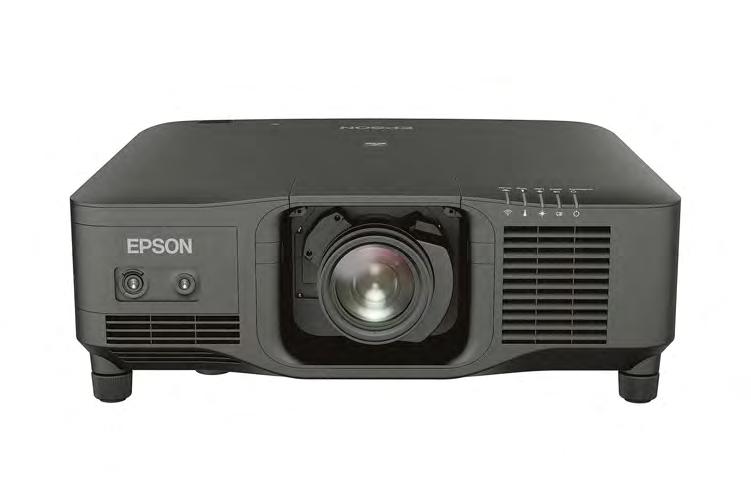

Equipped with 3LCD technology, the EB-PU1006W, EB-PU1007W, EB-PU1008B and EB - PU2010B models faithfully reproduce colour without a rainbow effect. Integrating a high contrast ratio and a 4K enhancement feature, the projectors support HDR10 and Hybrid Log-Gamma for precise detailing for light and dark graduation contents. Outputting in 1920x1200 resolution, the lightweight
Working with the Epson Projector Config Tool, the Near Field Communication (NFC) function provides a check on projector information, completes a diagnosis, configures the network and changes projection settings. Designed to enhance the process efficiencies of up to 100 projectors, the management function can operate when the projector is switched off by placing an NFC-compatible smartphone over the NFC mark. Easier integration with existing systems is promoted with the Open Web API that implements commands that control the projectors.
The Epson PU-series units accept a wide range of interchangeable lenses, including
to position, brightness and colour can be applied with the motorised lens shift and wider lens shift range. The wider lens shift range together with a stepping motor ensure precise adjustments when employing projection techniques, such as edge blending and stacking. Ceilingmounted projectors can be adjusted via remote control or over a network – the optional ELPFP15 suspension adapter can be attached to the ELPMB67 mount. Developed for the educational, corporate, museum and visitor attraction sectors, Epson has unveiled the PU2200 Series of projectors. Ranging between 13,000 to 20,000 lumens of equal colour and white brightness, all three models are designed to deliver image quality at
4K enhancement support. The Japanese brand claims that the PU-2220B laser model is the world’s smallest and lightest 20,000-lumen model available on the market.
The PU2200 projectors incorporate advanced features including scene adaptive gamma correction, 4K enhancement technology and improved optical parts.
In addition, the optimised compensation plate allows for enhanced native contrasts including truer-to-life dark colours and brighter scenes that can be calibrated to be more balanced in the display. The latest model also covers over 92% of RGB, so that images are represented more accurately.

Encourage your customers and guests to linger for longer with great sound. Thanks to their wide coverage angle and balanced sound, DQOR speakers provide an inviting ambience whether indoors or outdoors. These modern and dynamic looking installation speakers are available as 3”, 5” and 8” versions in black or white and respectively with two connection variants: low impedance (8 Ohm), or high impedance (70V/100V/16 Ohm) with multiple power taps.
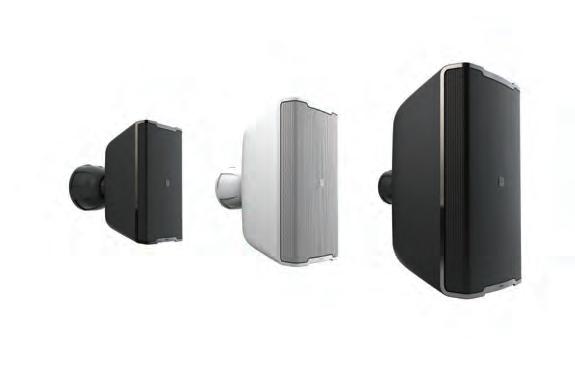
THE LUMINATE Ultra Series LED videowall display has been added to Leyard’s portfolio of outdoor display solutions. Designed for transportation, signage, retail exteriors, poolside cinema, entertainment, hospitality and other large venue facilities, the fine pitch outdoor LED display is designed for up-close viewing in high-ambient light environments.
Rating to withstand weather conditions, dust and water. The displays also include a protective coating that fills the gaps between LEDs which strengthens weather protection and increases visual contrast for deeper black levels.
The second-generation of Leyard’s Black Diamond series has also been launched, introducing new Micro LED display technology for pixel pitches

for the first time. The company’s Nin1 Micro LED
continues to serve products with pixel
THE CANADIAN manufacturer has launched what it describes as the ultimate routing, multiviewer and signal processing platform.
Natively supporting 12G throughout the entire chassis, Ross Video has evolved the Ultrix series with the release of the FR12 Router. Currently the only router with an integrated production switcher, deployment of the UHD production-ready router ensures that hardware does not need to be replaced and capacity is not lost.
The software platform enhances power efficiencies together with significant savings in cost and space. No additional hardware is required as the software is defined as Pay as You Go and adds new features through additional software licences.
audio processing, frame synchronisers, quiet switching, UHD gear-boxing, production switchers and audio mixing.
With coated LEDs for ruggedness and image detail, the Luminate Ultra Series provides nearly 140° visibility and is designed to enhance viewing angles with limited interference, even in direct sunlight. With models in 1.5mm and 1.9mm pixel pitches and up to 3,500 nits of brightness, it supports viewing from as close as 1.8m.
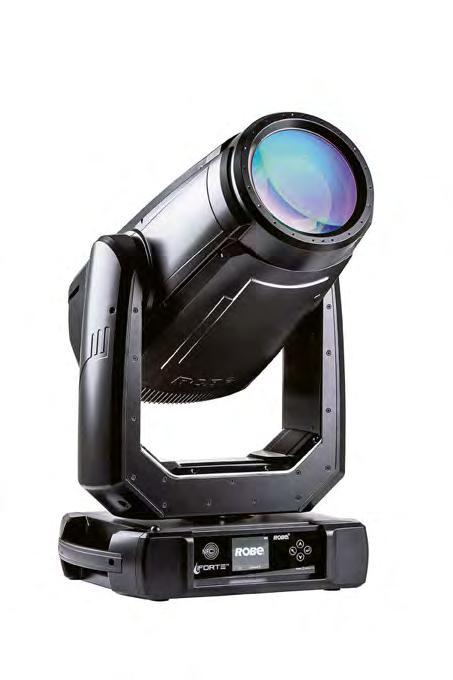
Supporting wall-mounted, corner, convex and concave installations, and with full front and rear installation and service, the display is said to be flexible enough to create a videowall of nearly any size. It features an IP65 Ingress Protection
1mm. The new Black Diamond series uses flip-chip technology that reportedly results in higher stability and reliability than previous SMD LEDs, together with three times the contrast ratio and twice the brightness. The result is uniform light distribution with lower power consumption.
The Black Diamond series makes use of a common cathode driver IC and ASIC display control chip with independent intellectual property rights which results in a 27% power consumption reduction compared to a common anode driver design when running at 600–800-nit brightness. It’s also capable of 2,000-nit peak brightness at peak power consumption. Advanced image processing technology is also reportedly capable of achieving 100% of the DCI-P3 colour gamut with twice the colour purity. sz.leyard.com
The modular input and output matrix of Ultrix allows unique I/O cards to be inserted. Customisation of the Ultrix Connectivity
The smart door also serves as an LCD display that monitors the system and serves as an interface for configuring via a highresolution, full-size touchscreen panel. The FR12 includes up to 288x288 SDI ports with a 6144x6144 TDM audio fabric, up to 288 frame syncs and 288 switches. Independent and individual control is enhanced with up to 48 independent multiviewer heads in the 12U chassis, with each head supporting up to 100 pips. Routing, processing and configuration down to a mono channel can be performed regardless of I/O. With an optional UltriMixMXR licence added to the fabric, a virtual, fully routable audio mixer is enabled, promoting audio flexibility and capability to the Ultrix chassis.
AN IP65 variant of the Robe Forte moving light has been unveiled by the Czech manufacturer. The iForte combines the same high output as the original model, as it uses the same Transferable Engine LED, and combines its outdoor protection in a package that’s just 1.5kg heavier. The ingress protection system integrated into the fixture reportedly allows standard maintenance and preparation procedures –such a s
Transferable Engine exchange or gobo replacement – to be ducted onsite and without any additional tools.
The onboard RAINS (Robe Automatic Ingress Neutralisation System) manages humidity, temperature and pressure control, using active monitoring to automatically remove any moisture detected within the fixture. Ongoing monitoring also ensures peak performance of the
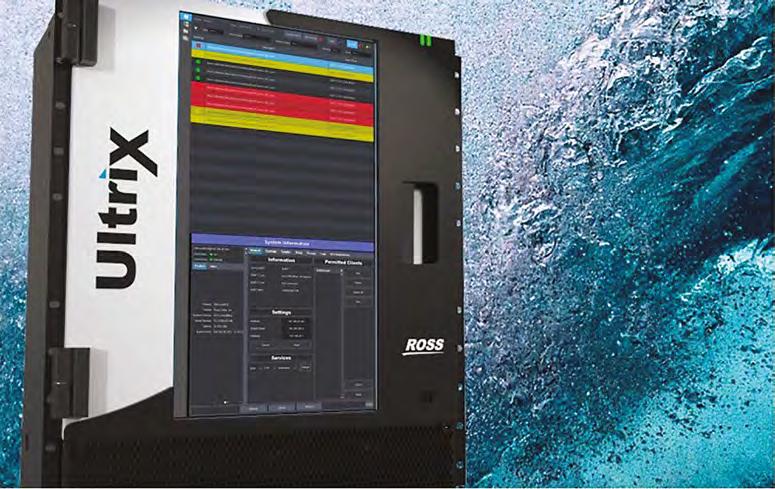
Platform as a 12G-capable router, multiviewer and signal processing platform, a hybrid-IP switcher or a signal-processing hub is promoted as the cards are compatible with each other on a single chassis.
Supporting a mix of SDI, fibre and IP signal I/O, the engineering design focuses on the workflow so that Ultrix can be configured as a single frame solution or as part of a multi-frame distributed architecture. Termed as “production in a box”, the hyperconverged design incorporates video/audio routing, multiviewers,
Up to eight SDPE blades can be configured as a single 8ME Ross Acuity switcher, eight independent Ross Carbonites or a combination of a 4ME Acuity and four independent Carbonites. Designed to perform in harsh environments, the hardware integrates thermal management, locking card guides and edge connections, together with an advanced internal smart fabric.
www.rossvideo.com
DESCRIBED AS a powerful 70,000-lumen LED wash fixture, the Proteus Brutus is an IP65-rated moving head capable of producing piercing beams and high-intensity washes and forms the latest addition to the Proteus lineup along with the Proteus Rayzor 1960 wash effects fixture.
Suitable for any outdoor application requiring superior output, bright and powerful wash,
and quiet operation, the Proteus Brutus houses a 1,200W 6,500K white LED engine offering CMY colour mixing, variable CTO and a six-position colour wheel, with an effects system that features rotating gobos, animation, iris and frost. An optional indexable framing module is also available. With a zoom range from 4–45° and a 220mm front lens, the Proteus Brutus has
DESIGNED FOR outdoor use in events and livestreams, Cameo has expanded its product portfolio of IP65-certified LED soft panels with the S Series. Creating a limelight with a natural, diffuse light, the S4 IP model features colour rendering. Drawing upon a wide range of accessories, the compact S4 IP is based on 544 single SMD LEDs per colour (RGBWW) arranged in a cluster of four. In combination with the integrated calibration chip, the S4 IP exudes natural colour rendering (CRI 95, TLCI 91) in addition to an extended Rec. 2020 colour space of 85%. With its wide range of 1,800–10,000K, the adjustable colour temperature promotes its use in all environments. Fixed handles on the sides
allow the panels to be quickly aligned with objects on set. In accordance with the IP65 certification, the soft panel is equipped with waterproof and lockable powerCON TRUE1 device connectors. The fixture can be controlled via DMX, W-DMX, ArtNet, sACN or RDM on the unit itself, or via EZRemote using the optional UNICON DMX/RDM controller.
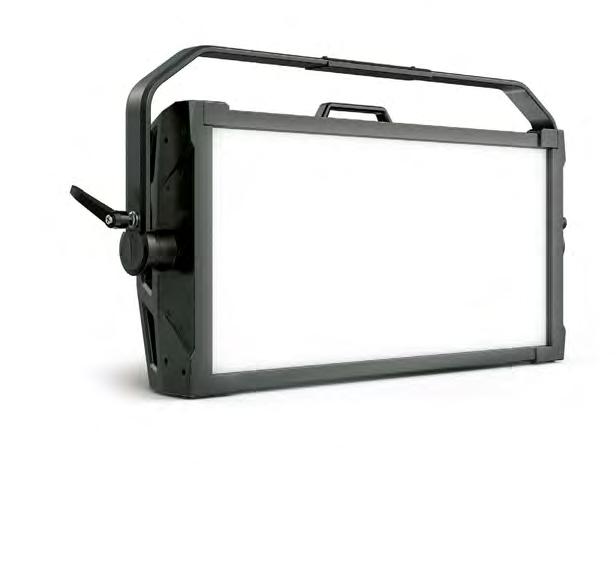
In addition to the supplied Omega bracket and the standard diffuser, the spectrum ranges from Honey Combs, with 30° and 60° beam angles, to Intensifiers and Heavy Diffusers, to Barndoors, a Centre Mount Yoke or a V-Mount adapter for battery operation.
www.cameolight.com
CHRISTIE HAS added the CounterAct UR10 to its line of commercial UVC disinfection light fixtures for occupied indoor spaces. The CounterAct UR10 with UVC-LED is recommended for commercial offices, government facilities, schools, transit hubs, retail shops and medical centres and builds on the release of the CA20, Christie’s first far-UVC disinfection fixture. Combining filtered Care222 farUVC light with upper room high-power mercury-free UVC-LED, the CounterAct UR10 is described by the manufacturer as an evolution in technology for treating both surfaces and air in occupied indoor spaces.
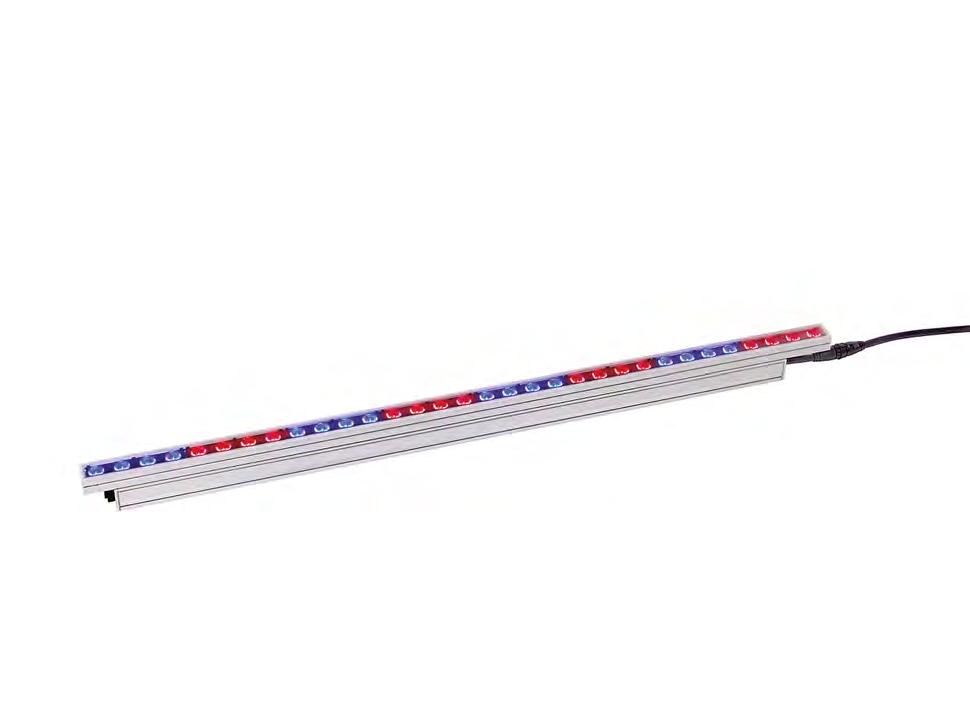

HARMAN PROFESSIONAL has introduced the Martin MAC Aura XIP, a premium moving head wash light that it states “raises the bar for optical quality” while featuring an even wash field with a soft edge, minimal stray light and highintensity mid-air beams. The fixture houses an aura filament effect, with improved light engine control and an outdoor rating with reportedly close to zero compromises in weight, size and aesthetics.
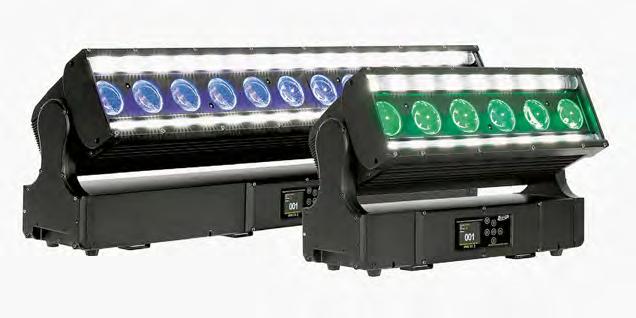
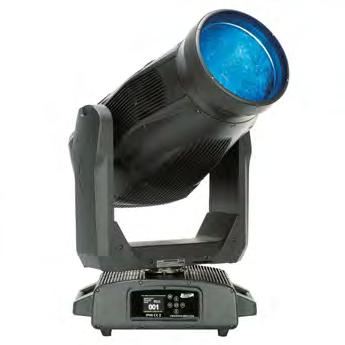
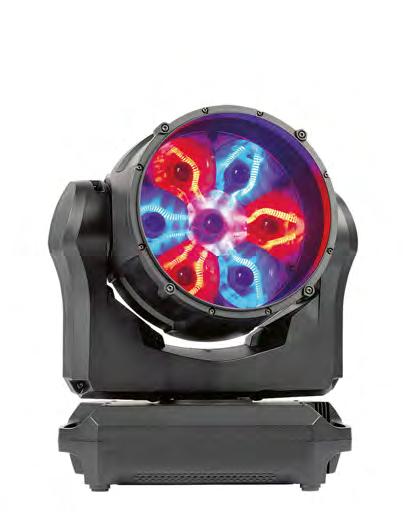
The MAC Aura XIP’s 12 Radical RGBW filaments are said to deliver a brighter aura backlight effect as well as the ability to show iconic aura filaments, promising new and exciting stage effects. The feature package covers both indoor and outdoor applications with optional high CRI, TM-30 and TLCI modes, LED frequency control for a flicker-free even wash light, RGBW colour
sufficient
to increase confidence and improve wellbeing in our indoor spaces, such as meeting rooms, classrooms and other places people gather. Combining filtered Care222 far-UVC light with upper room high-power mercury-free UVC-LED, the CounterAct UR10 is described manufacturer as an evolution in technology for treating both surfaces and air in occupied indoor spaces.
airborne and surface pathogens, can be installed in rooms with ceiling heights between 3–7.6m, includes remote control features with iOS and Android support and can be integrated with building automation/management
design, is said to be an ideal fixture for any application that benefits from its sealed IP65 housing.
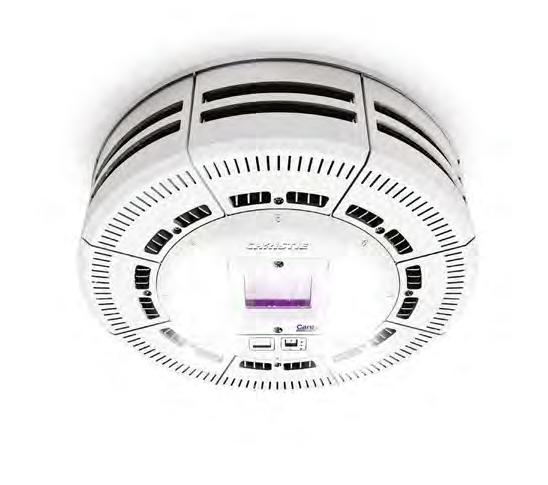
a 5.6–44° zoom capable of projecting well-defined mid-air beams, as well as wide and even wash coverage. Driven by 19 independently controlled 60W RGBW LEDs, the Proteus Rayzor 1960 provides a powerful beam (over 17,000 lumens) that stands out on any stage. The fixture’s oversized front lenses create a large surface enhanced by Elation’s SparkLED technology for an additional layer of effects.
www.elationlighting.com

HAS COME A LONG WAY since the Turing Machine proposal in 1936 – actually a mathematical proposal, not a real machine. But it proved that machines could fill in logical gaps in processing without human intervention, and that is precisely what makes AI so useful in AV. The more we can save labour, time and cost when setting up audiovisual connections of any kind, the more the CFOs like it. Equally happy are the integrators, who can leave things to their own devices, quite literally, while moving onto something else. So, how is AI being heralded in AV right now? It’s clearly bringing something to the party and appears to be providing applications with one kind of benefit or another. Take, for example, Williams AV’s Caption Assist, which promises real-time transcription of up to 73 languages and dialects. “Captioning” is a transcription of the speech in the soundtrack that appears on the screen; familiar in film and television but with applications in any AV context where language support is needed and there is a screen available to display it. In computer-based systems, the software can convert the speech into text in real time, even translating into different languages if required.
Caption Assist uses AI to caption live video feeds. The audio is taken from a microphone or line source and processed in the cloud, the machine having “learned” many different languages for translation as well as transcription. “The educational benefits of open captioning,” according to Williams AV, “make Caption Assist a great fit for people who are visual learners, learning a new language or in an environment that isn’t suitable for sound reinforcement. Caption Assist is also an alternative solution for assistive listening needs and caters to people in the deaf community who don’t know sign language.”
A different product, Convey Video, translates up to 109 languages and 28 dialects into subtitles as you watch. But other manufacturers are using AI to improve sound quality in a variety of applications, with conferencing at the forefront of innovations designed to increase clarity, understanding and interpretation.
Danish headset and earpiece manufacturer EPOS has products that separate human voices from extraneous sounds using the company’s trademarked EPOS AI. The company’s latest headset, the Adapt 660, claims to be the world’s first UC-compatible headset with “machine learning” – namely, an enhanced voice pickup that has “learned” the difference between the human voice and the kinds of ambient sounds that usually accompany dialogue. It adds this to the more established technology of active noise cancellation, so building up a set of features with obvious benefits.
Biamp has its own solution along these lines, called Launch. This is described as “an automated one button solution to better room audio” and is already enjoyed by the Parlé VBC 2500 videoconferencing bar. Biamp refers to “advanced signal processing intelligence” and all of the company’s products that support it can offer automatic room tuning and post-tuning reports – as well as integration with SageVue, Biamp’s monitoring and management platform. Launch uses a deep machine learning algorithm that can identify human speech and disregard “all forms of unwanted sound like keyboard tapping and paper shuffling”. The Parlé VBC 2500, in particular, has microphone clusters that track delegates around a room, having divided the room into zones for the optimal coverage of multiple voices. Biamp calls its AI “Biamp Audio Intelligence”, but the VBC 2500 adds a wide angle 4K ePTZ camera too, with a 12MP sensor enabling a 120° field of vision.

Going a step further into cross-brand collaboration, Shure’s recent optimisation of room setup with IntelliMix Room 4.0 includes a new integration with Crestron’s XiO Cloud management platform for device monitoring. Clearly, it’s a solution that maximises efficiency, speeds up planning and streamlines the functions of the technology, so how does AI achieve these goals? “Some AI is built on rules that encode human decision-making processes and some on machine learning – machines trained by data scientists,” explains Dan Law, Shure’s senior director of strategic software. “IntelliMix Room has both flavours. Some tasks are human; some are ‘superhuman’ – no human can remove noise from audio in real time.”
Adds Lauren Simmen, director of product marketing at Crestron: “We sometimes take chipsets that do this, but planning and testing is critical. If you want to build AI algorithms into a device, you have to make sure everything down the line is compatible. That’s why I believe AI will be driven at a proprietary level.”
Sam Kennedy, Crestron’s senior director, product marketing, sums up the importance of getting AI just right. “People’s voices are being heard, and people’s faces are being seen, leveraging our technology,” he says. “In fact, it’s part of how, in our space, we’re delivering the best experience to the user.”

“And the integrator,” adds Simmen. “The XiO-IntelliMix Room relationship is another side to that experience. The predictive maintenance possible means preventative health for the system, and the system can make changes without human interaction. Our integrators get the advantages at the back end too. They know that the rooms can heal themselves.”
www.crestron.com www.shure.com


The Adamson Fletcher Machine is an audio rendering processor offering incredibly simple operation with highly efficient spatialization tools, with hardware models offering 32, 64, or 128 inputs and outputs. To learn more about the Adamson Fletcher Machine visit our website at www.adamsonsystems.com
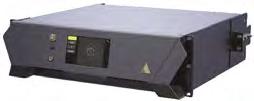
Don’t miss us at: ISE 2023 | Jan 31 - Feb 3 Booth 7F200









Think differently about how amplifiers should work: Explicitly designed for installation environments, LA7.16i is a multitasker with 16 output channels, each able to produce 1300w at 8 ohms.
Multi-Channel, Multi-Type, Multi-Time, Multi-Signal.
